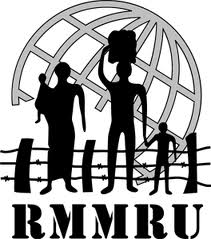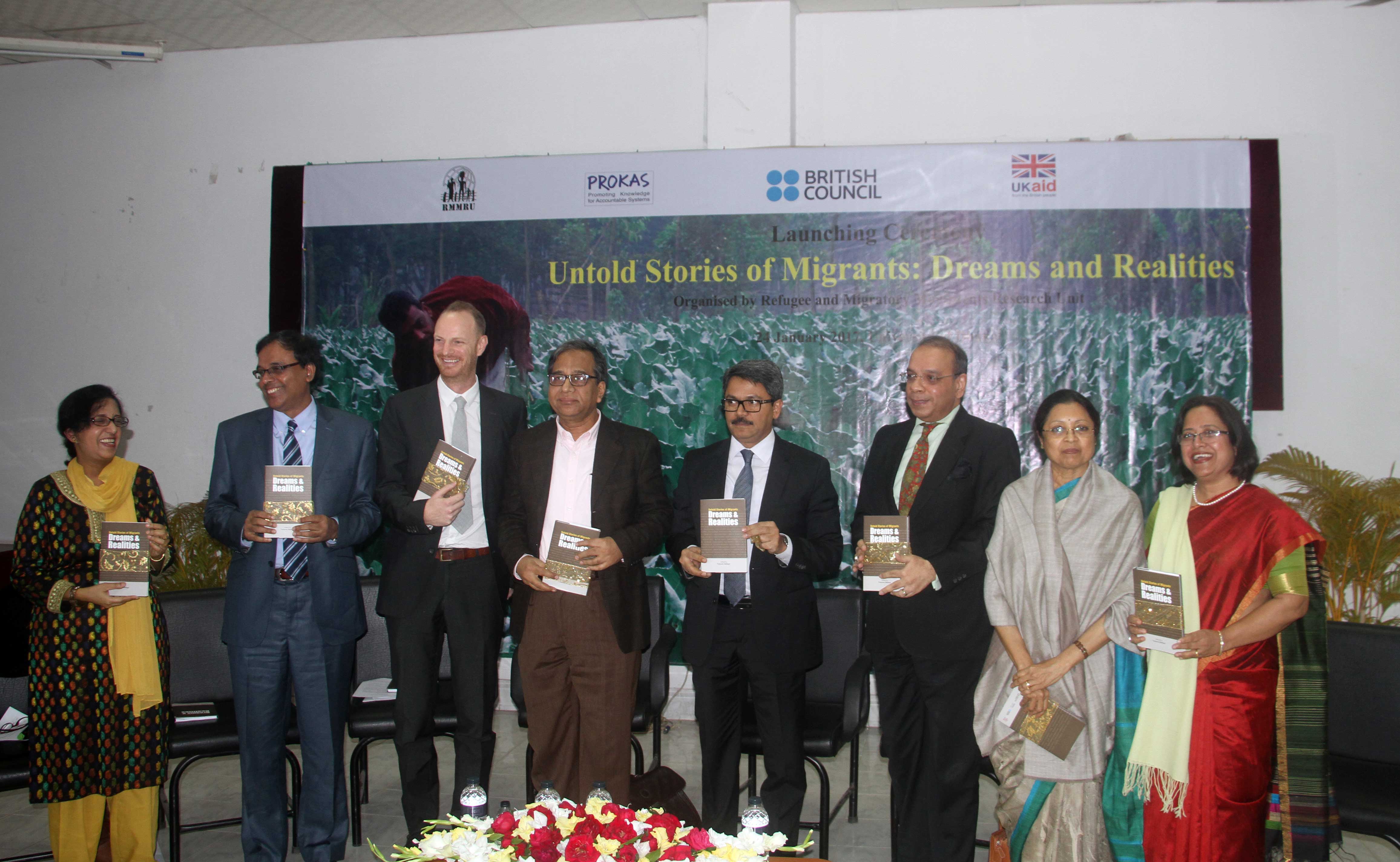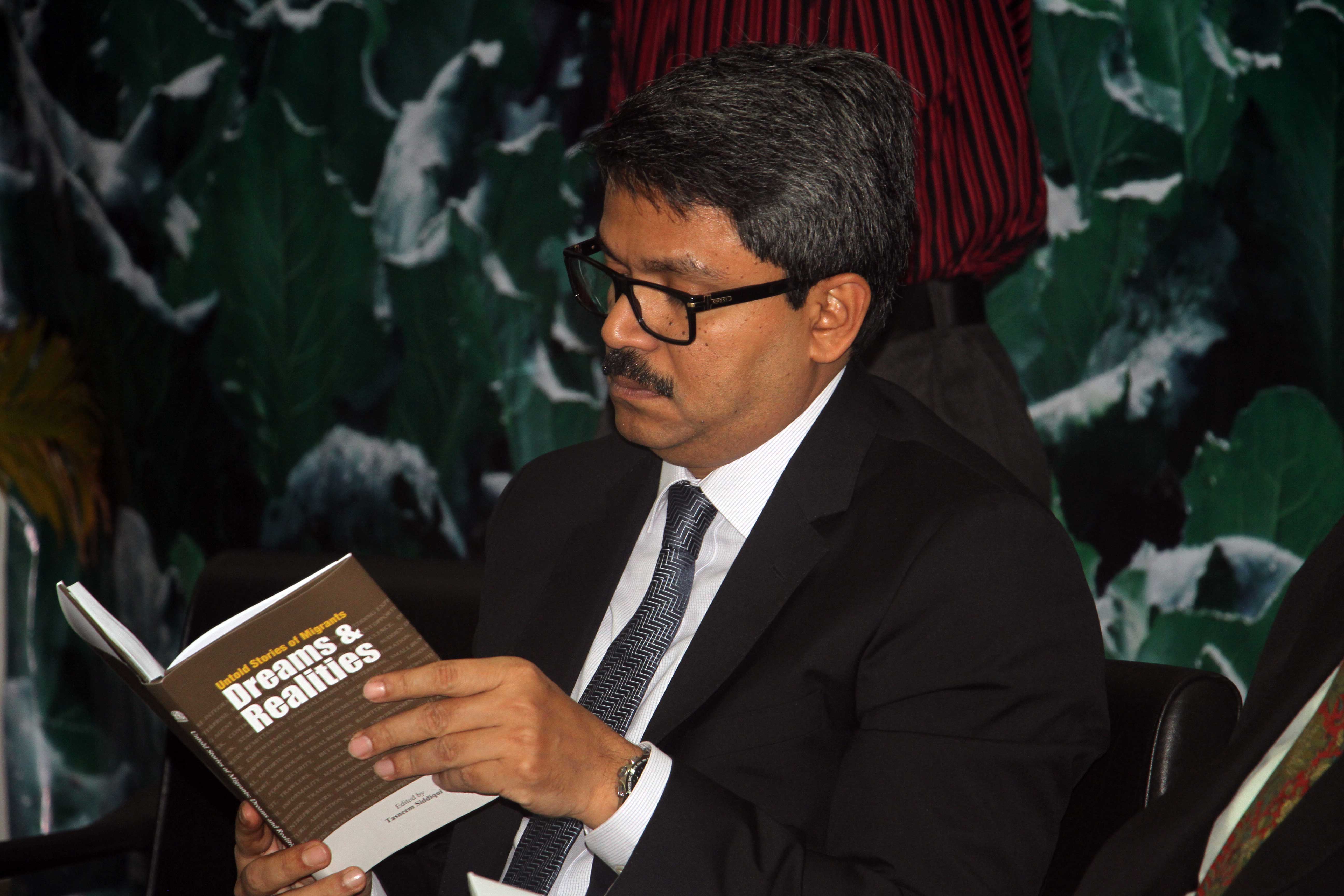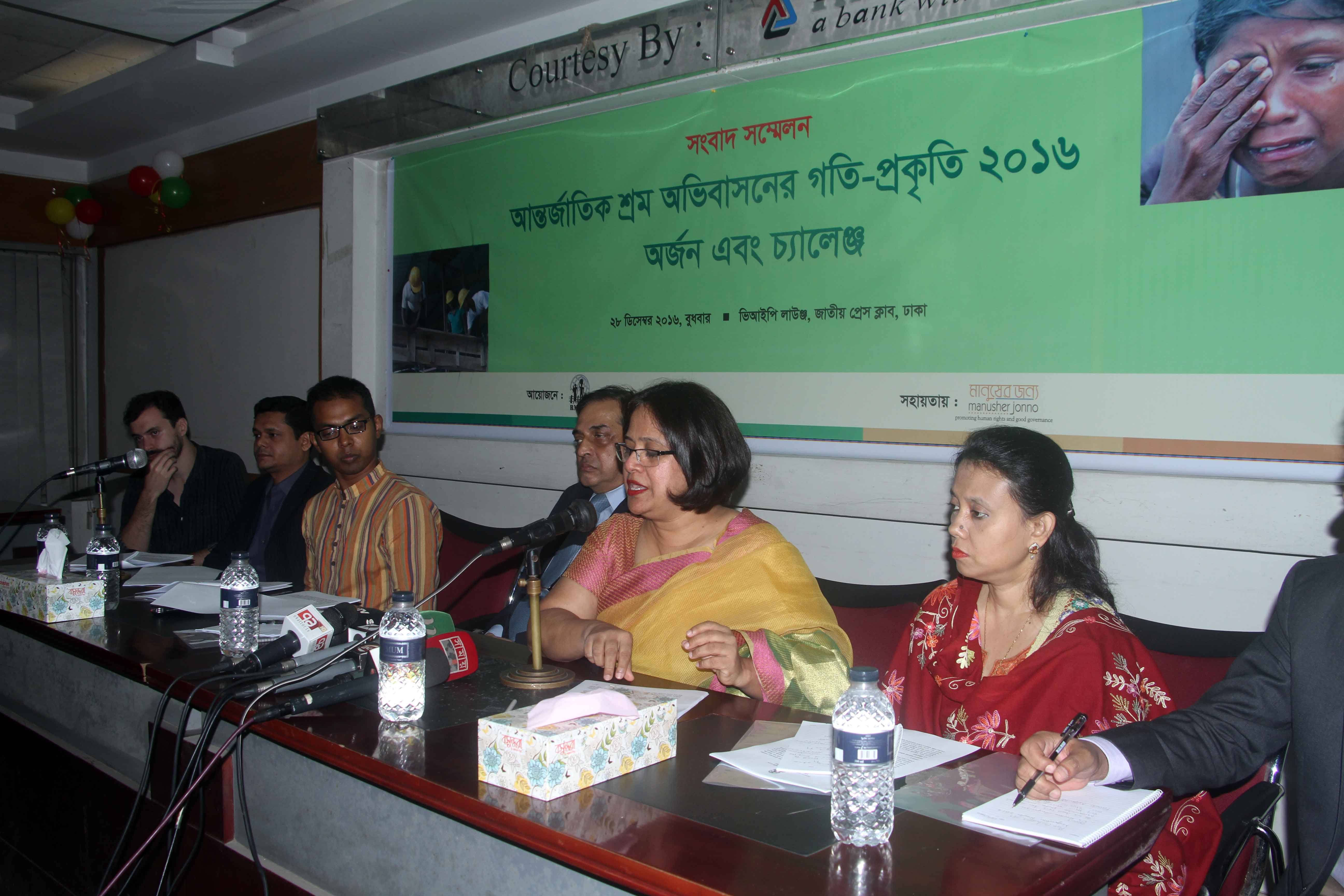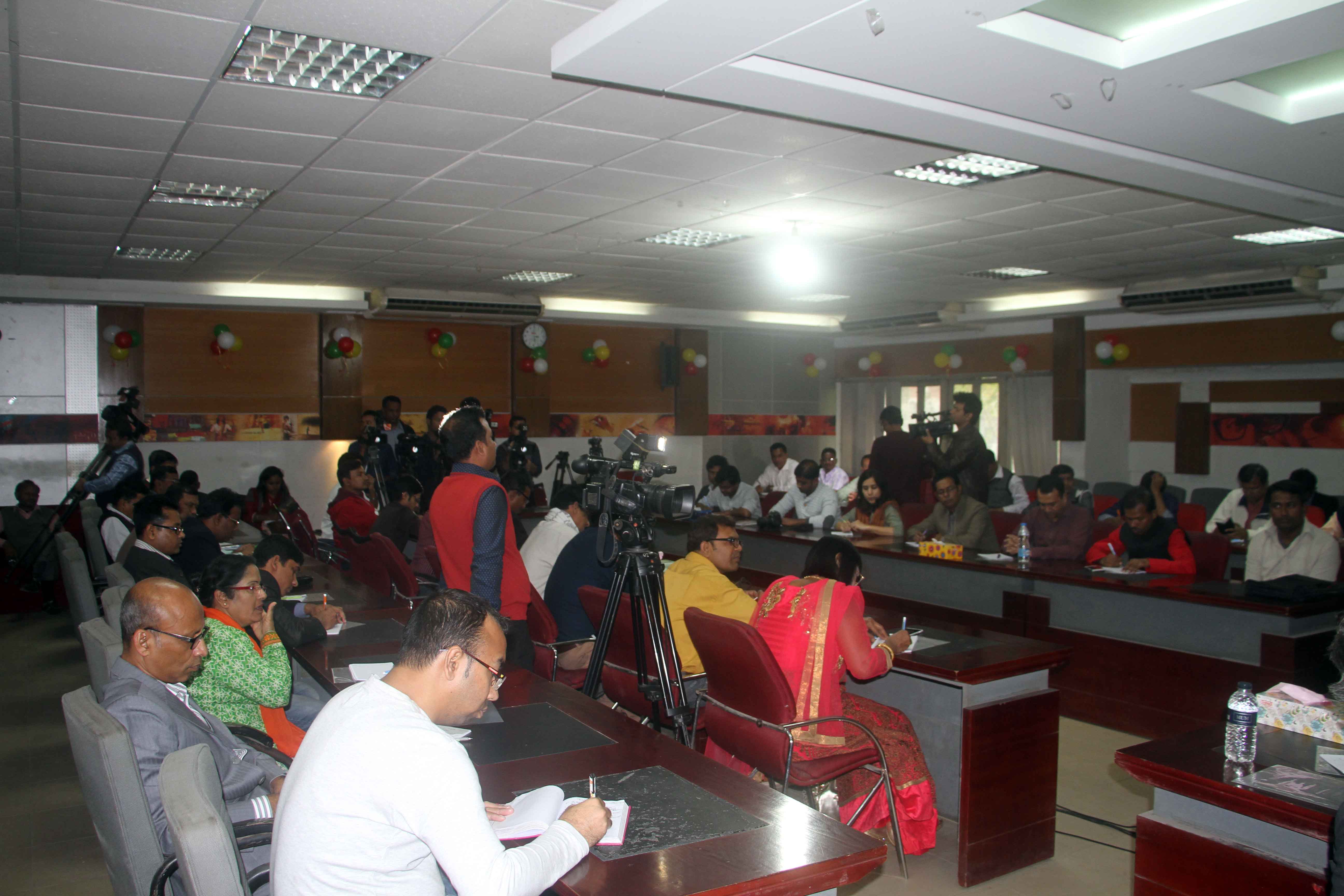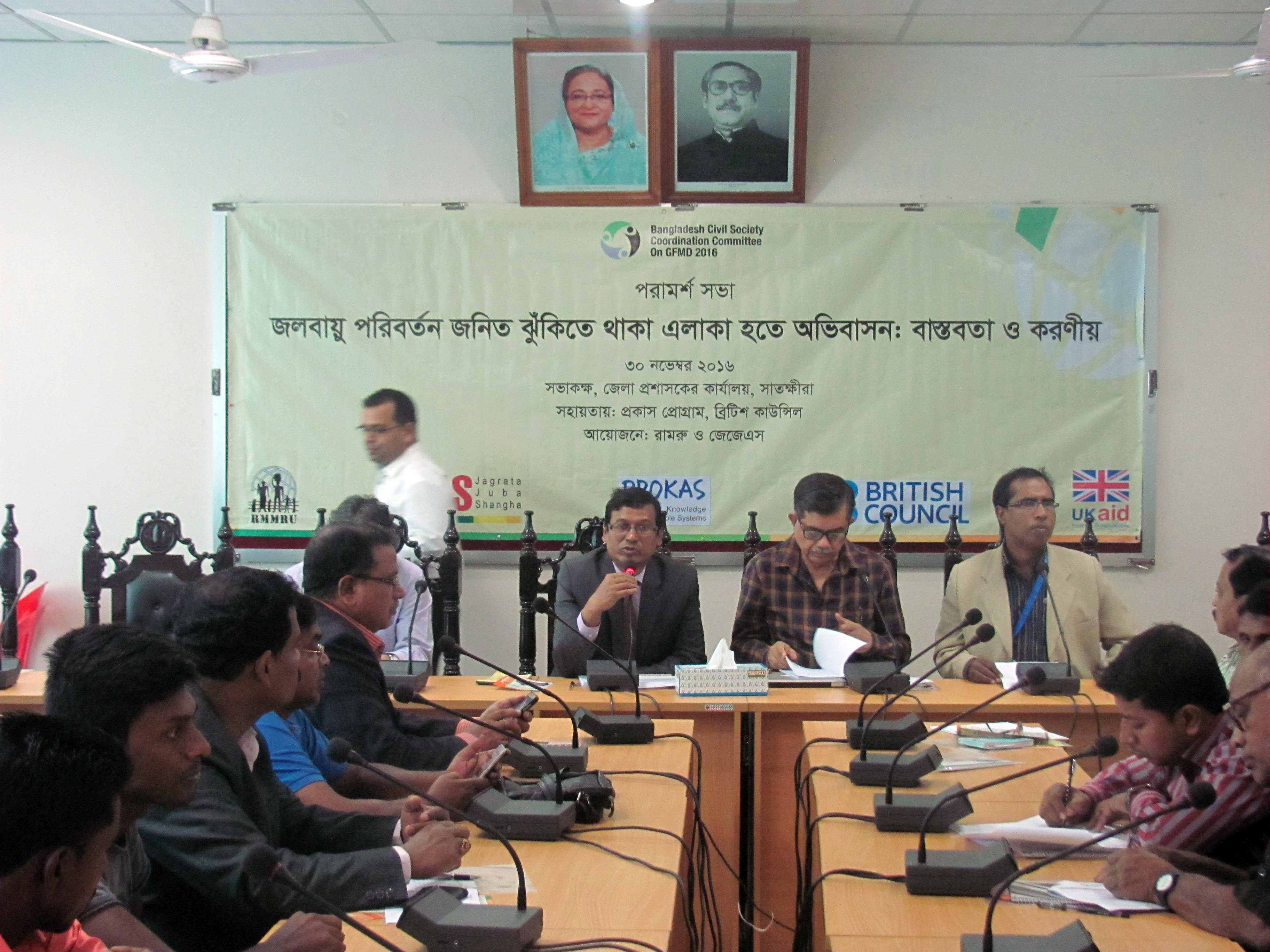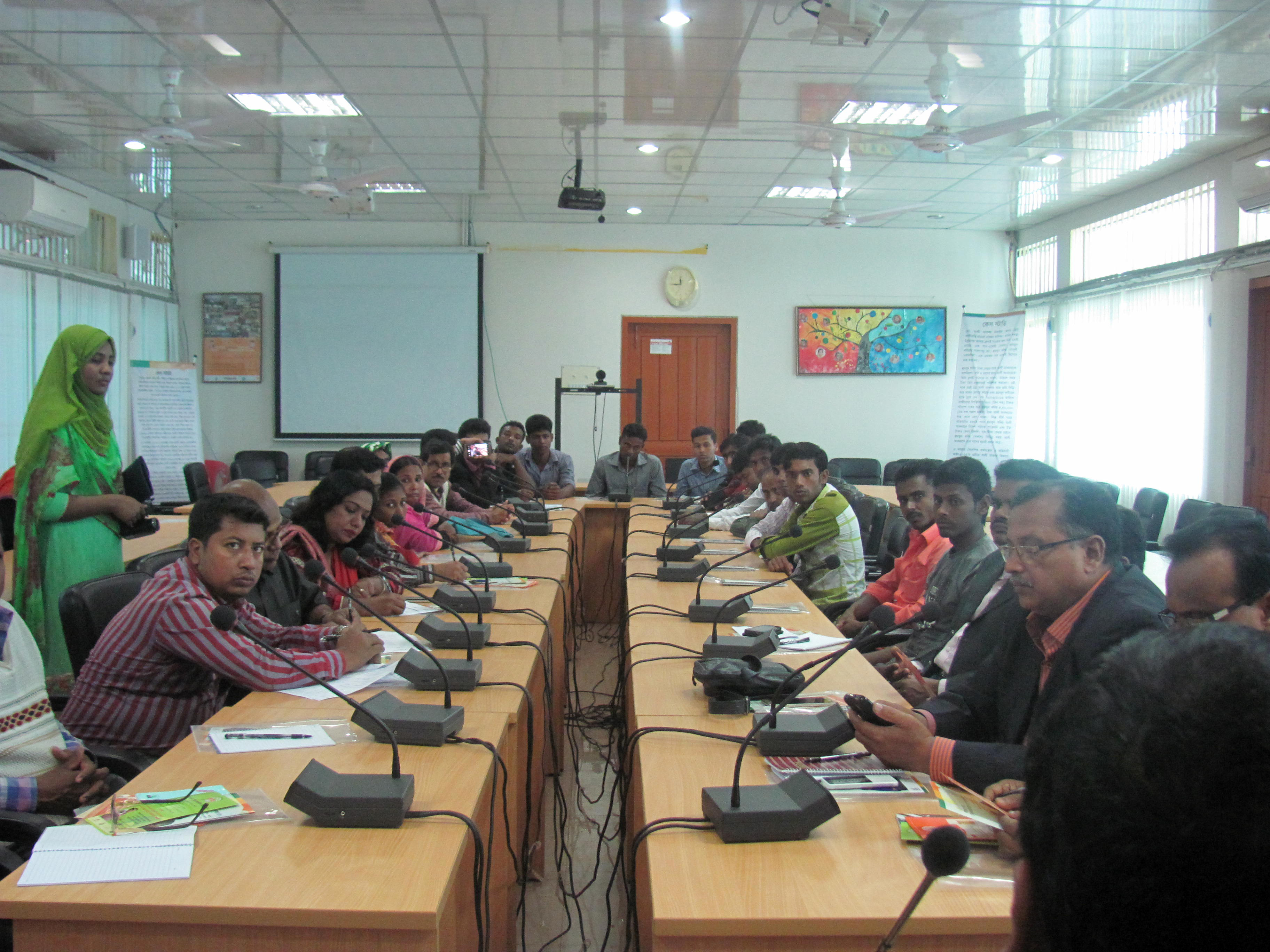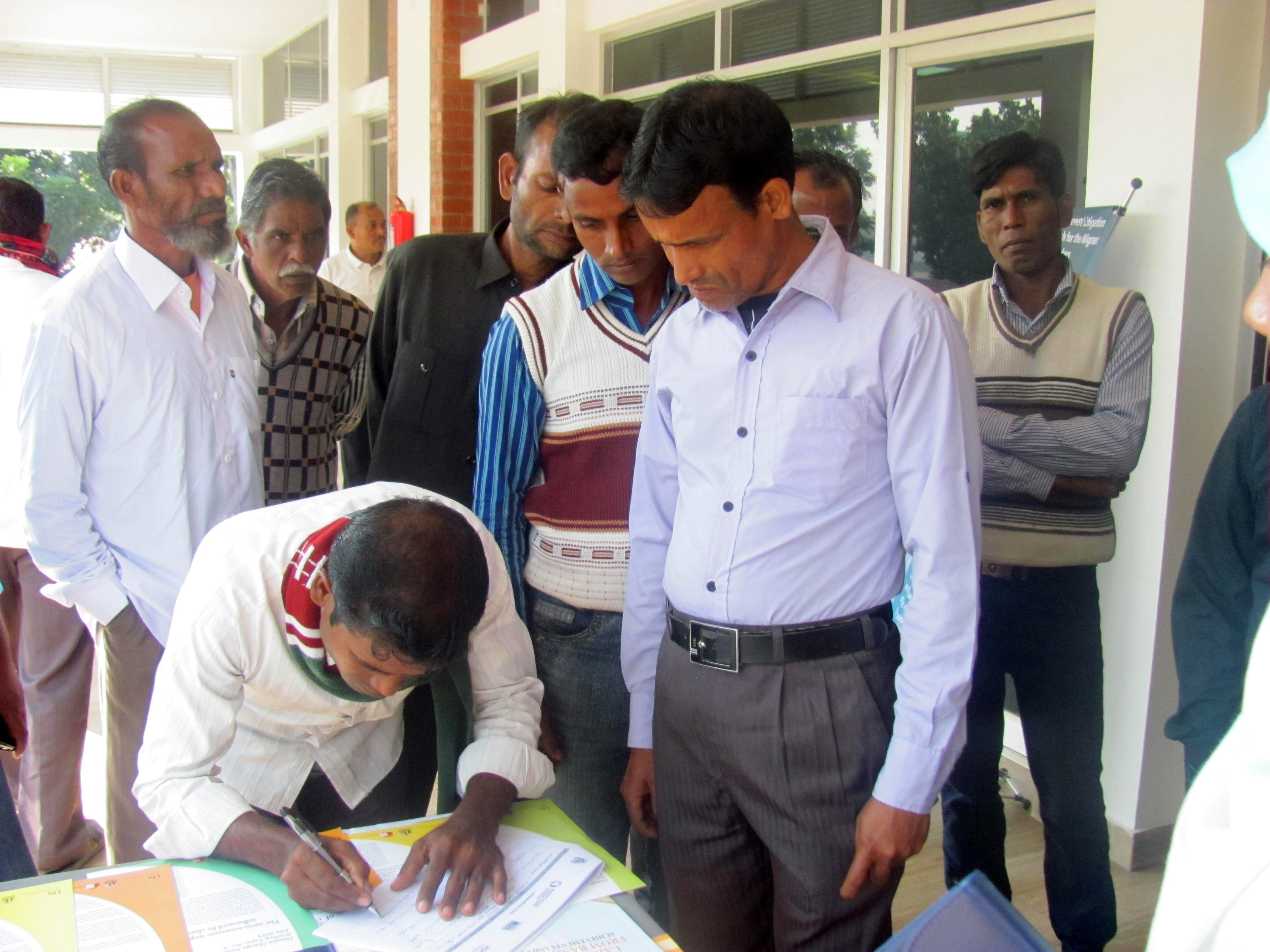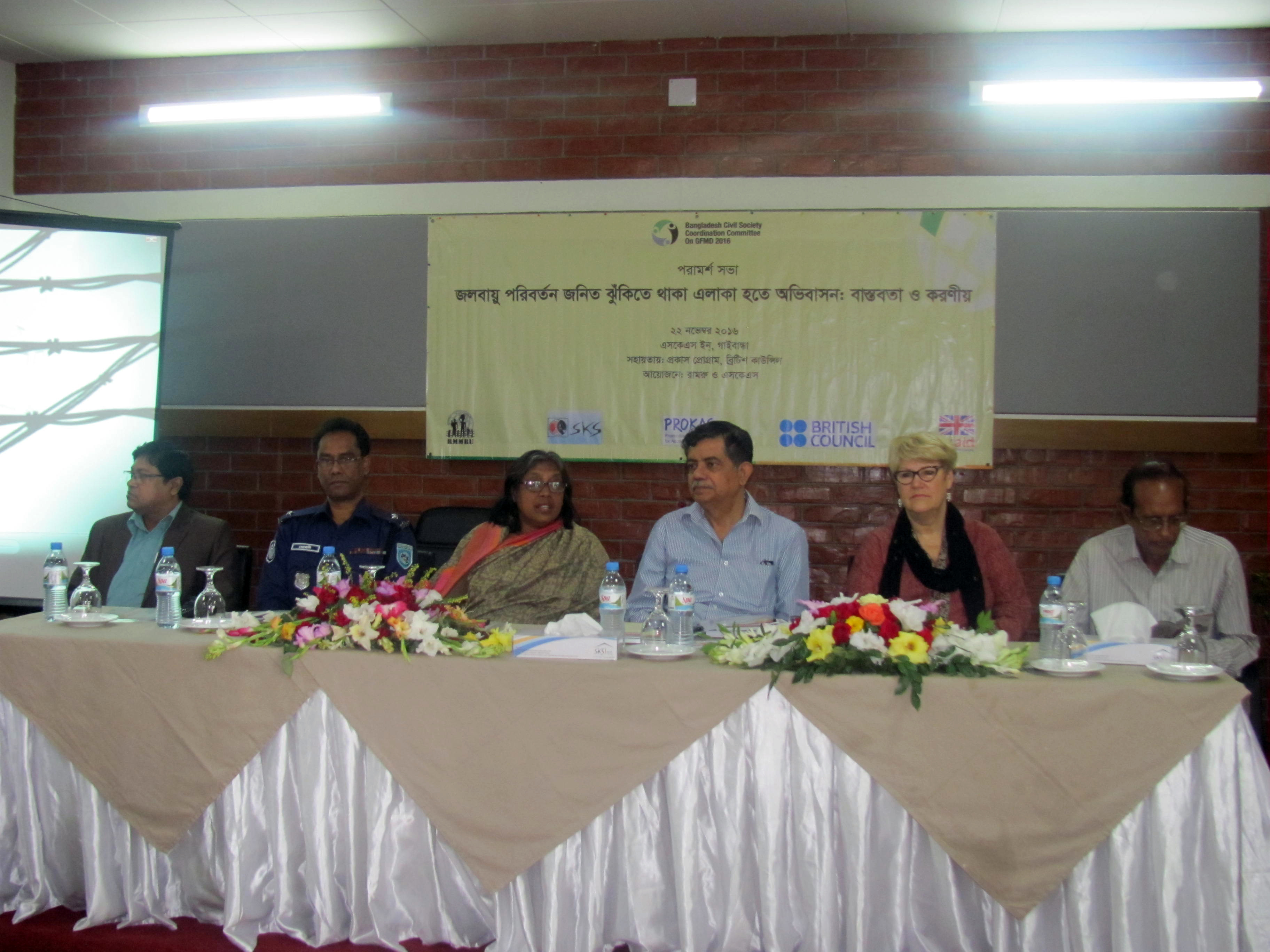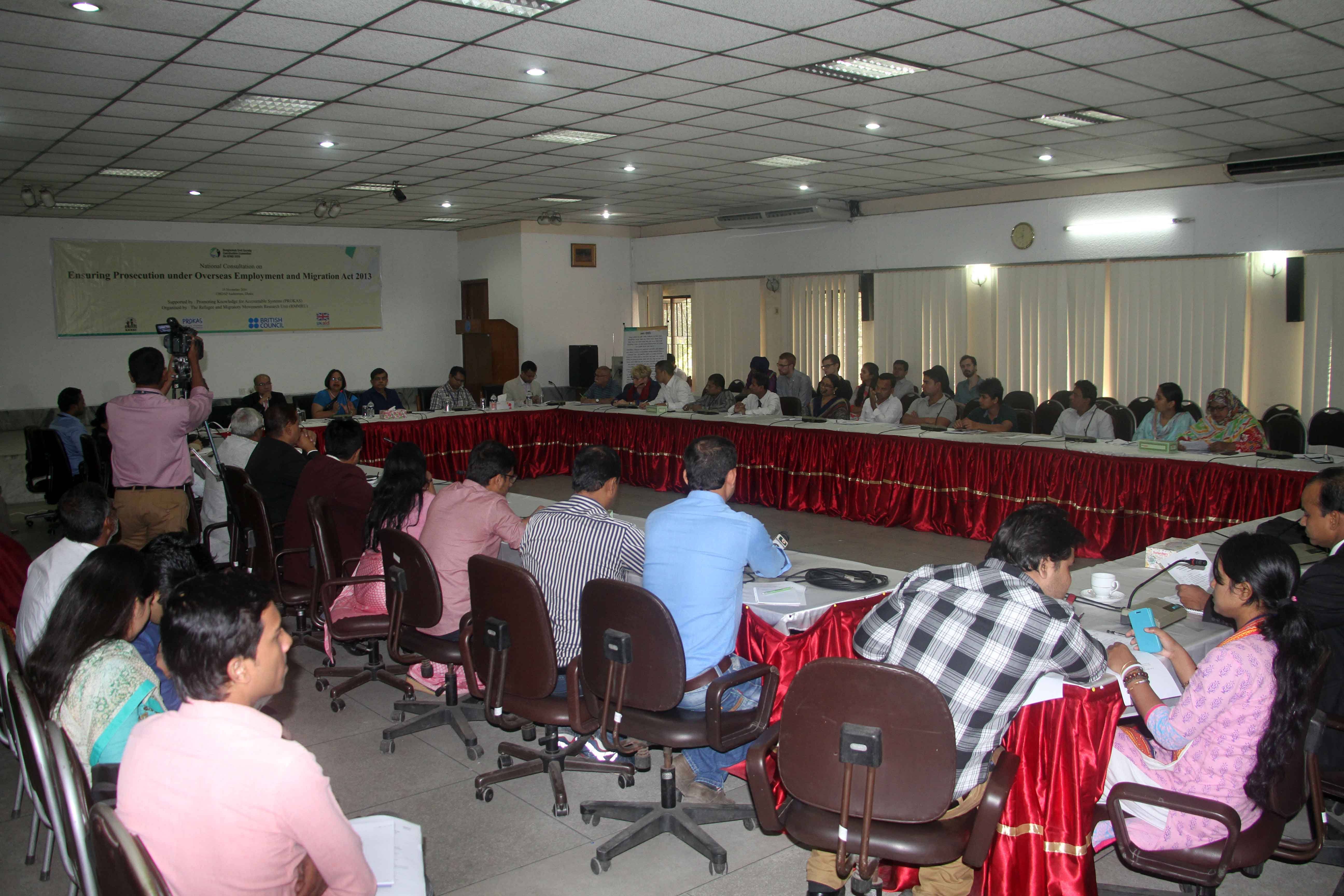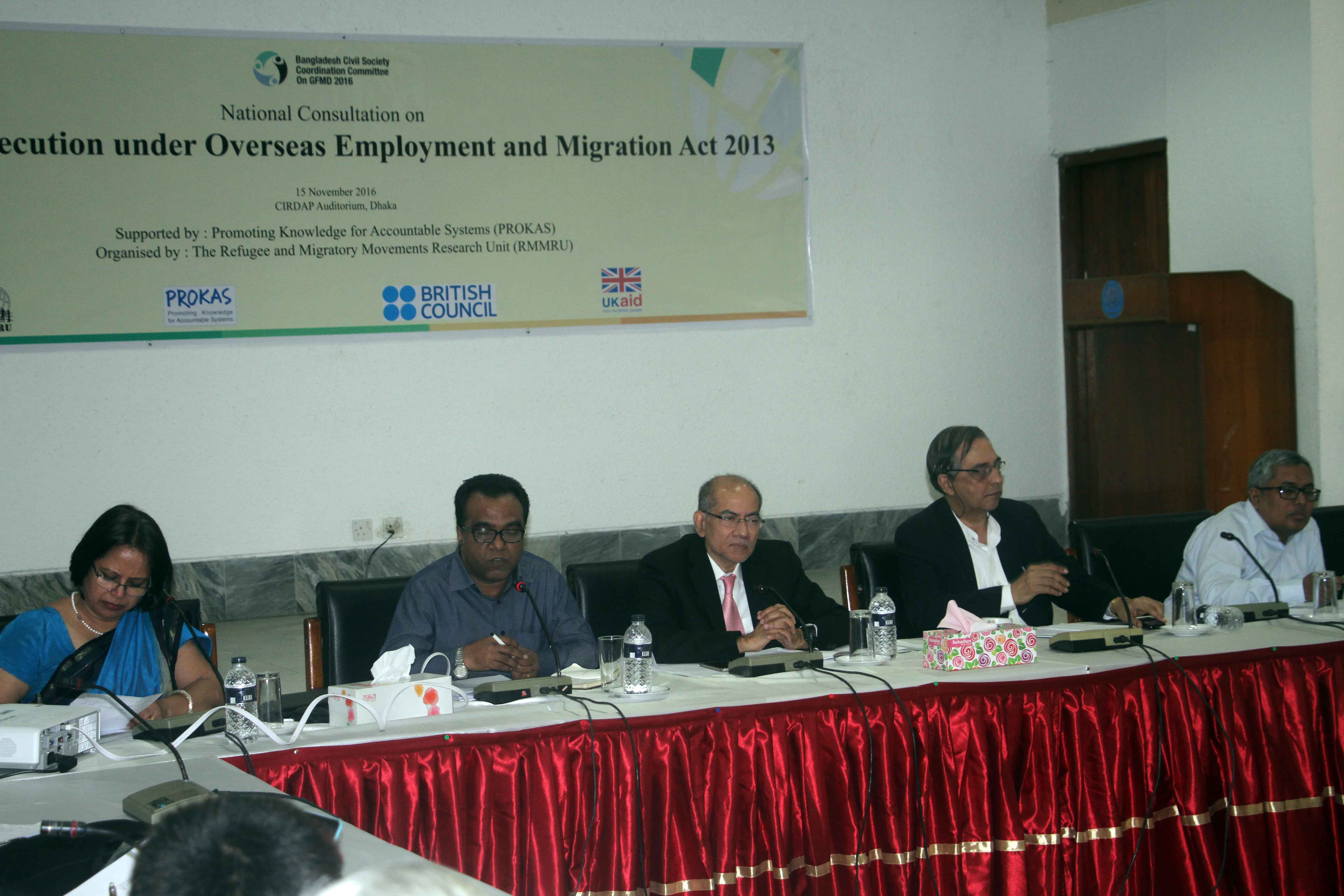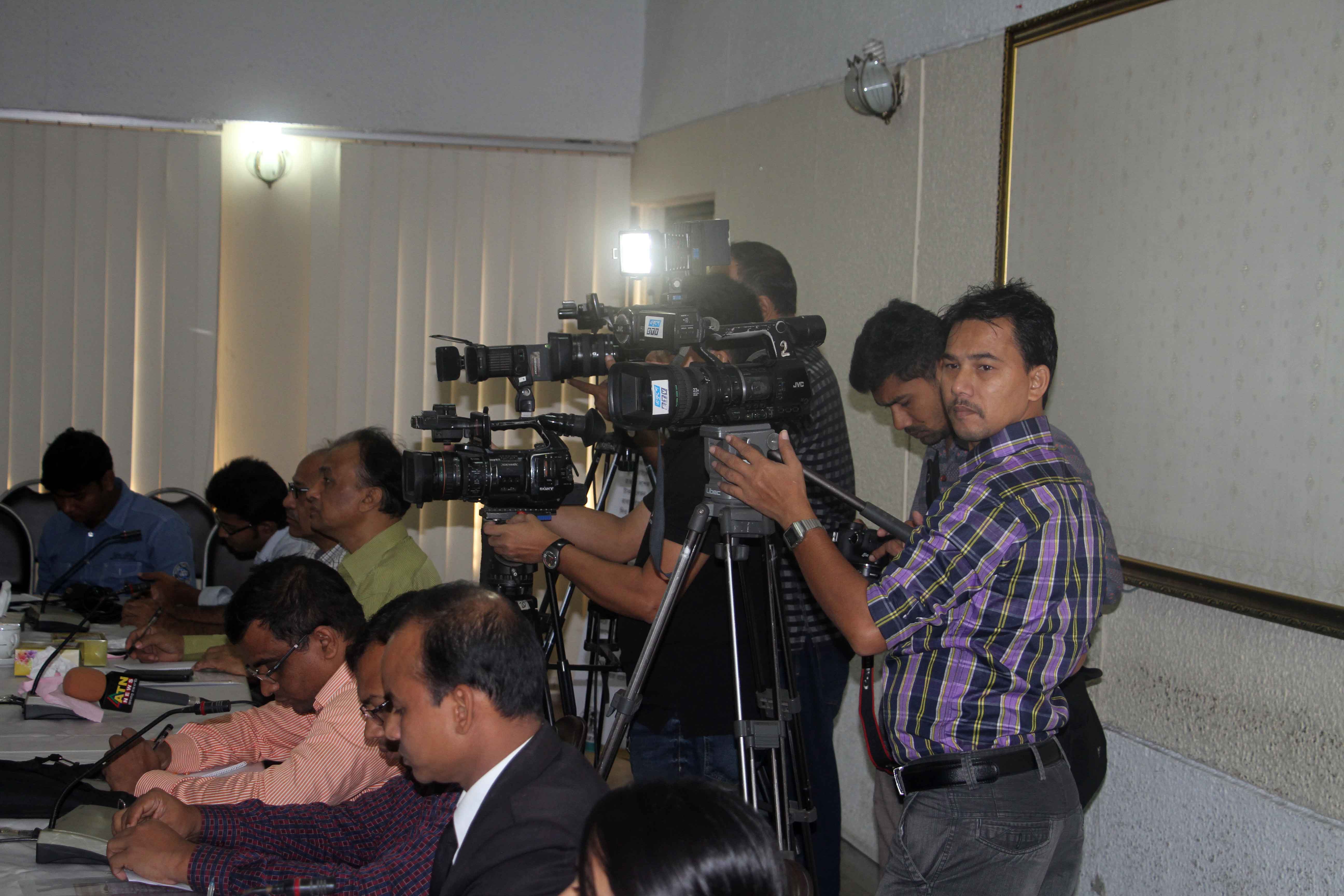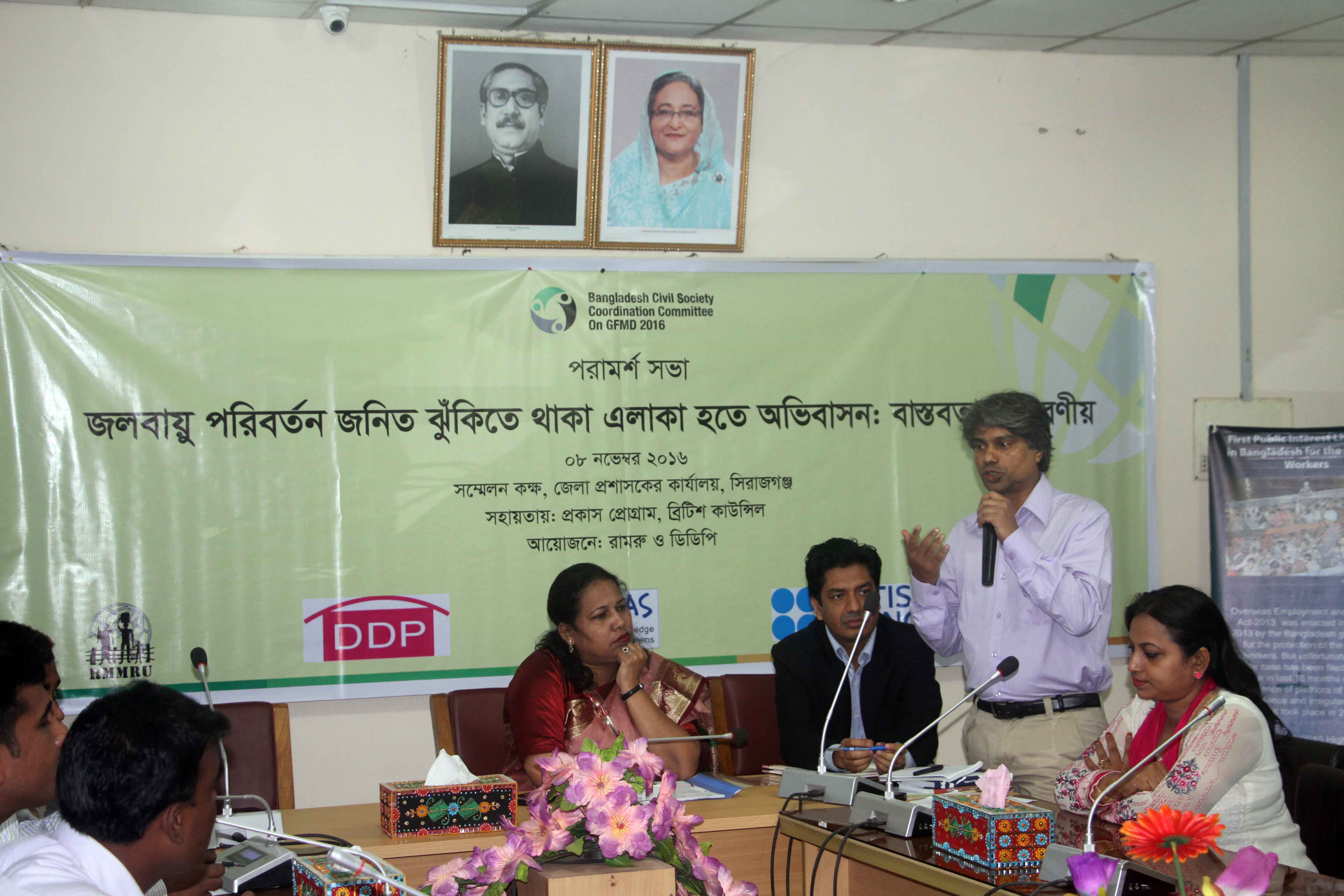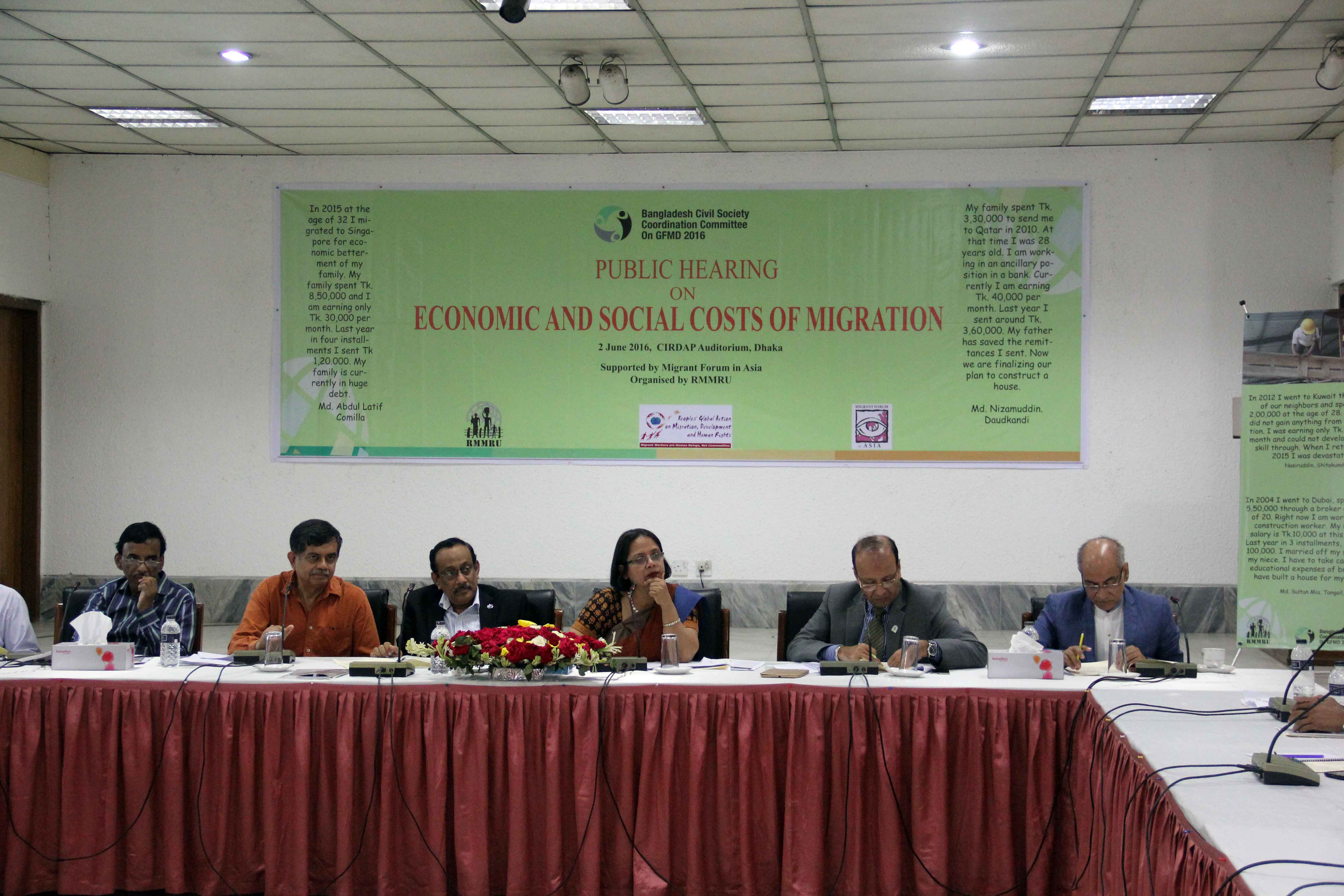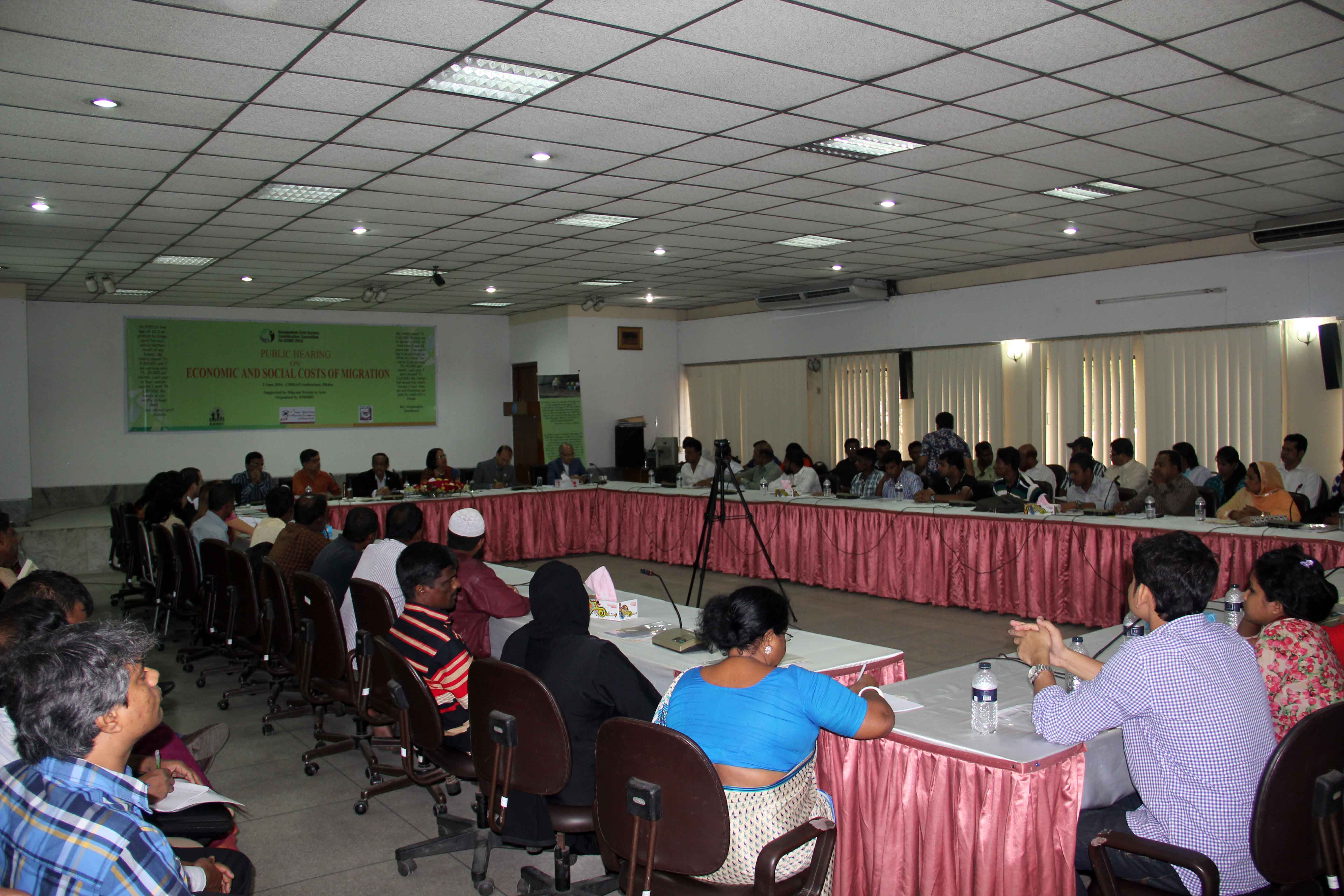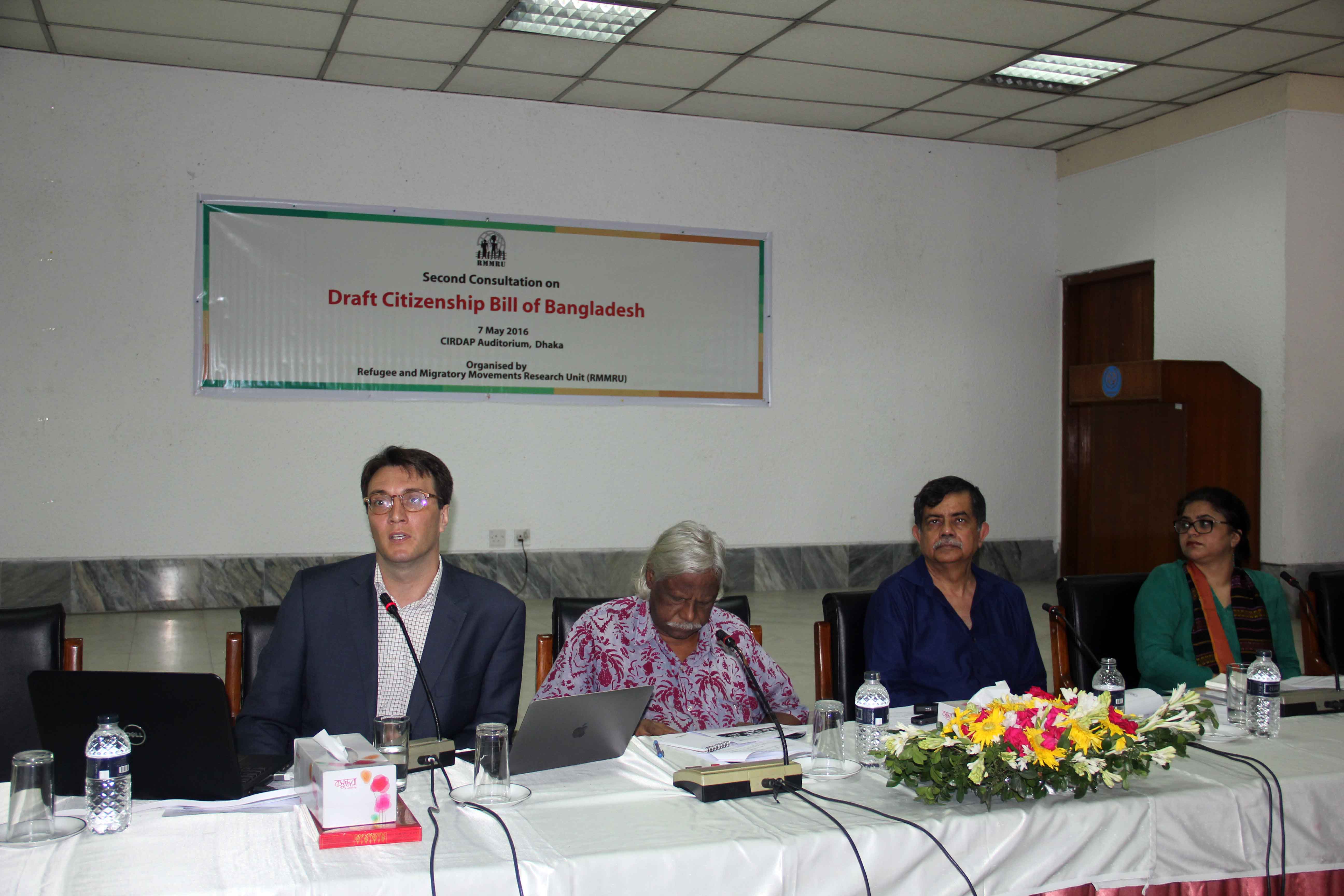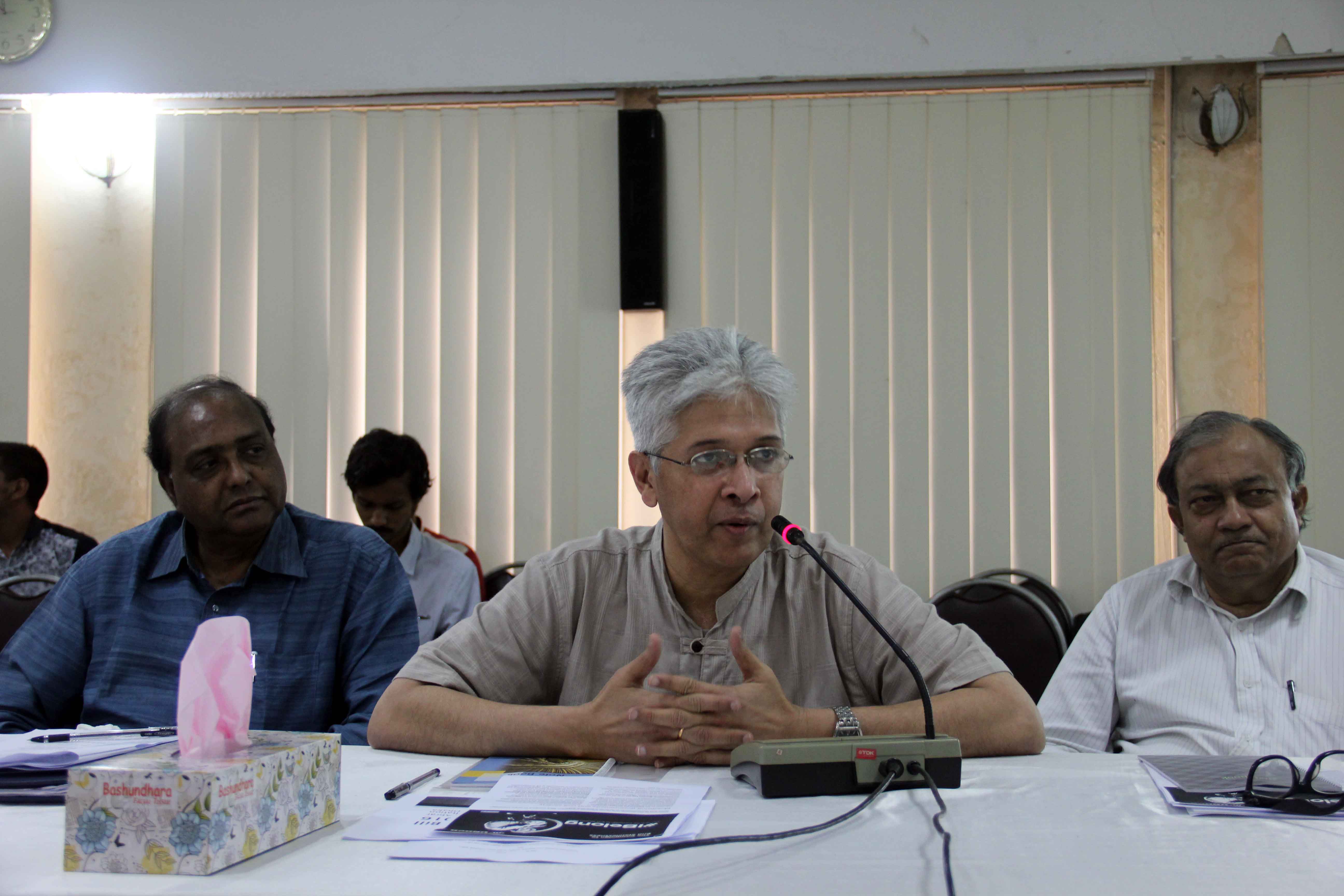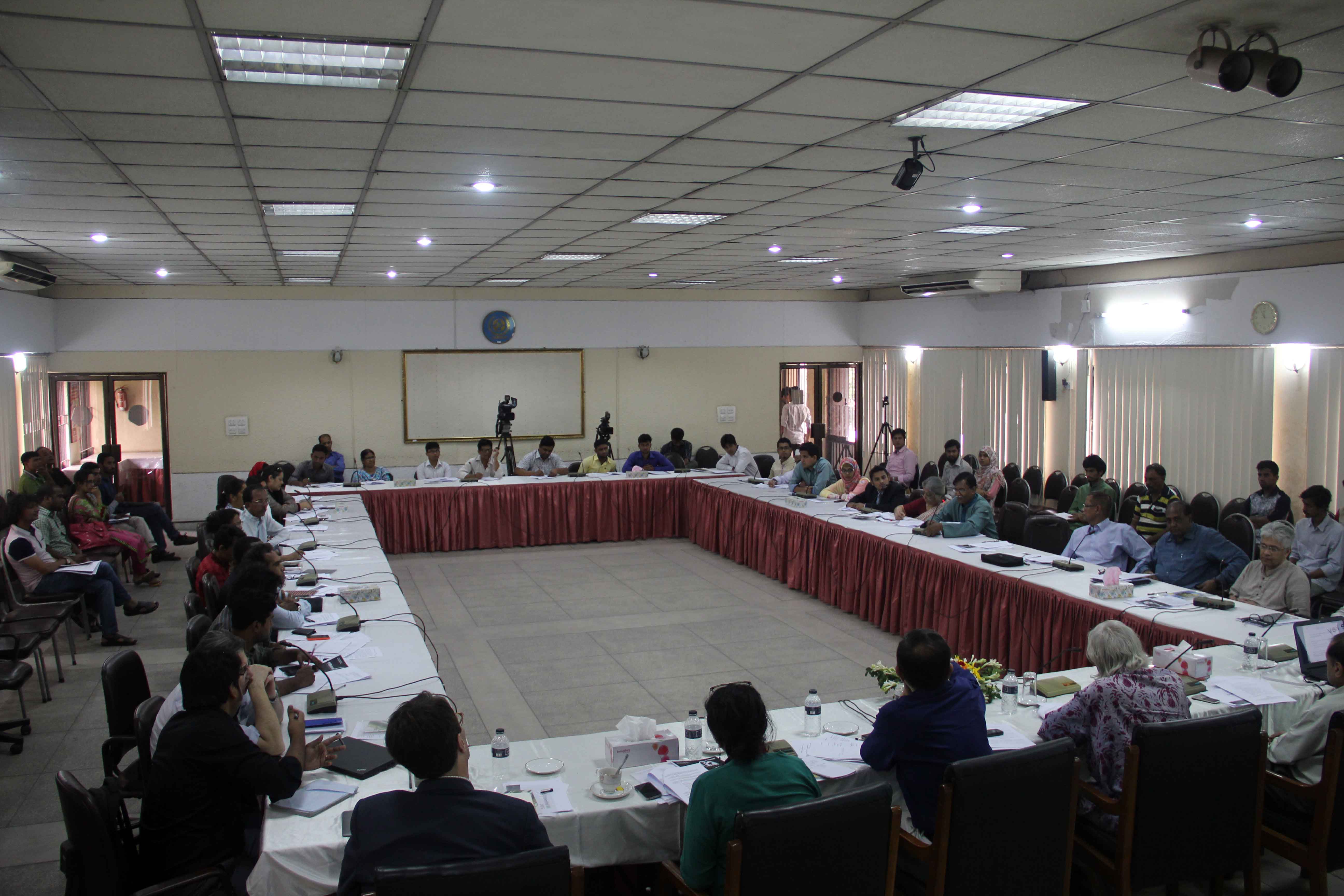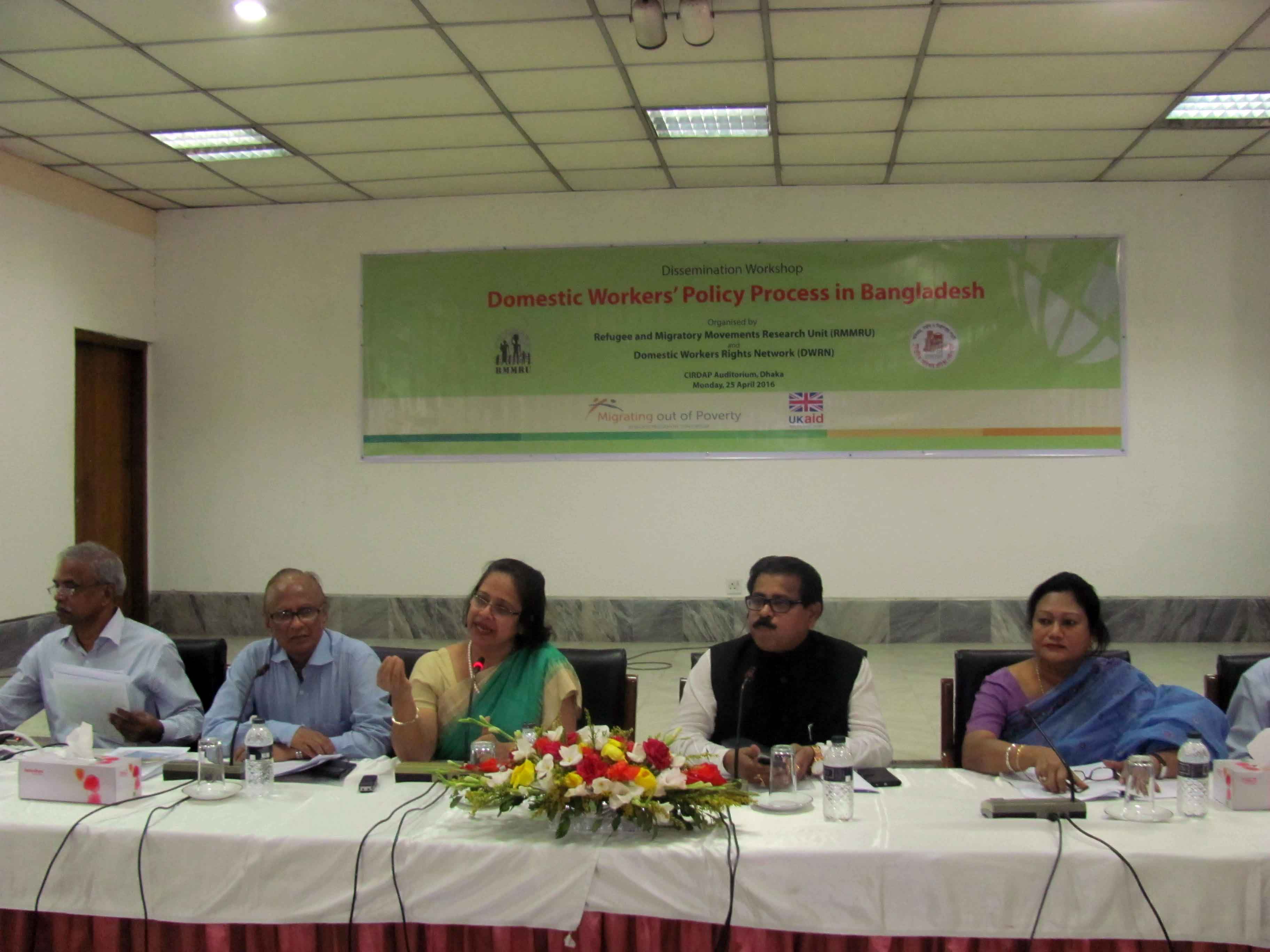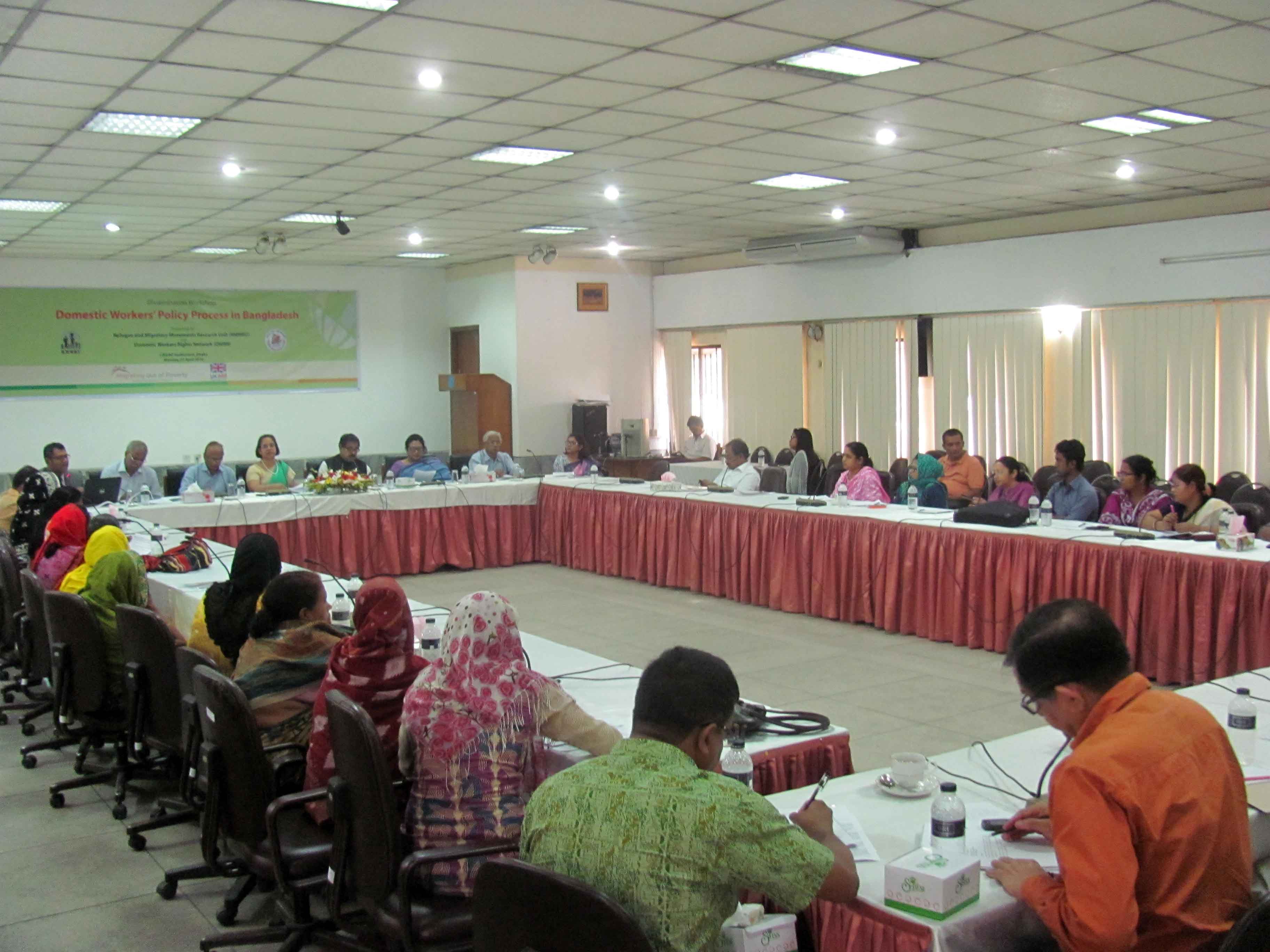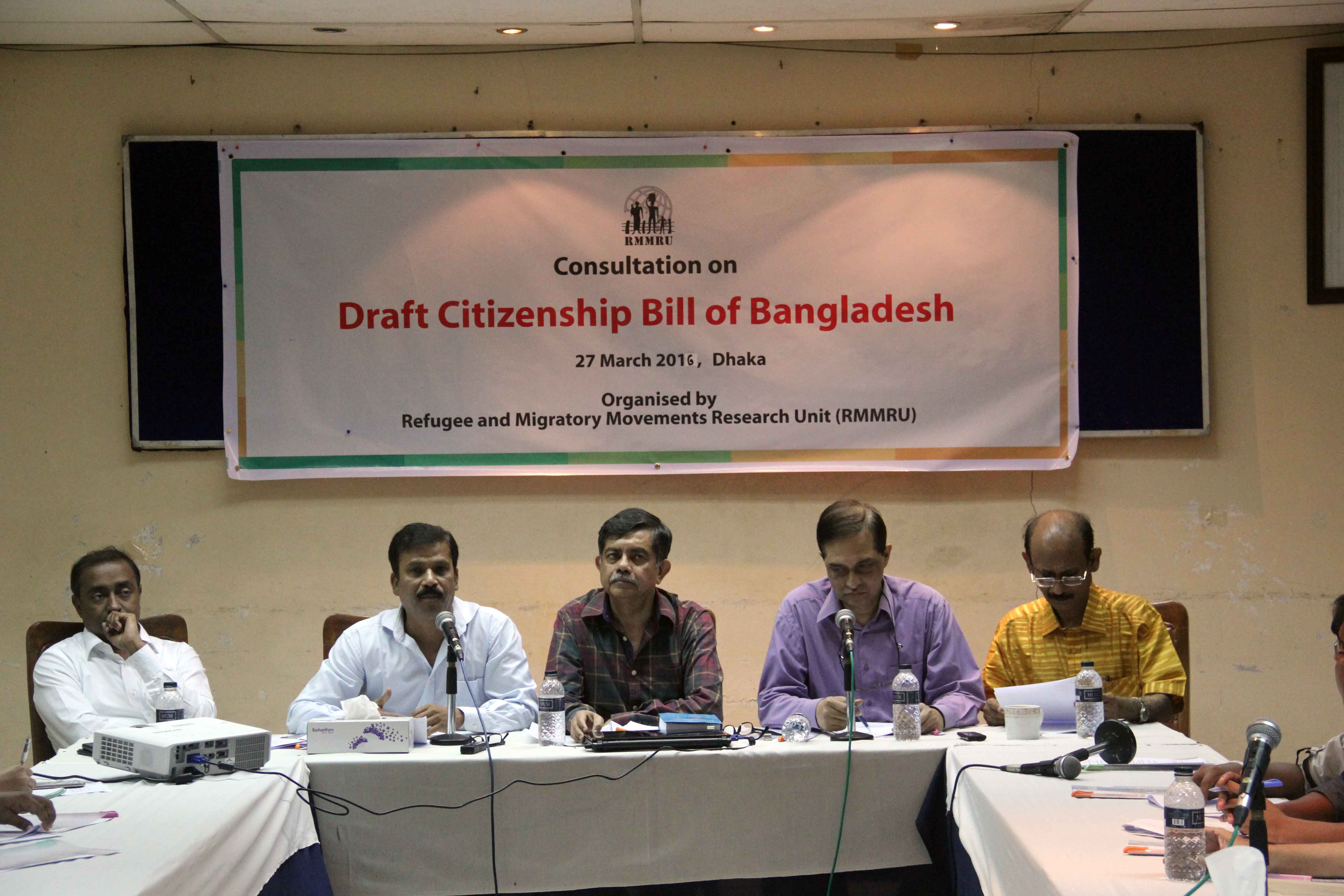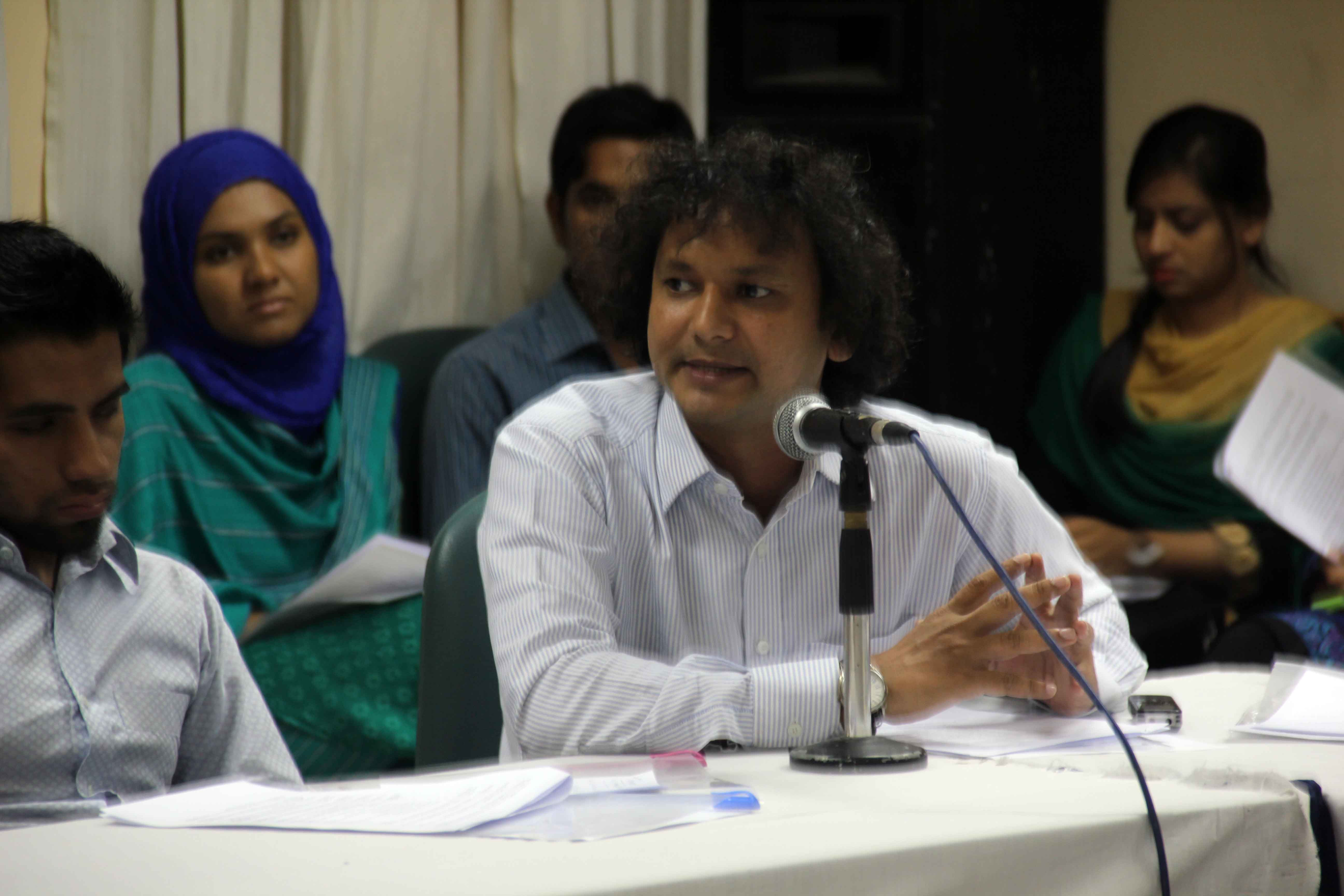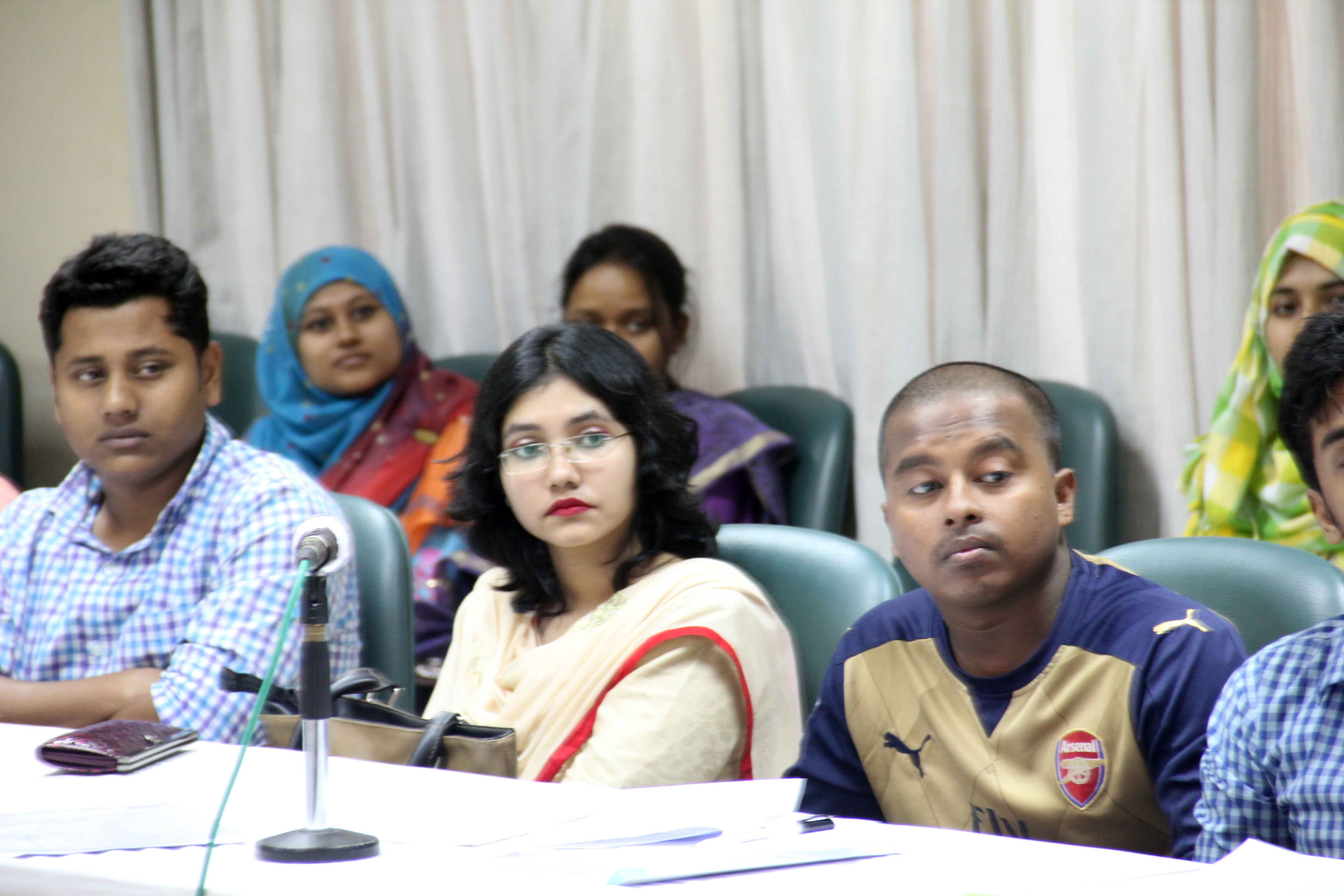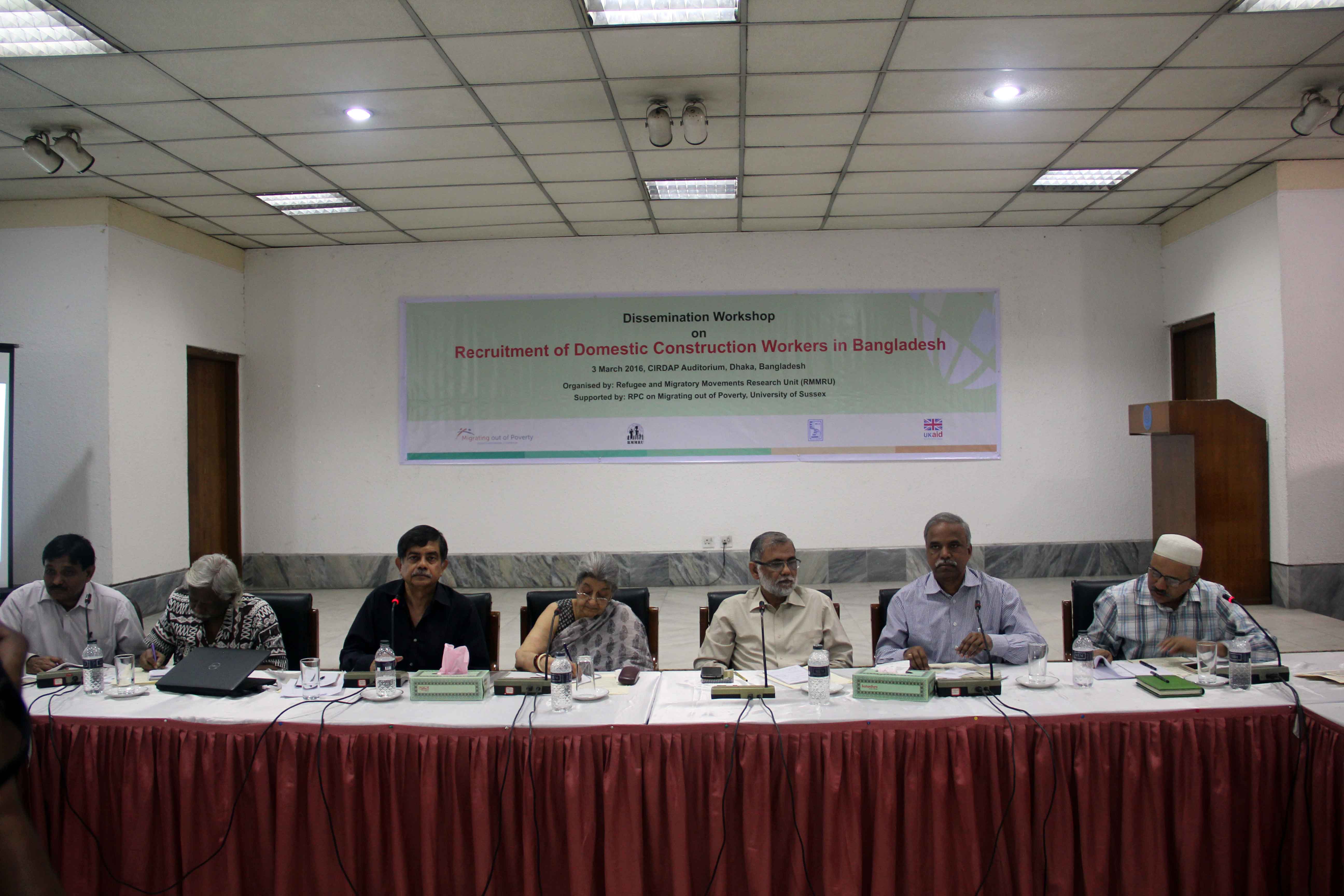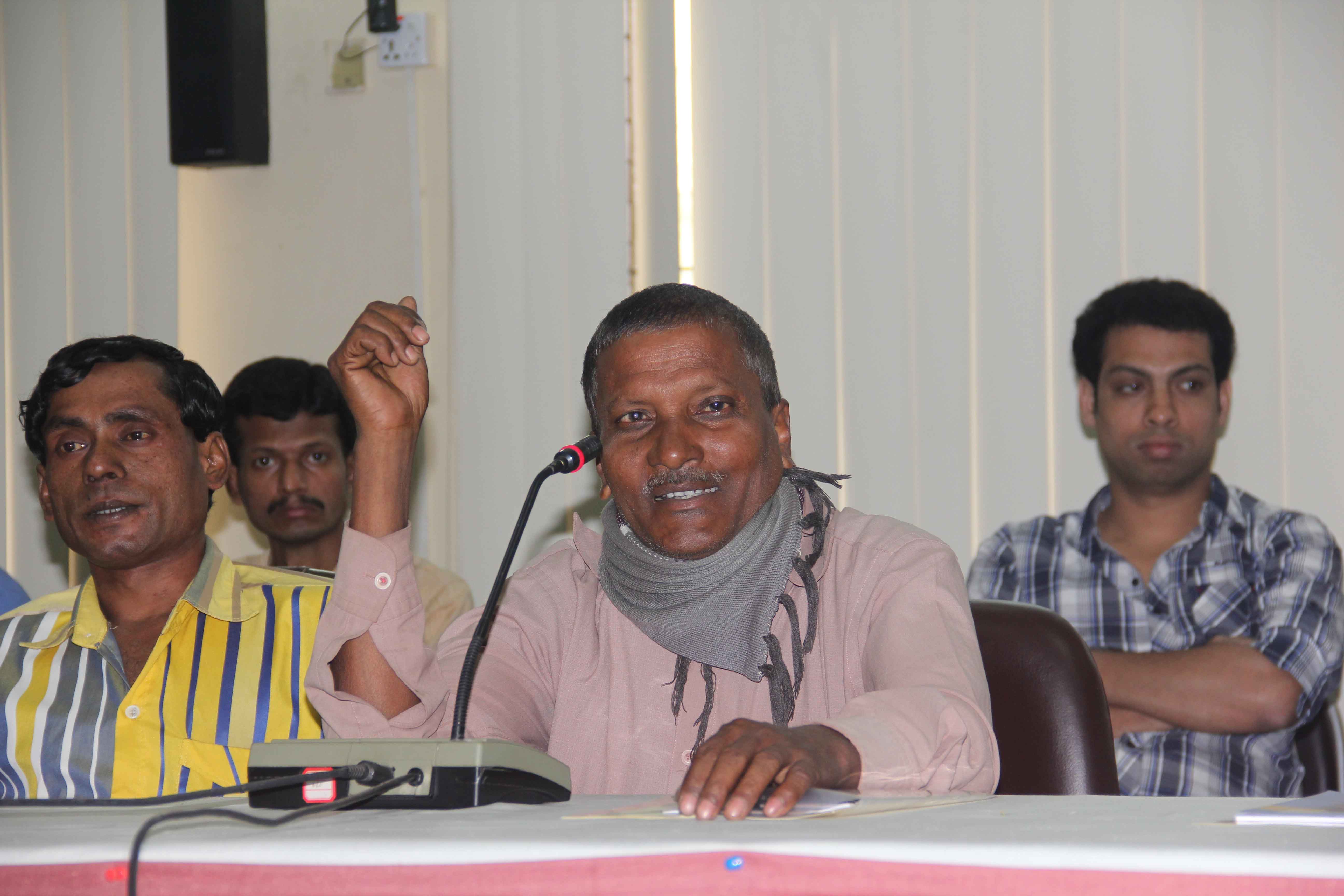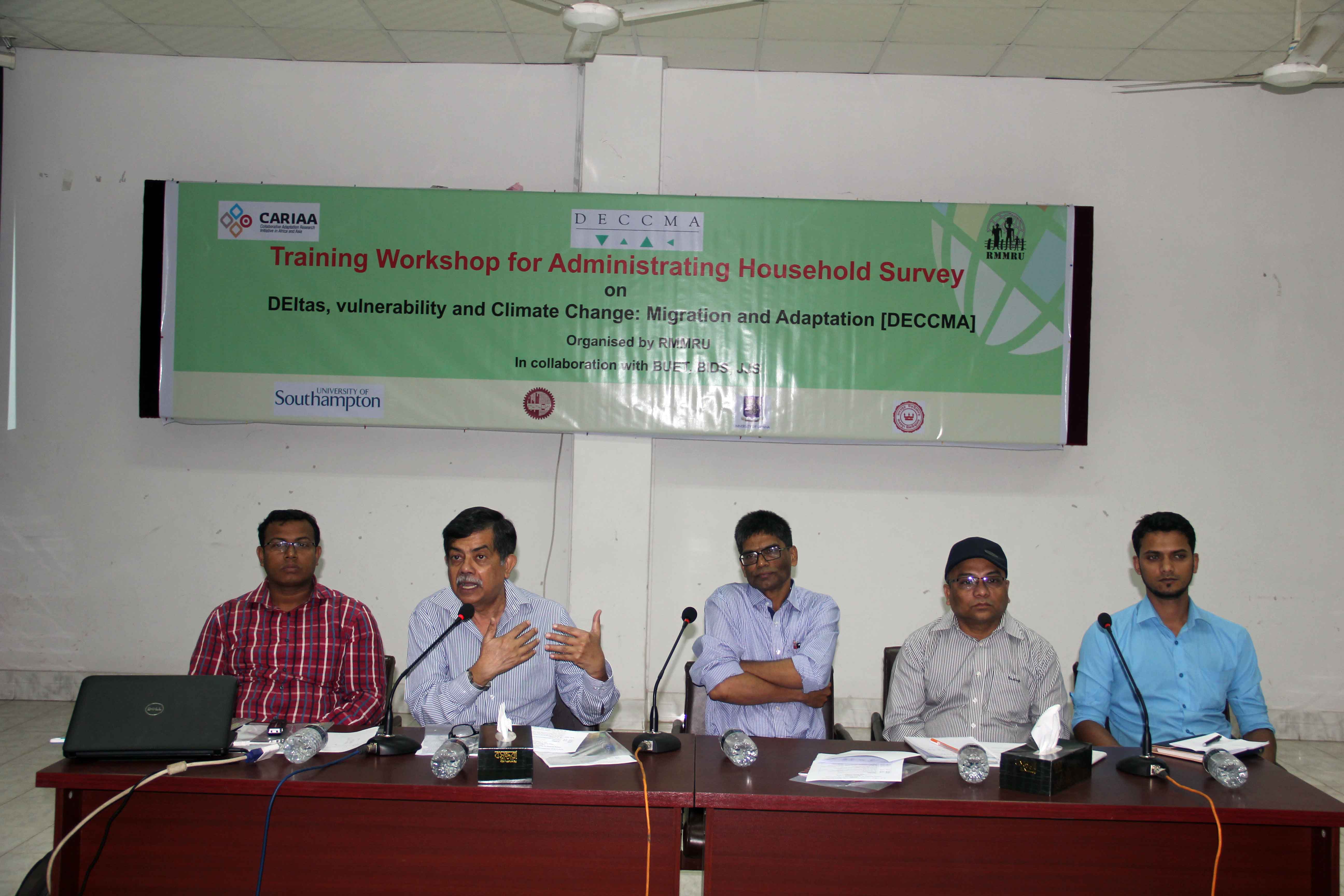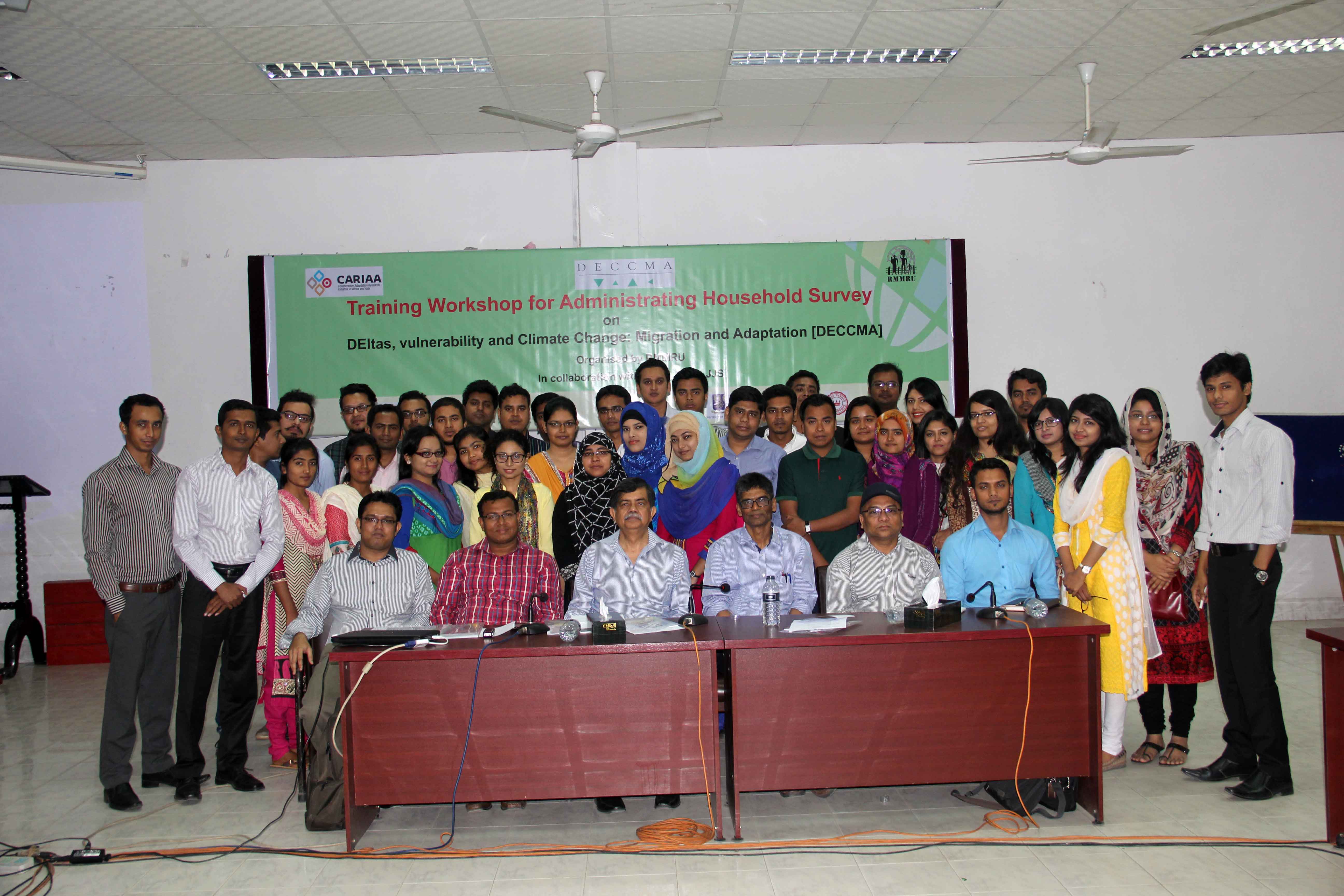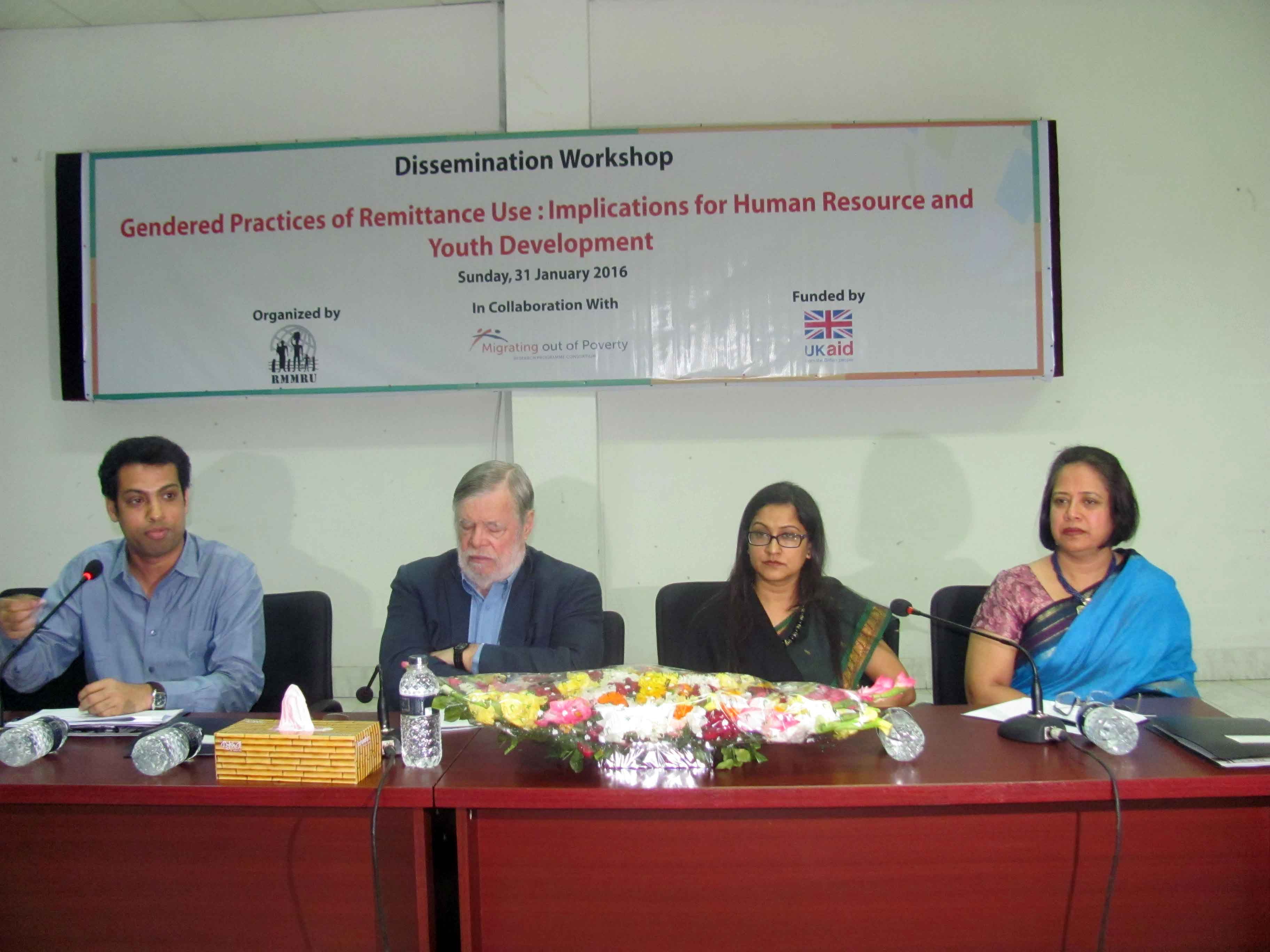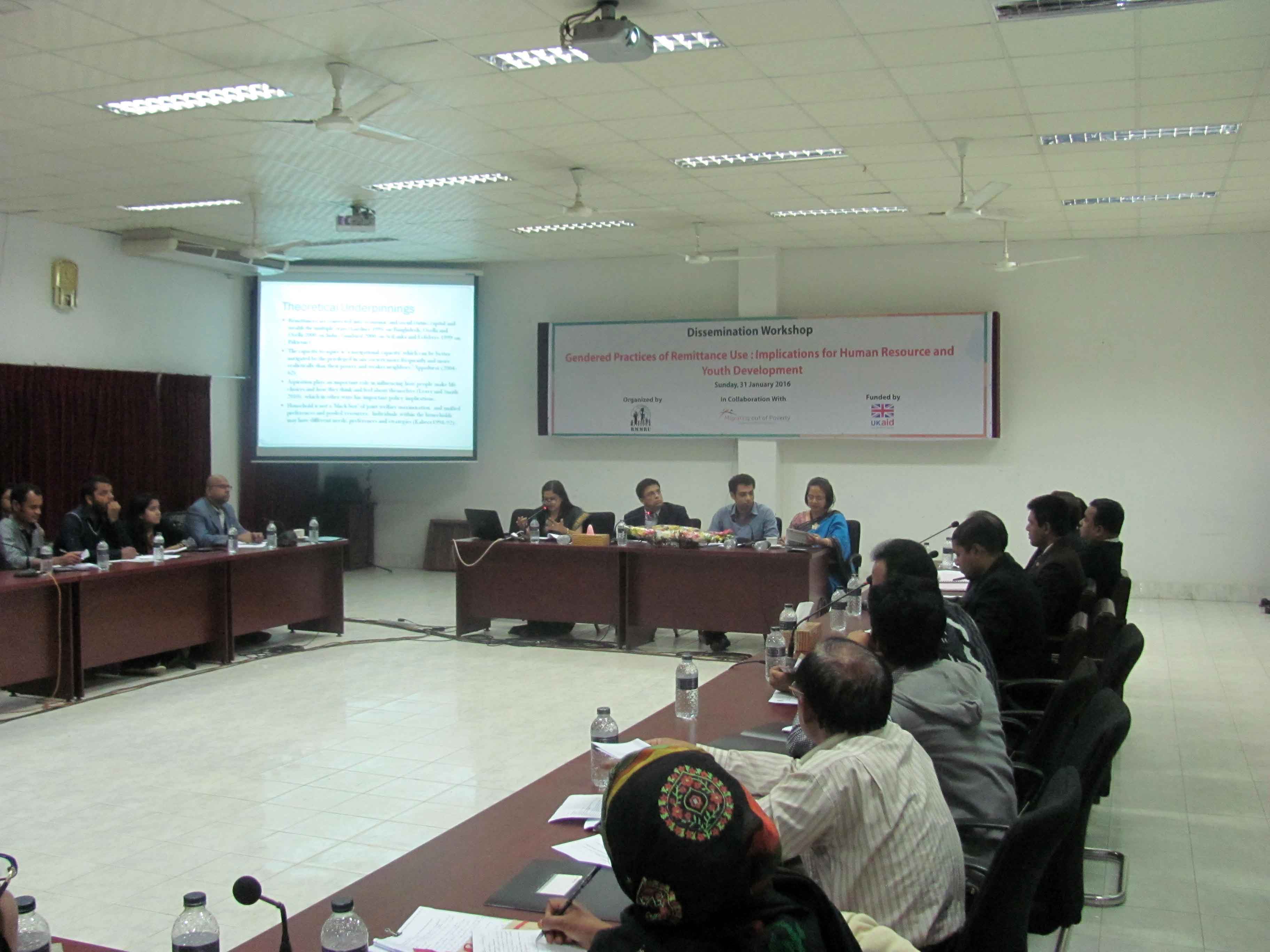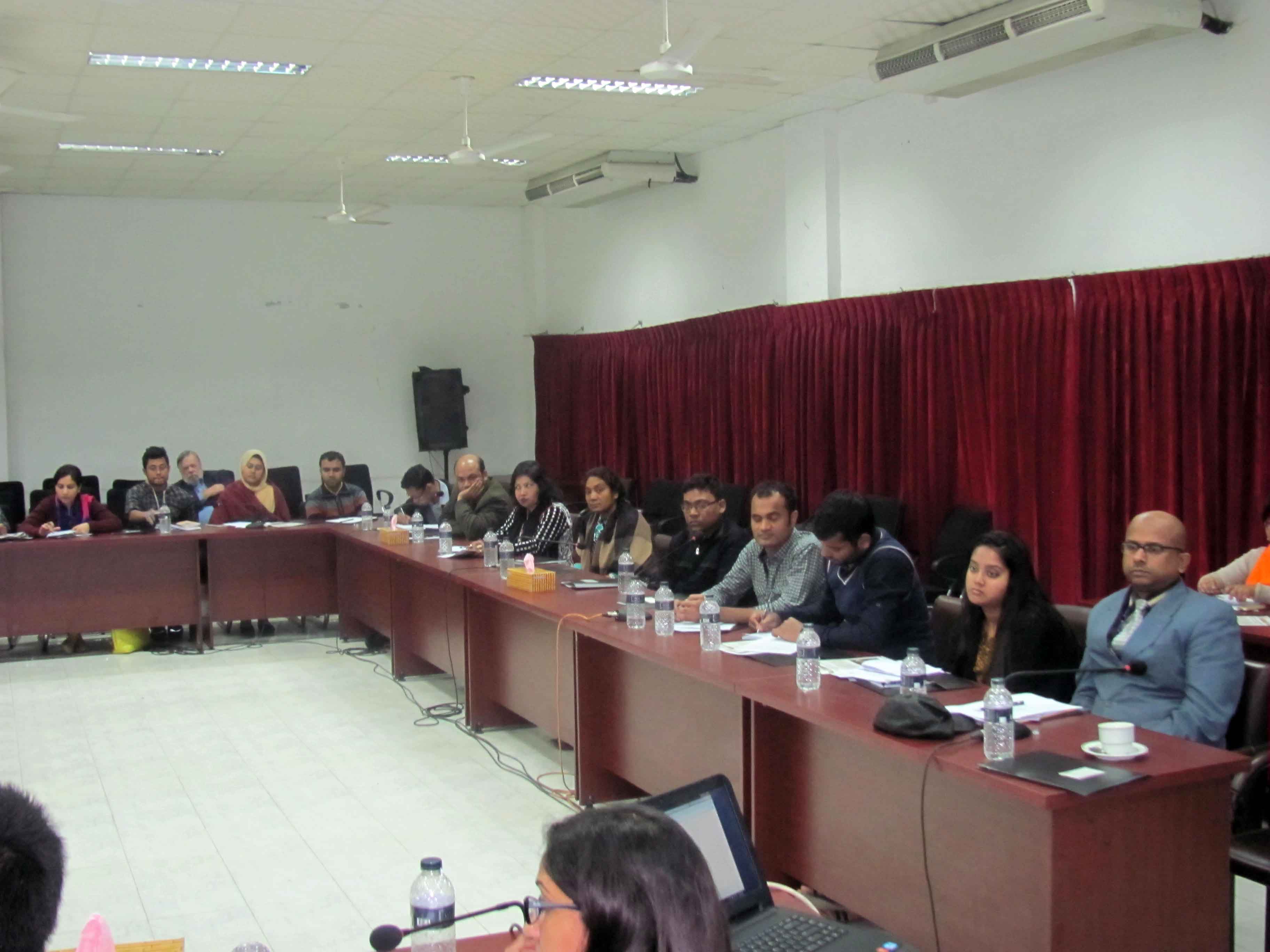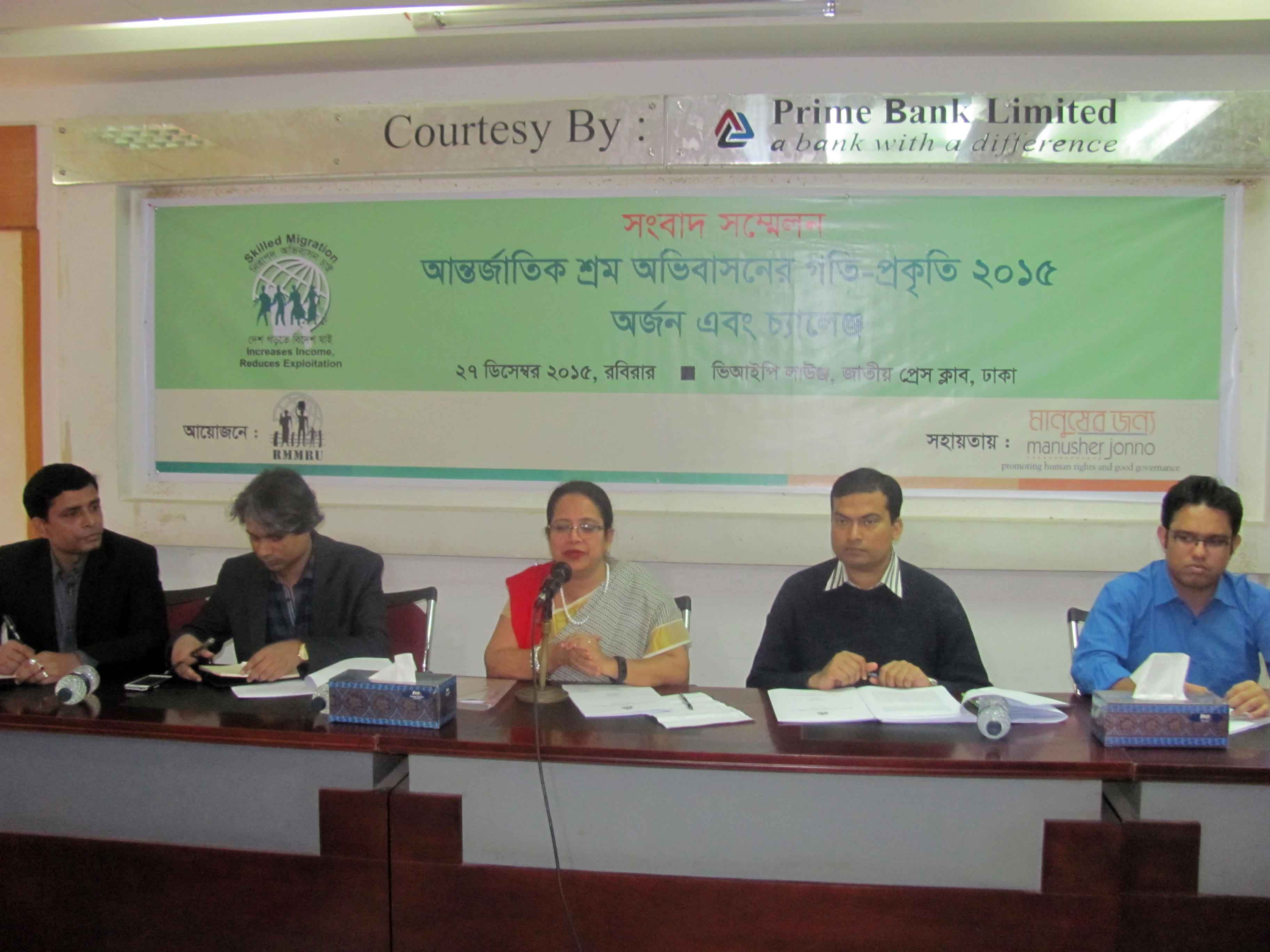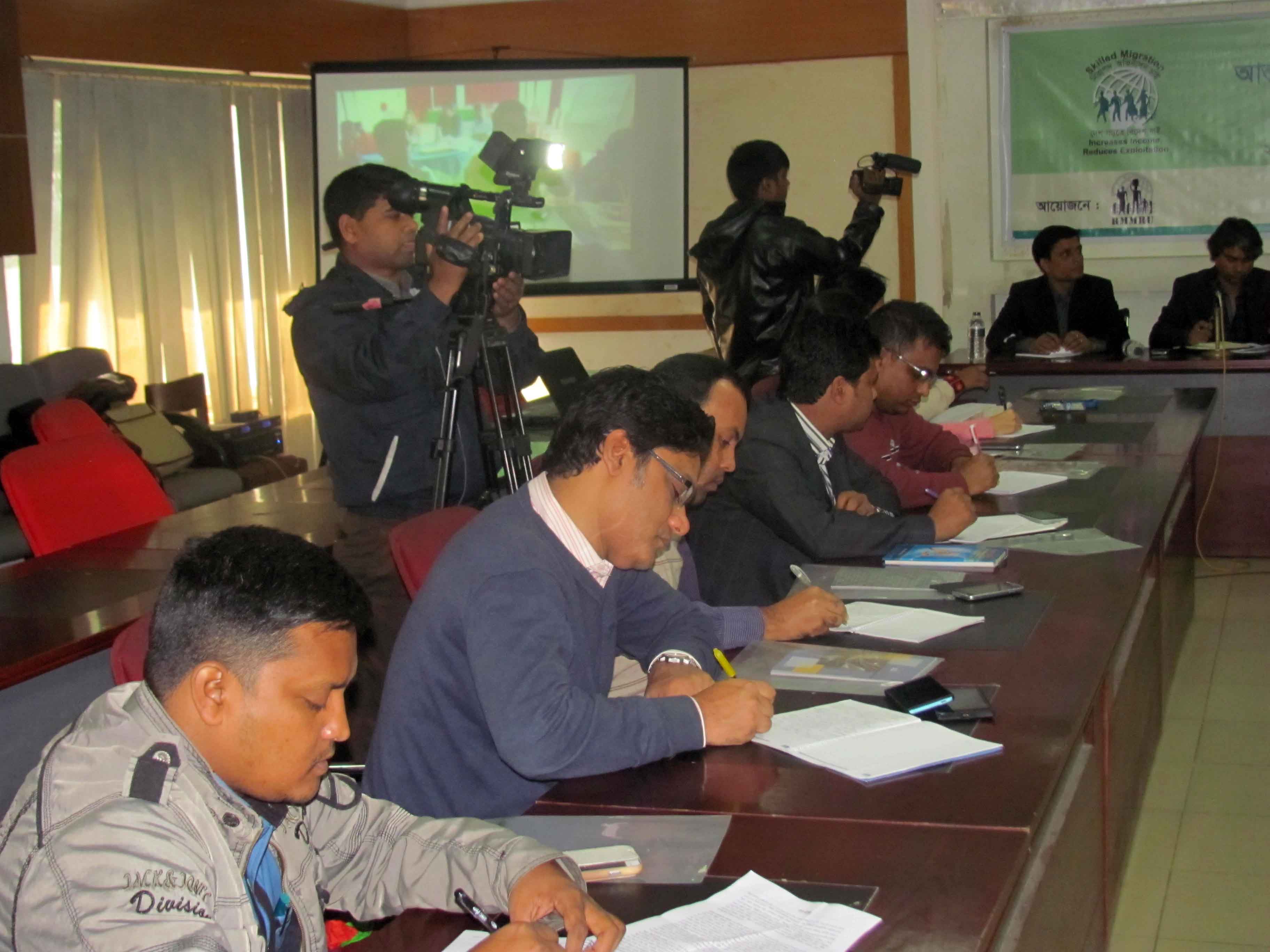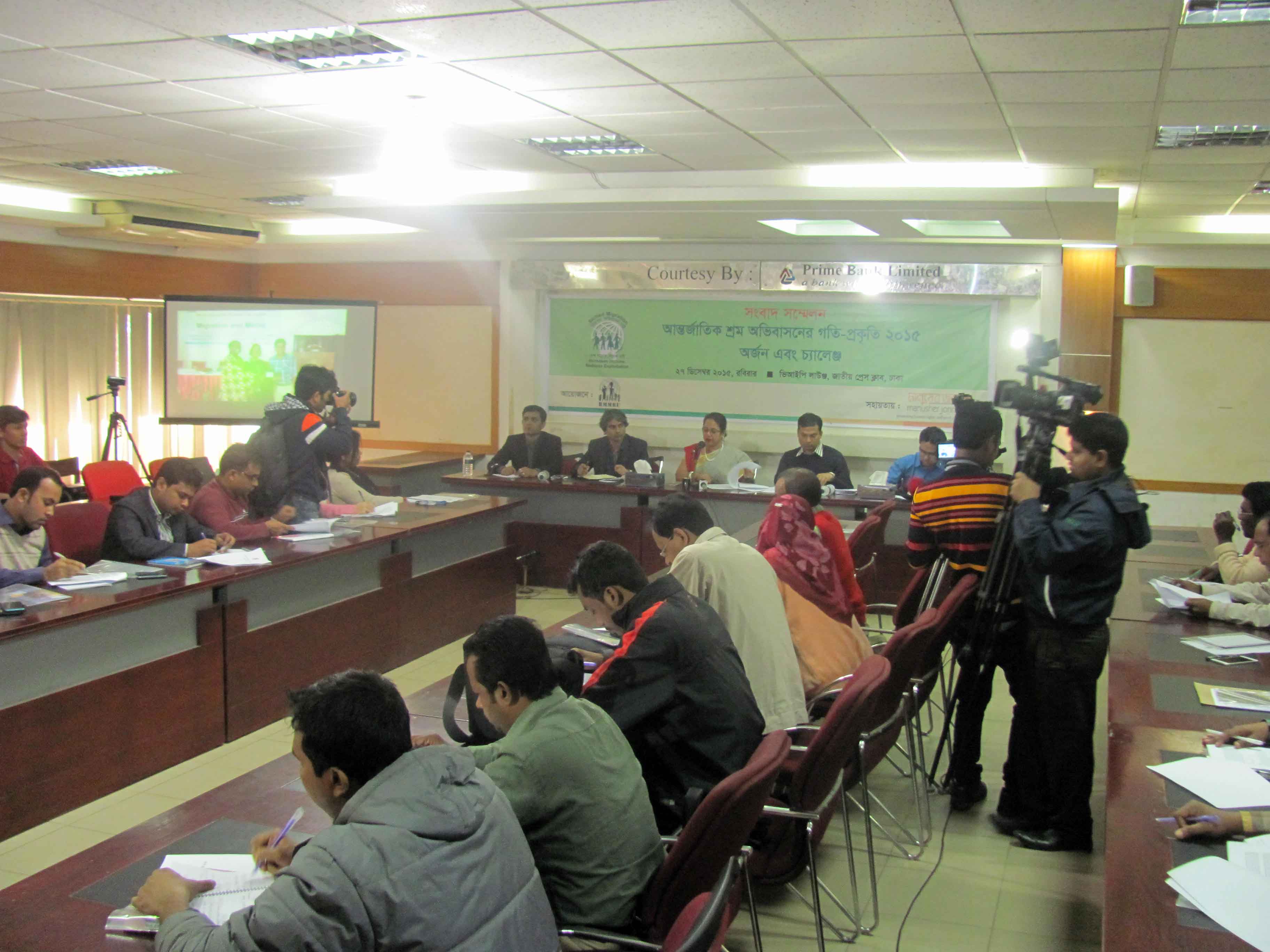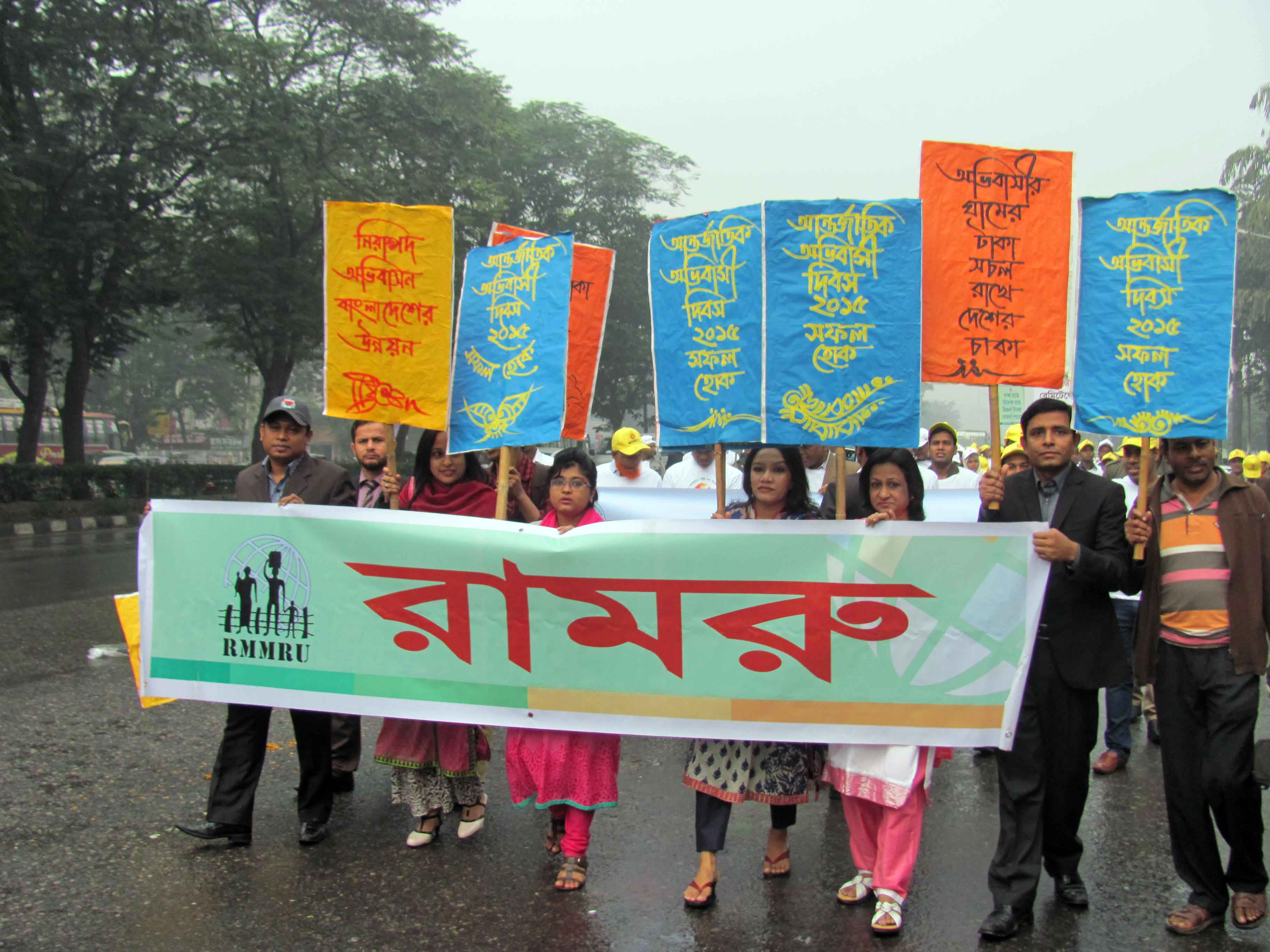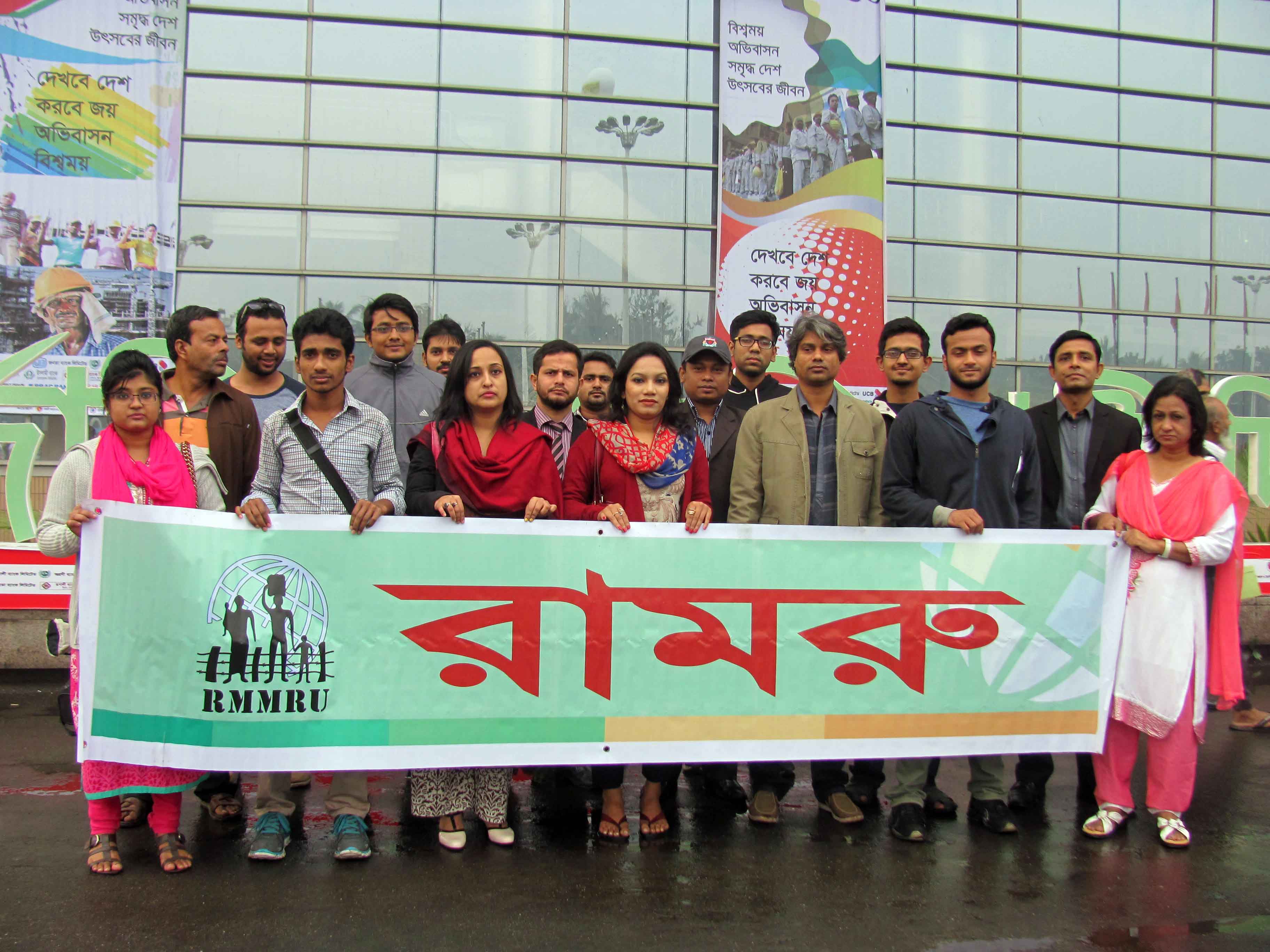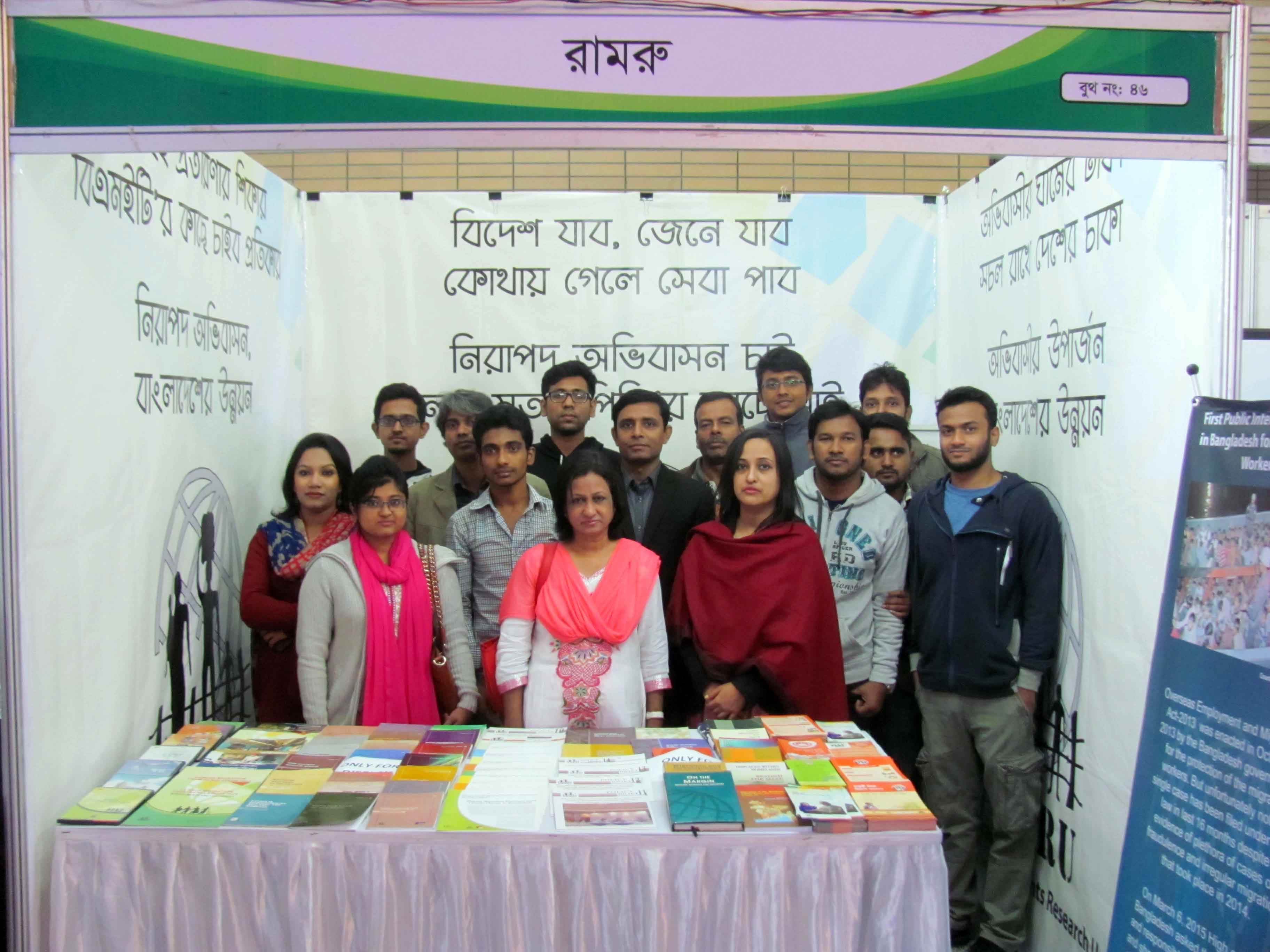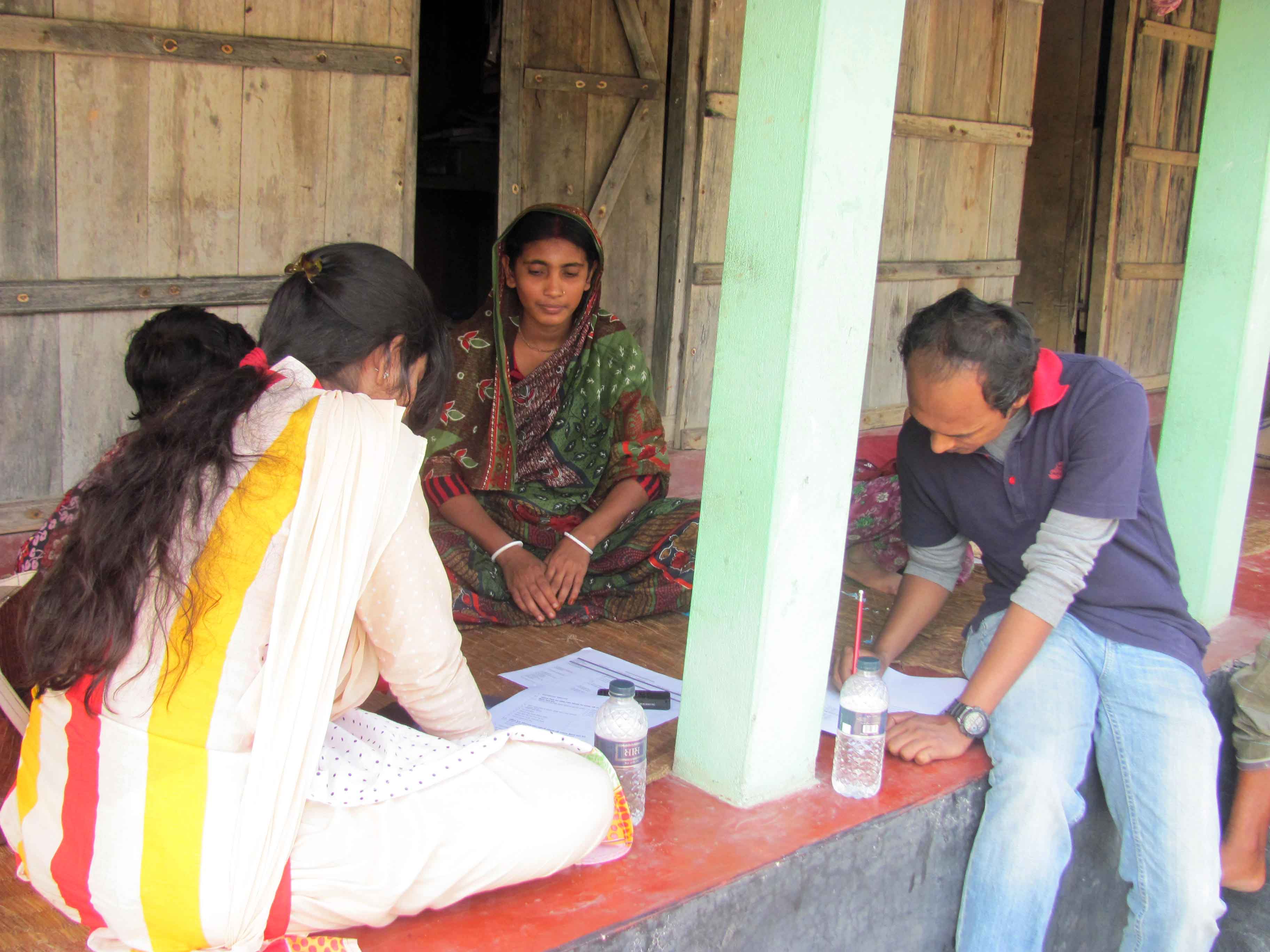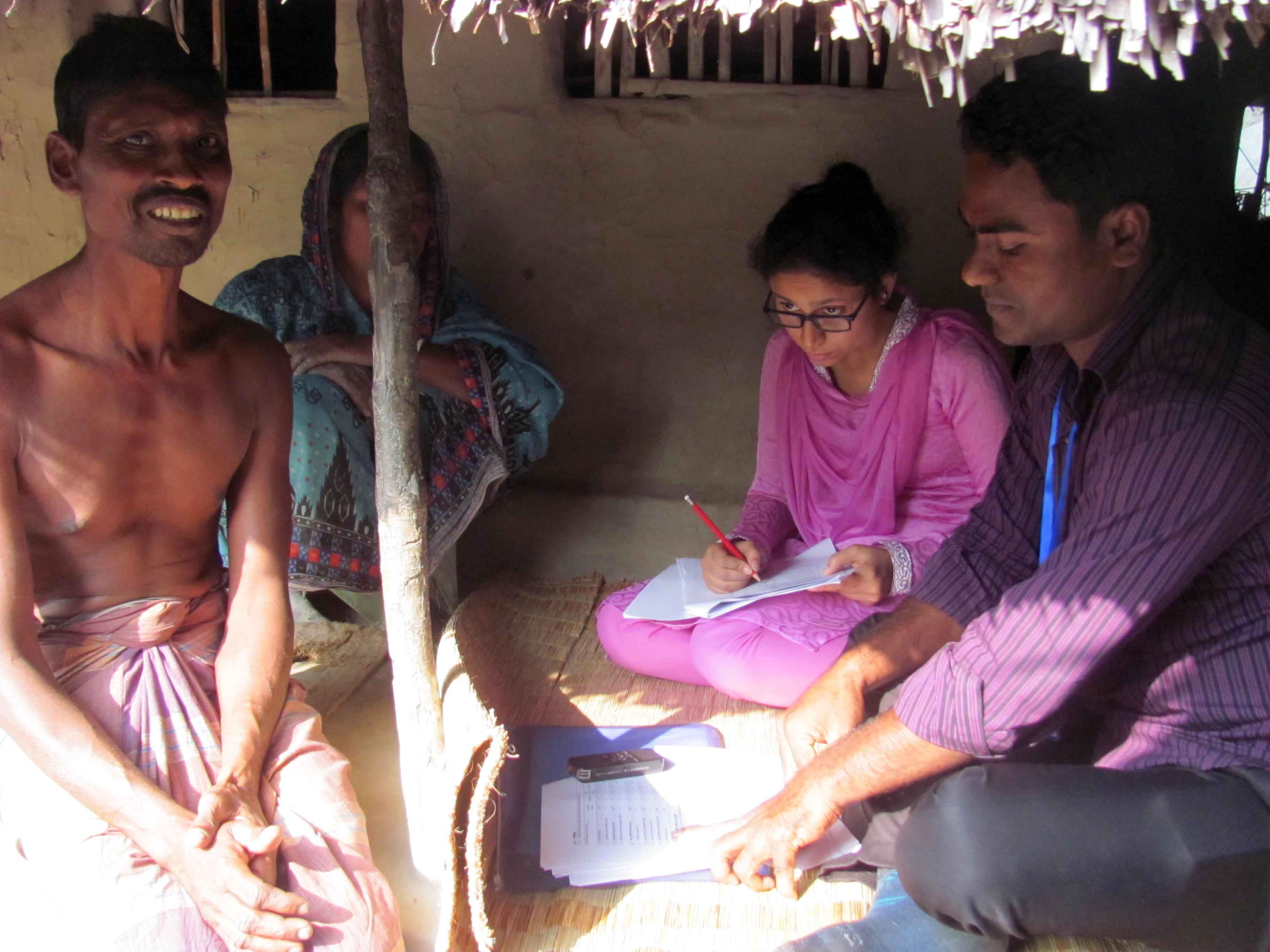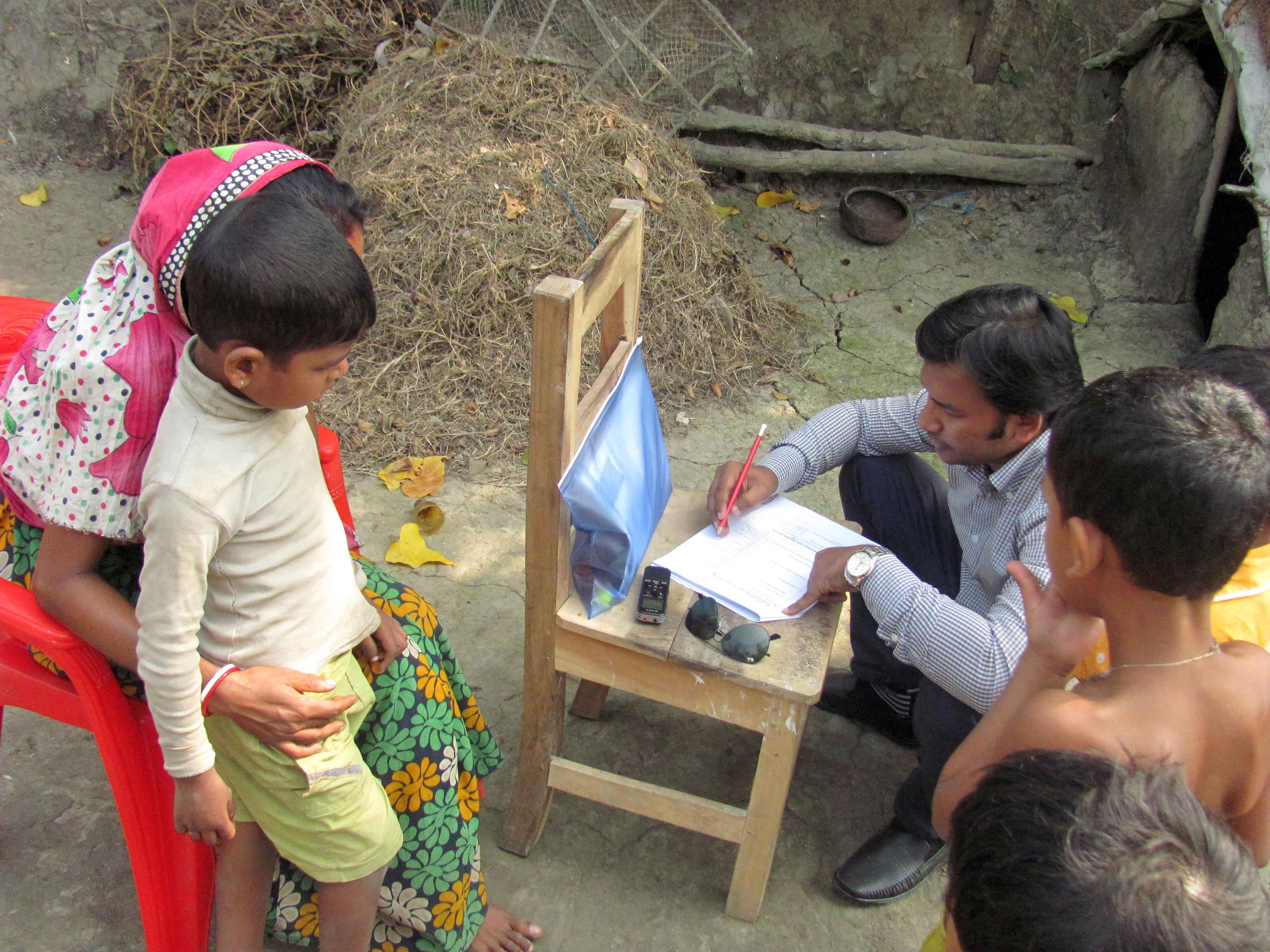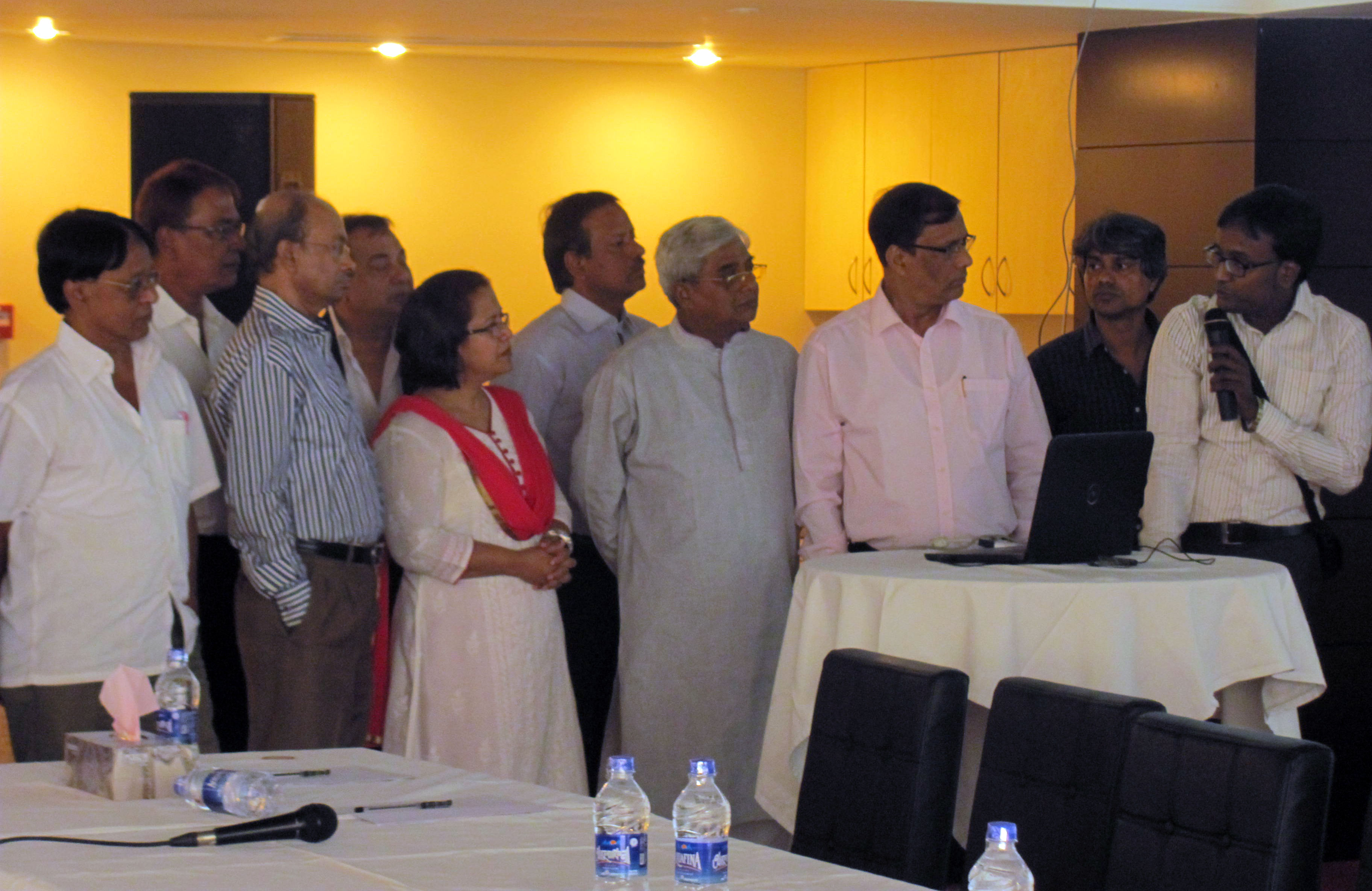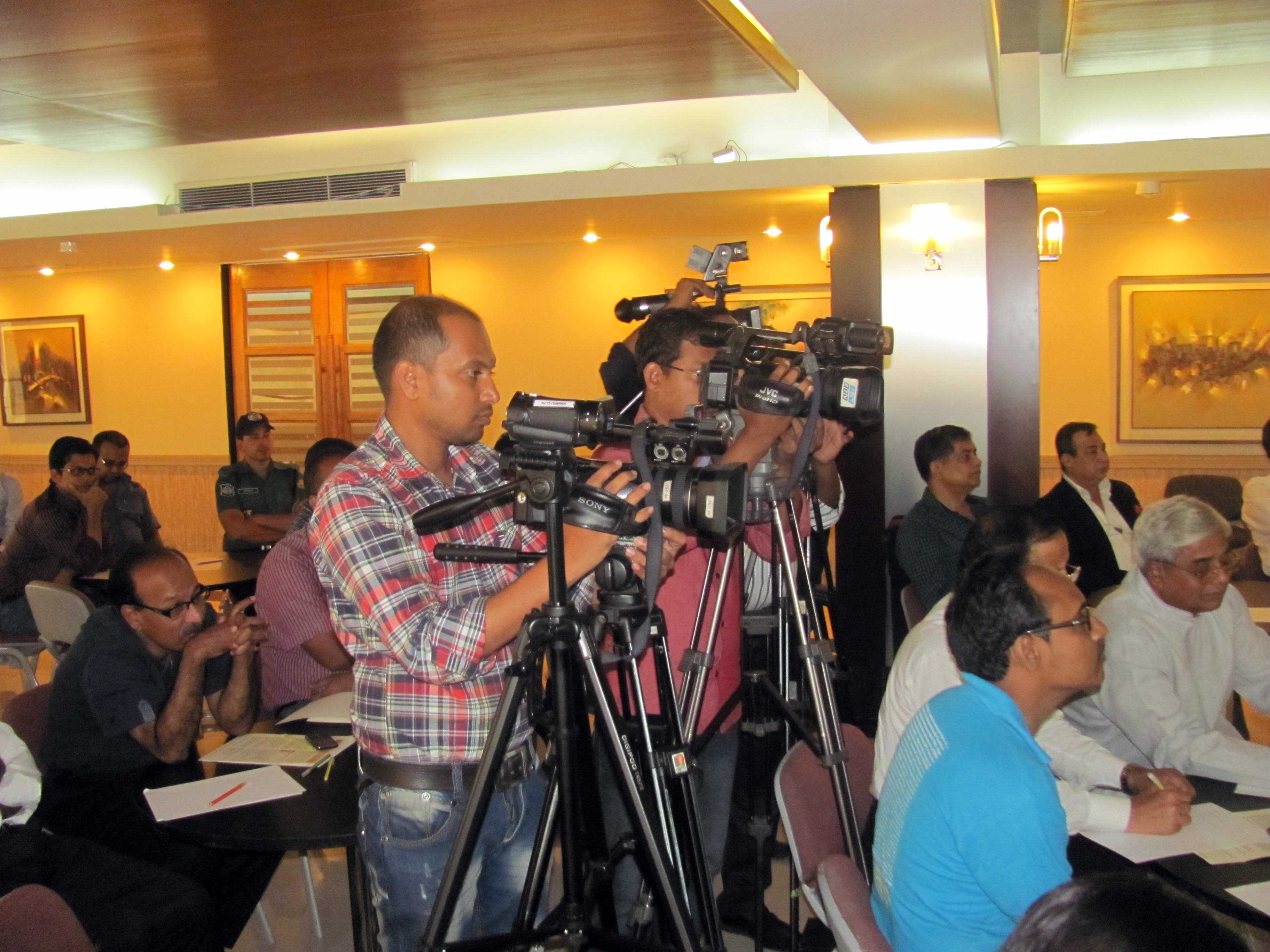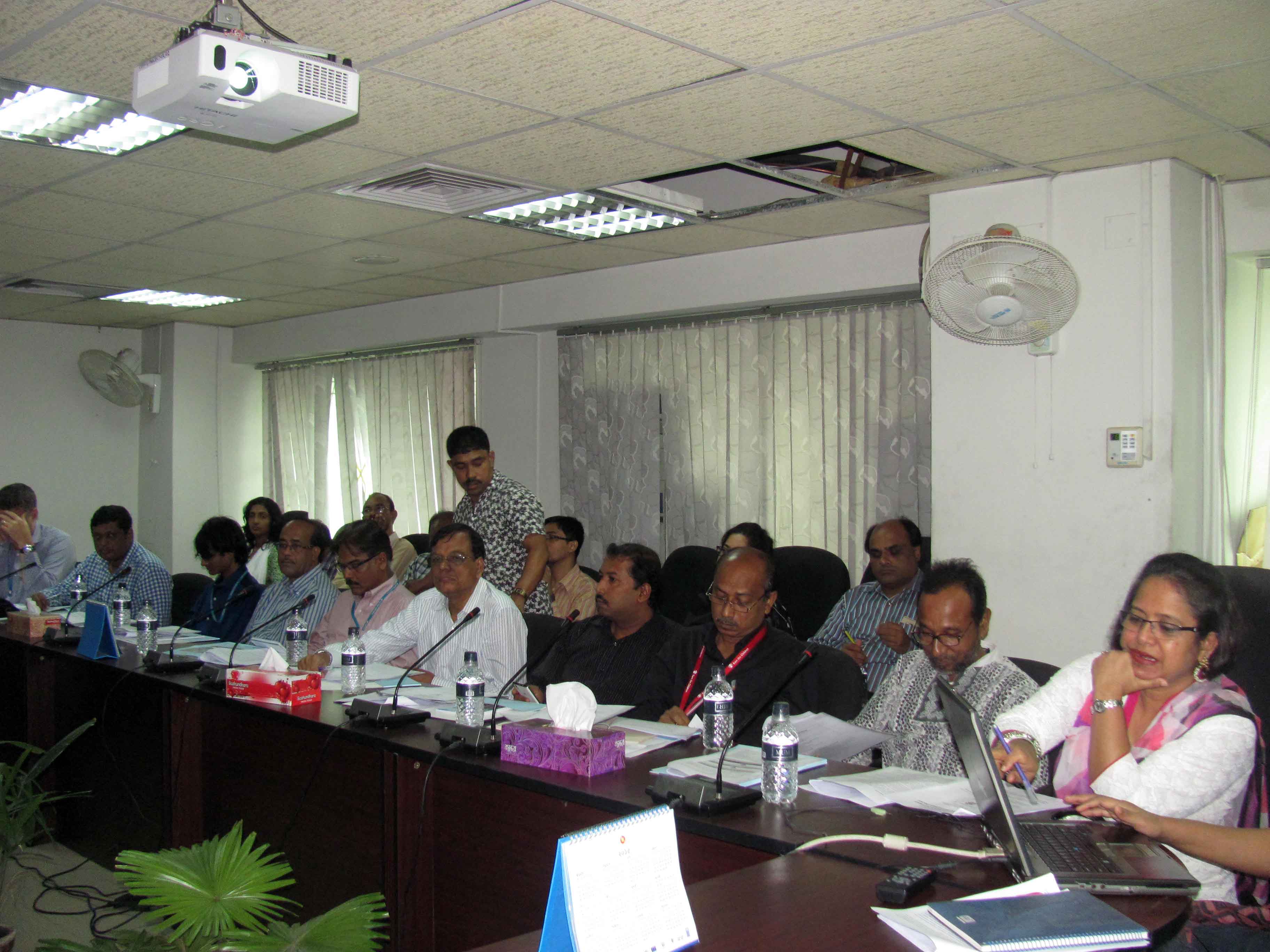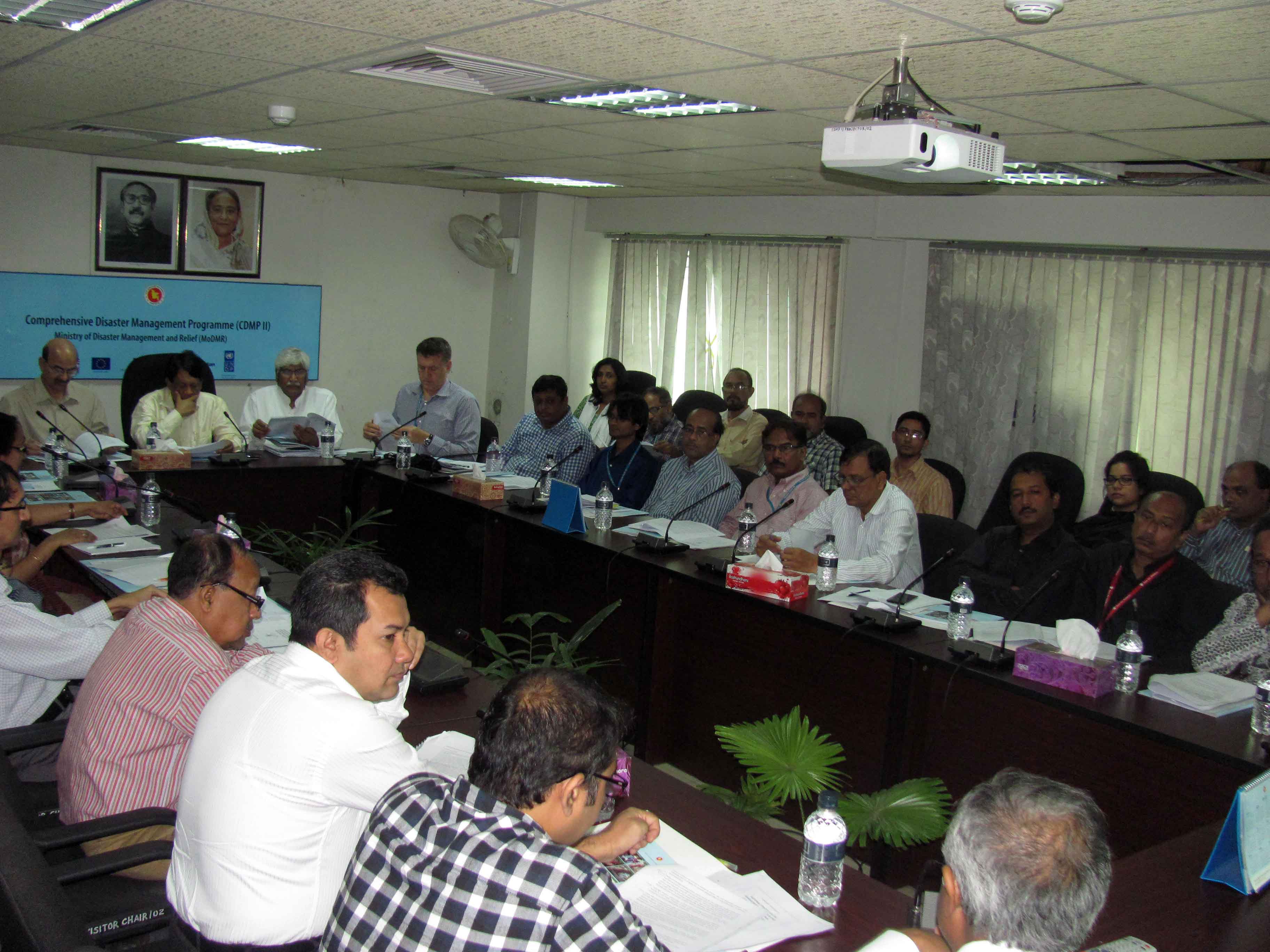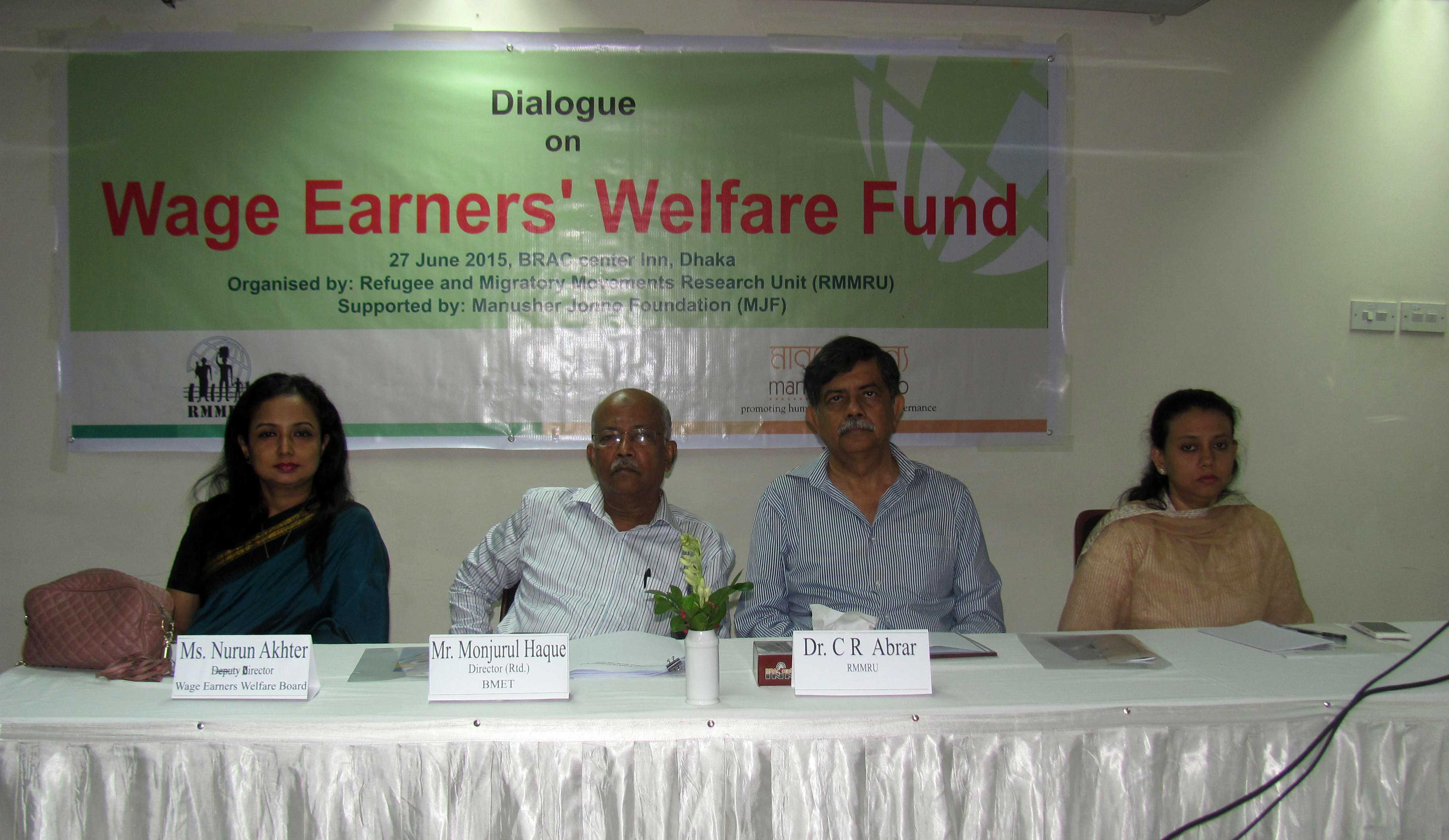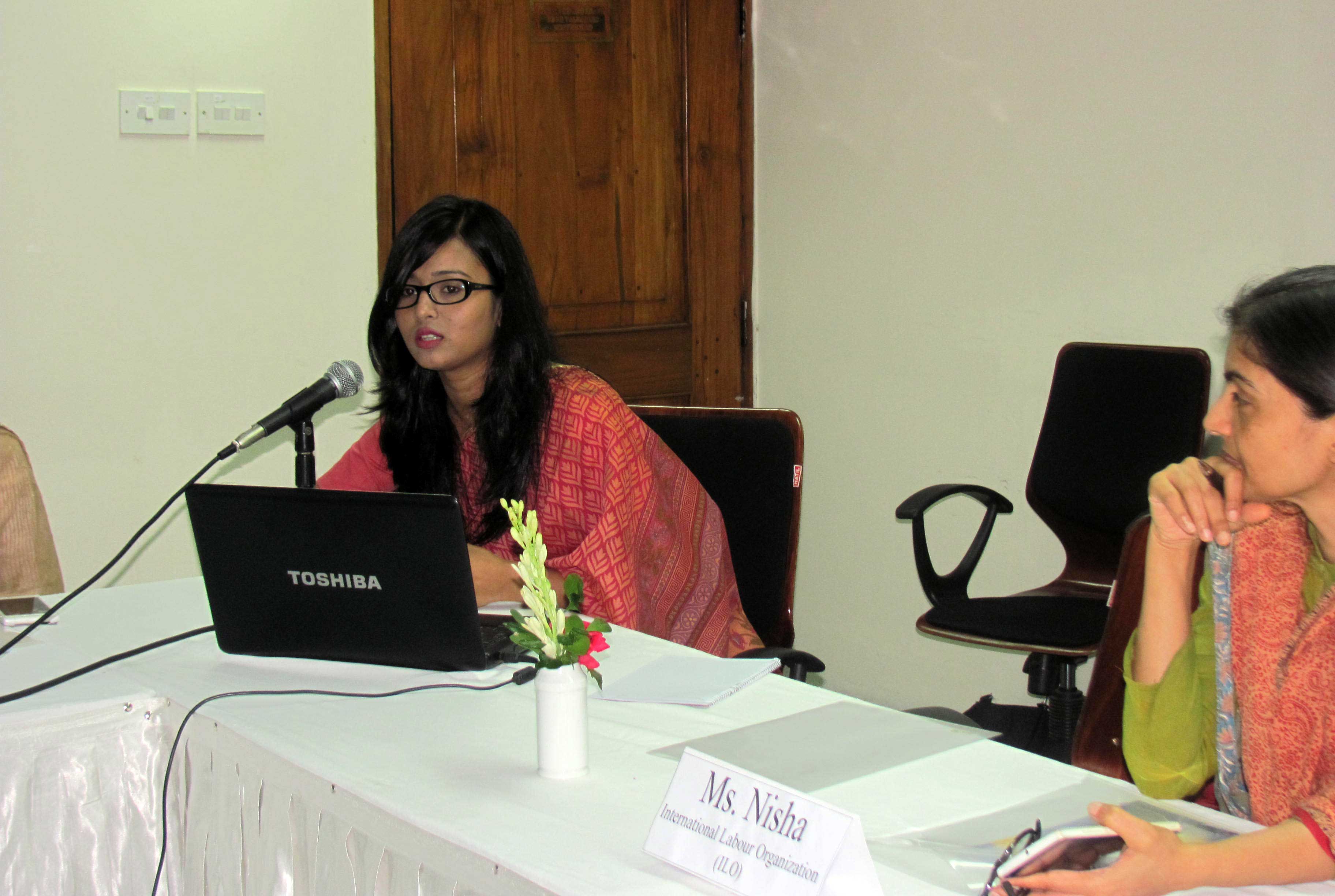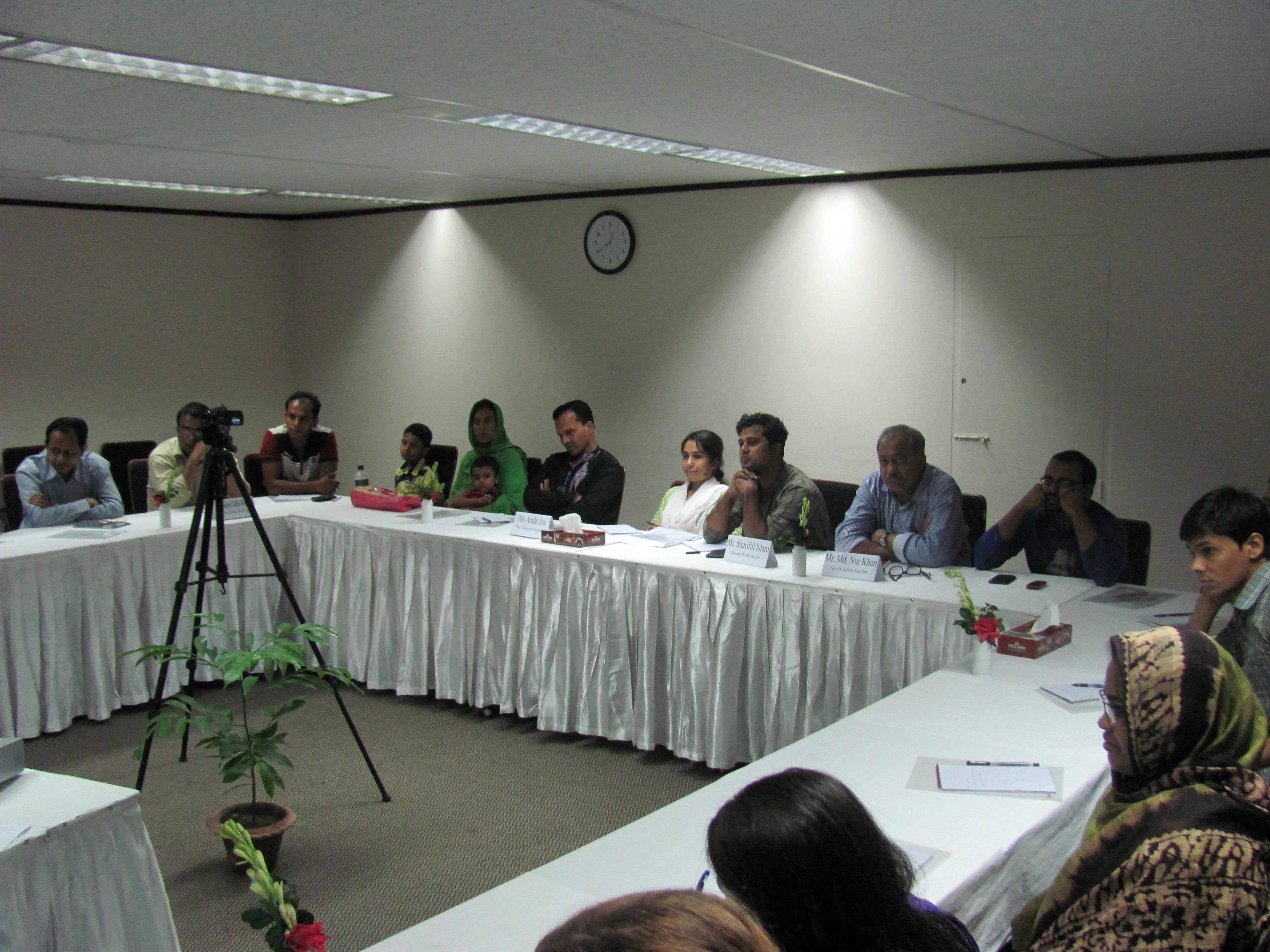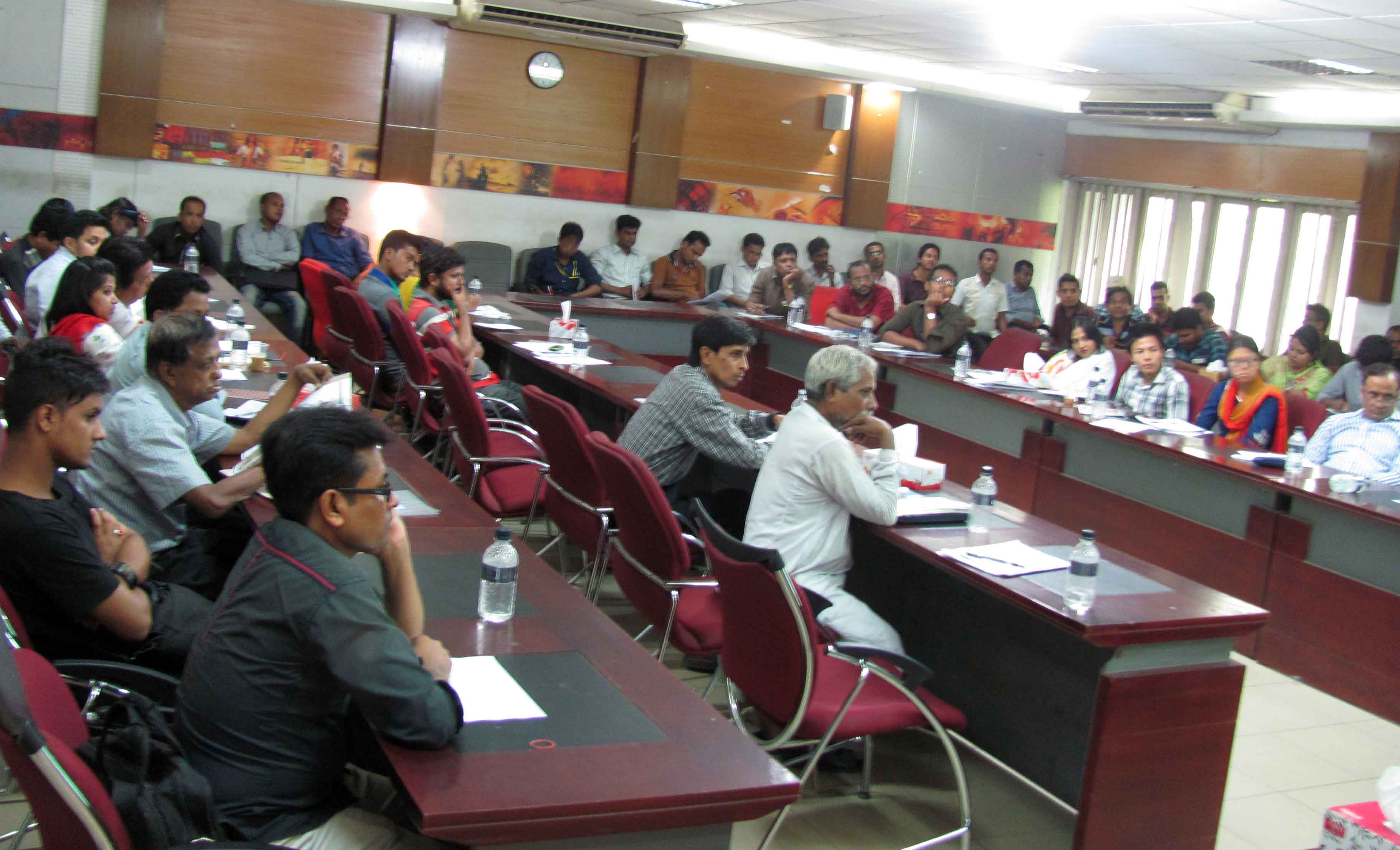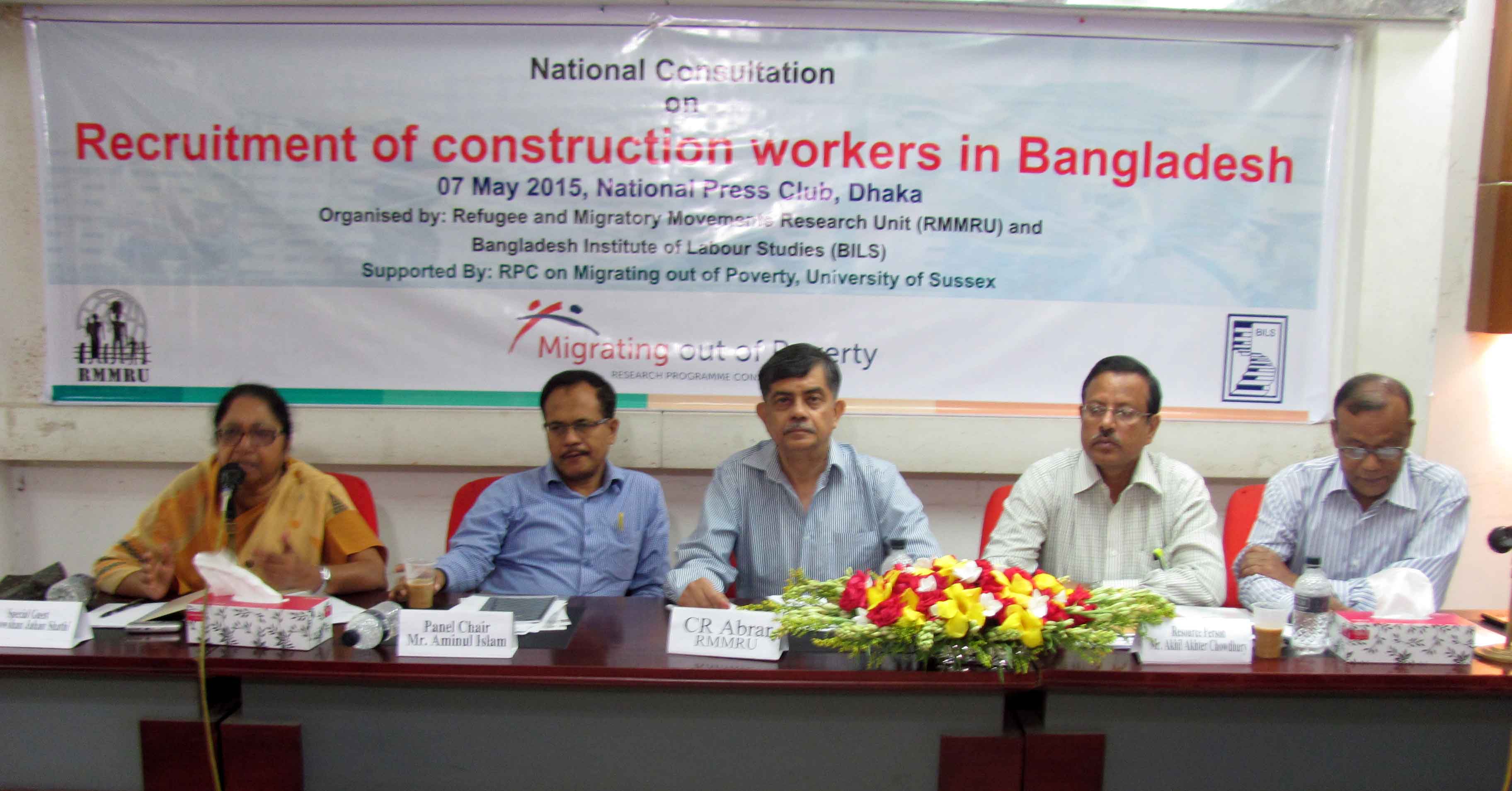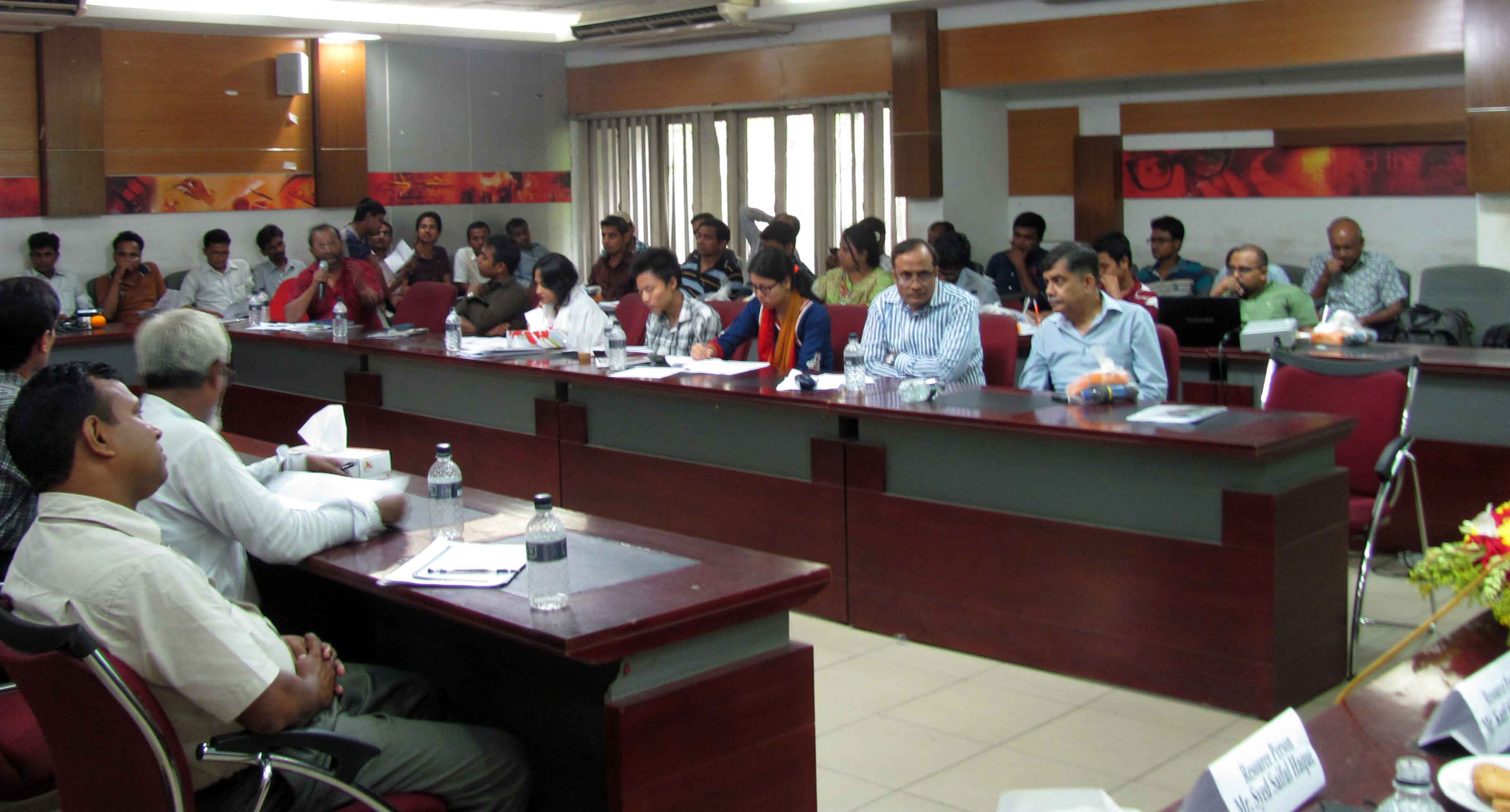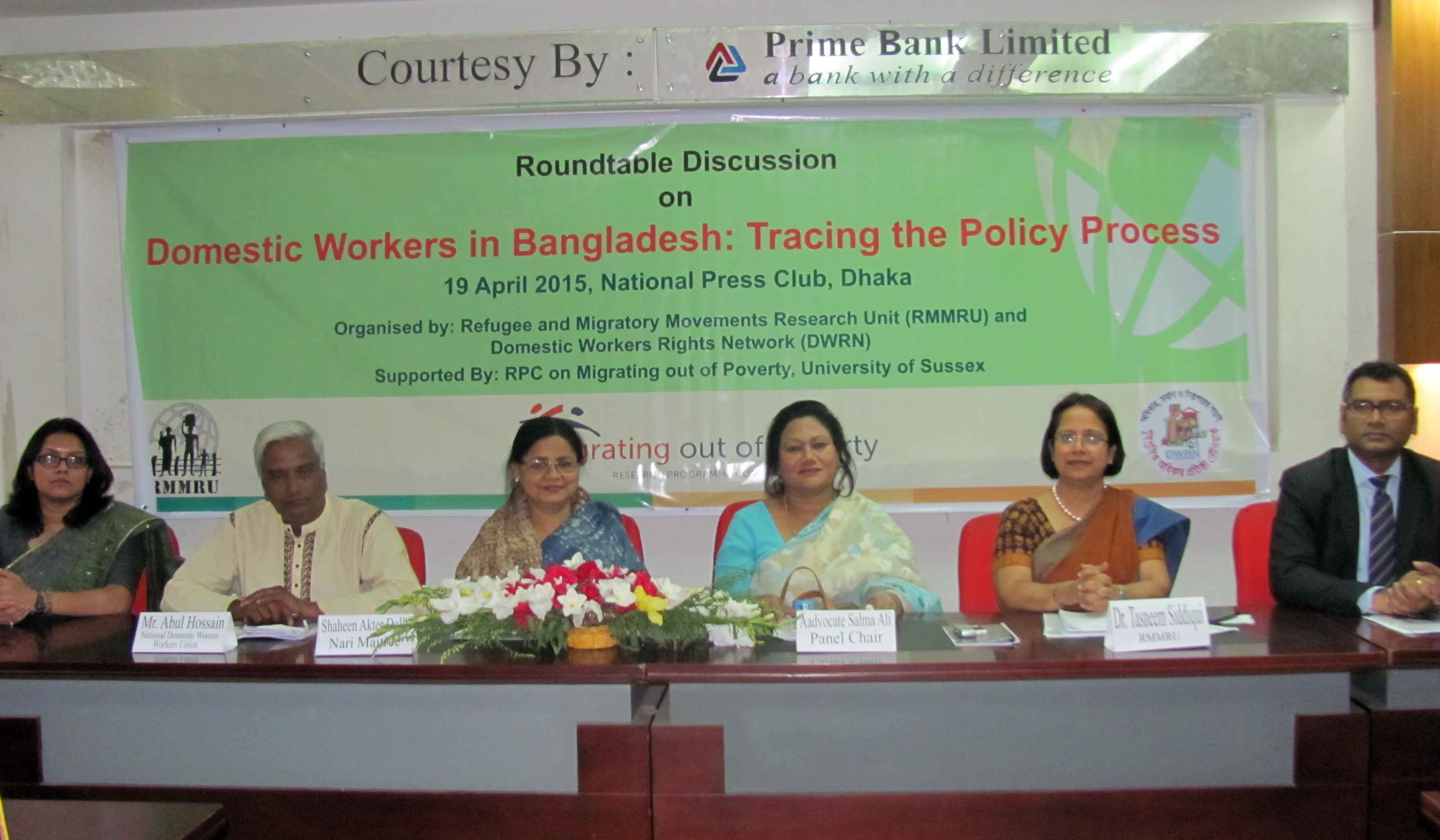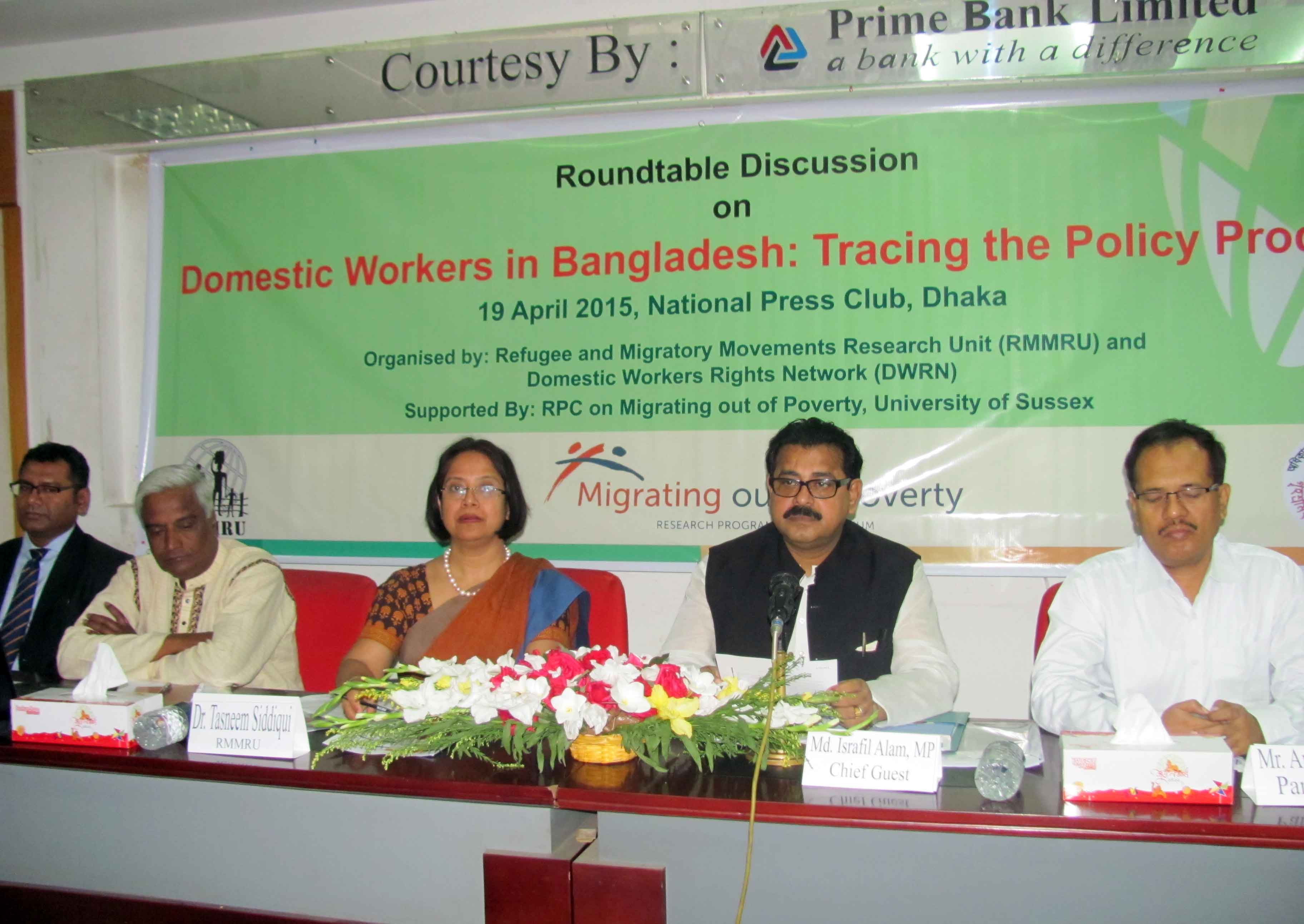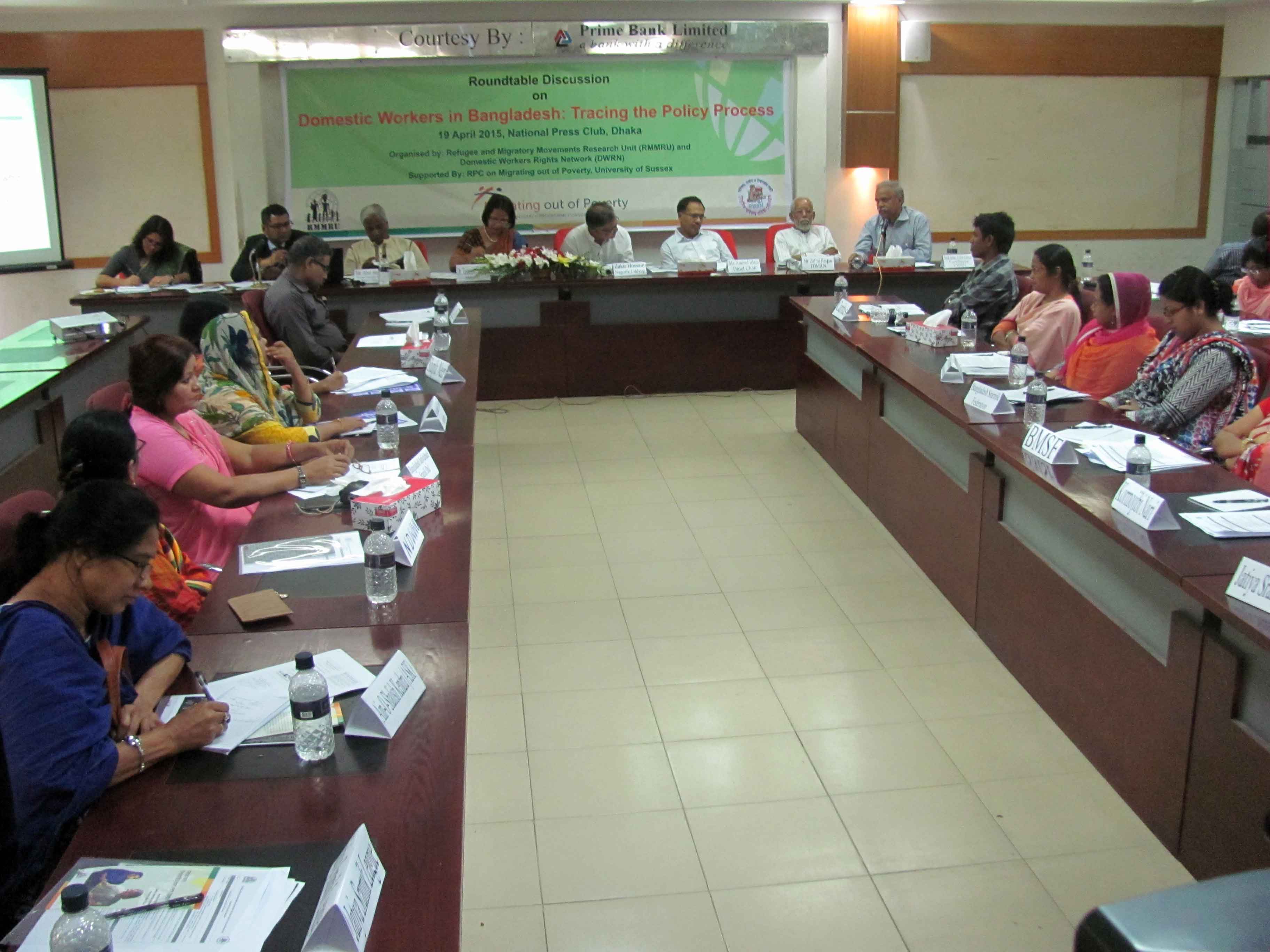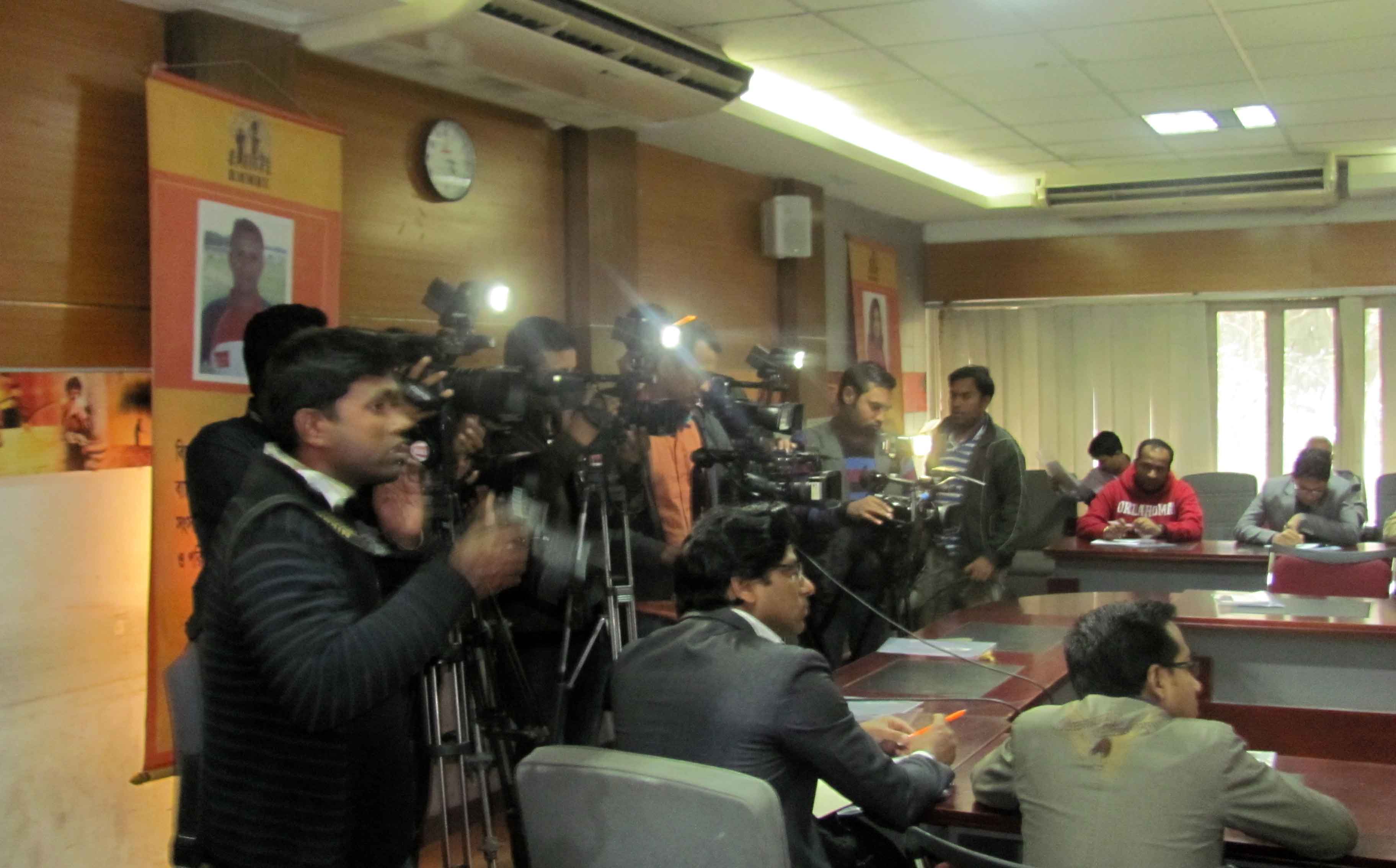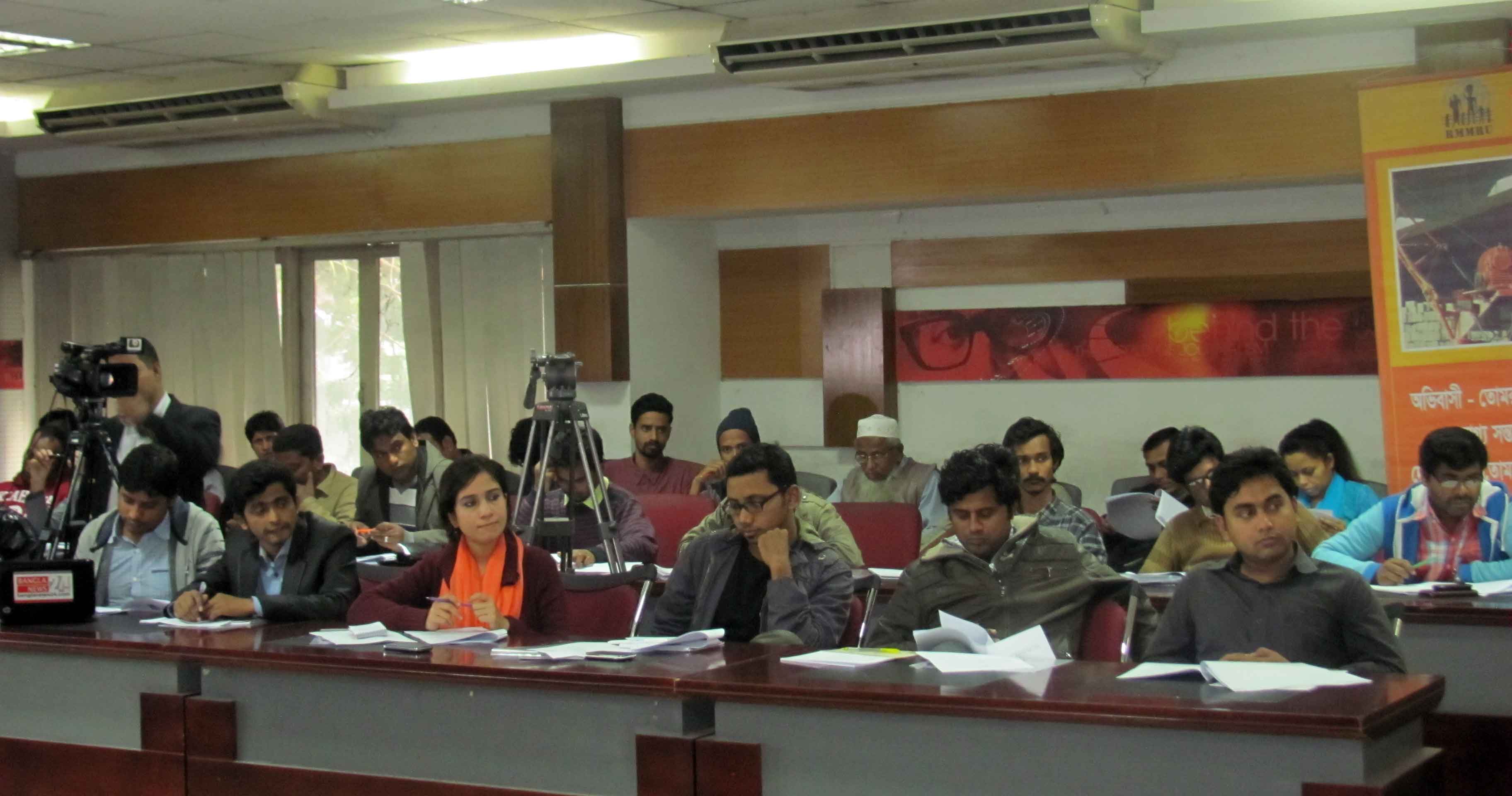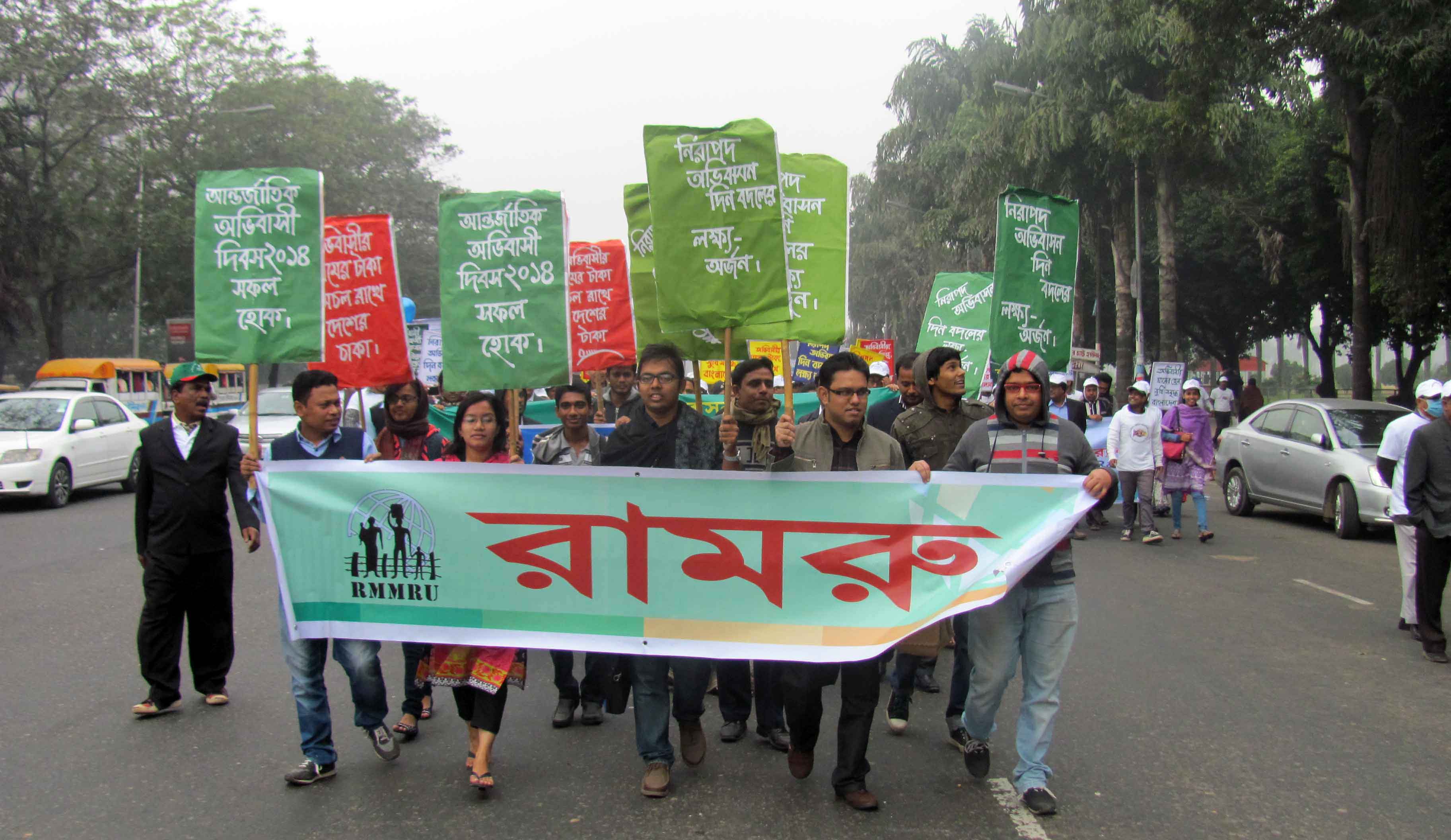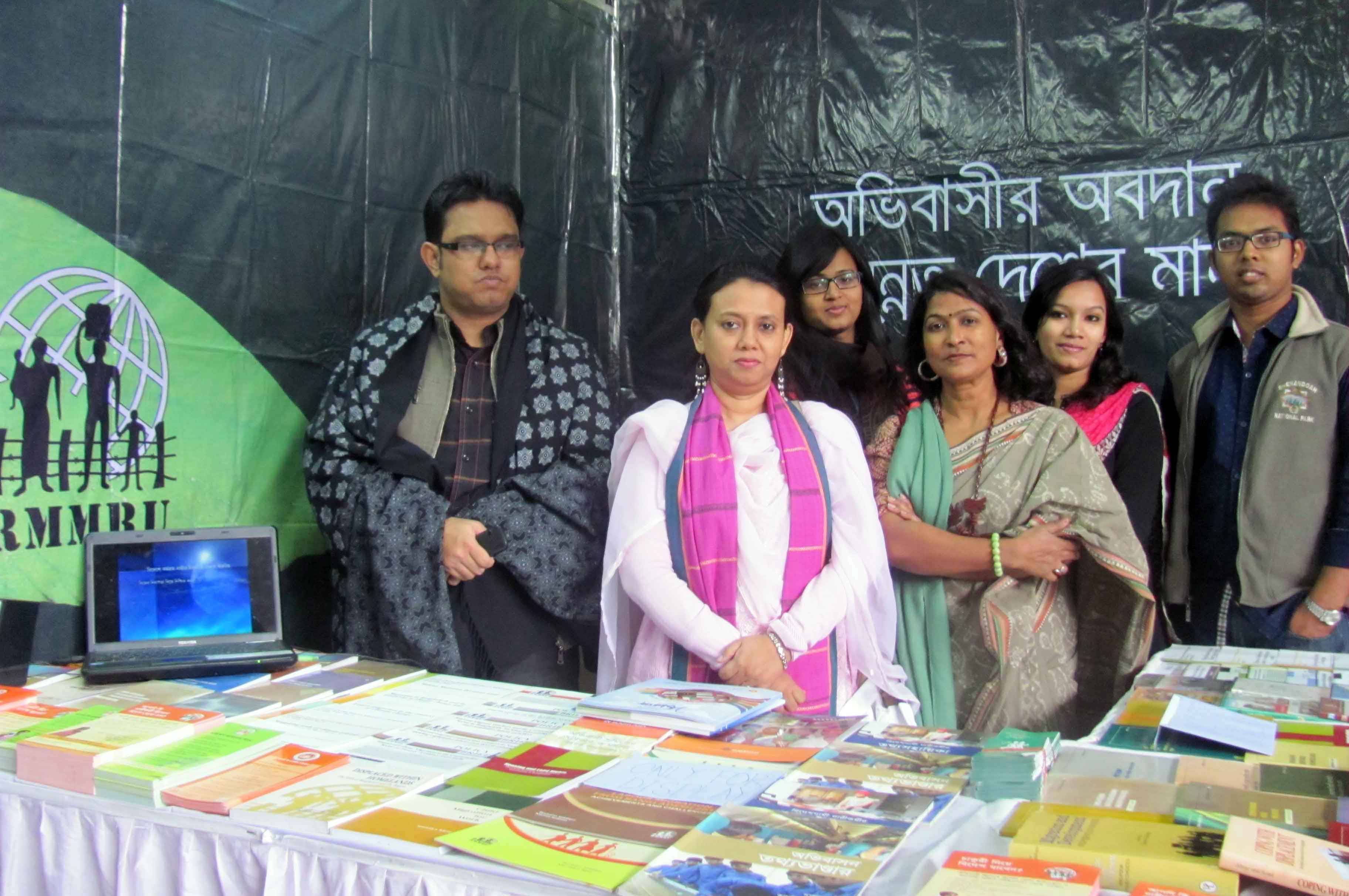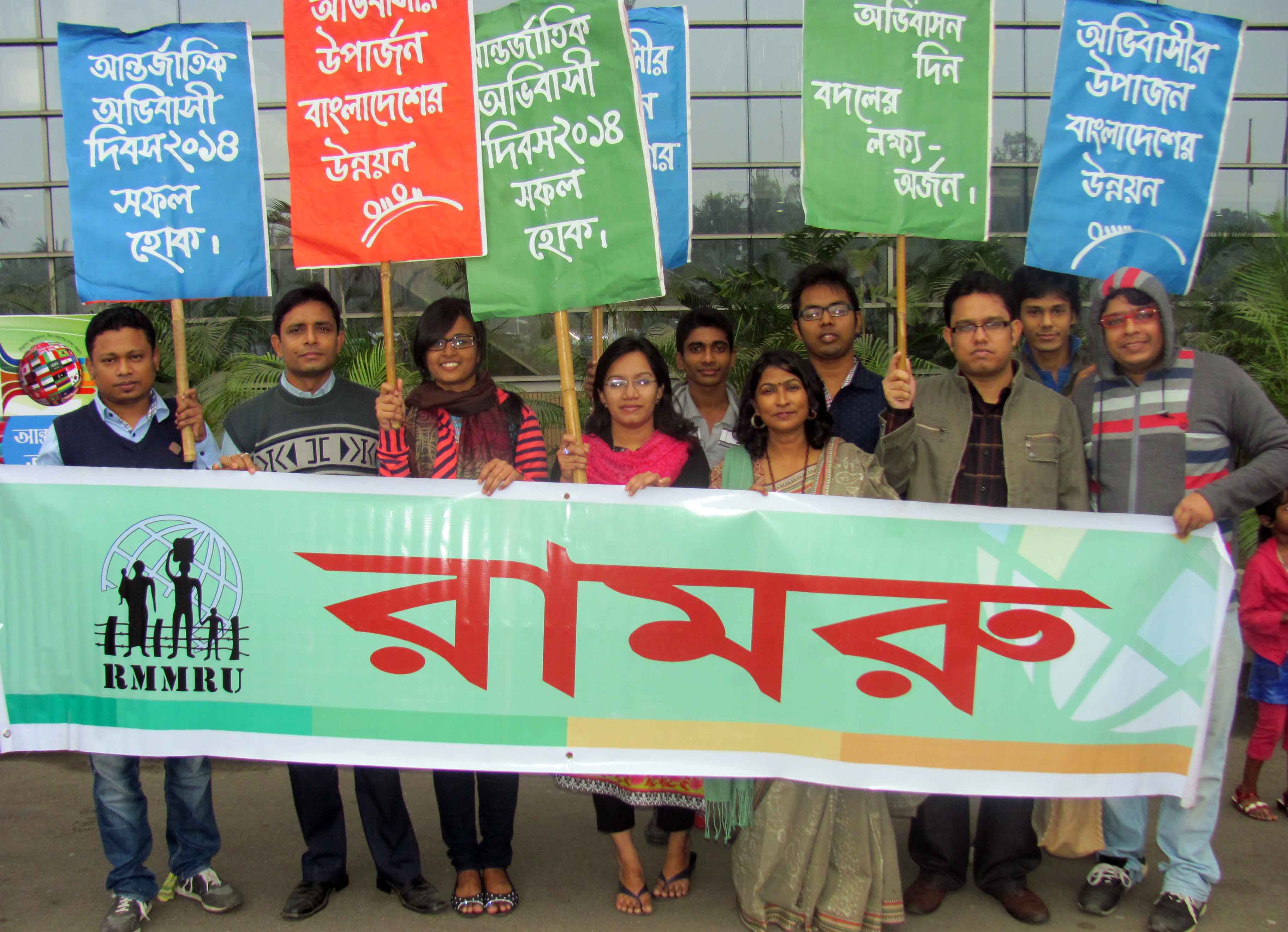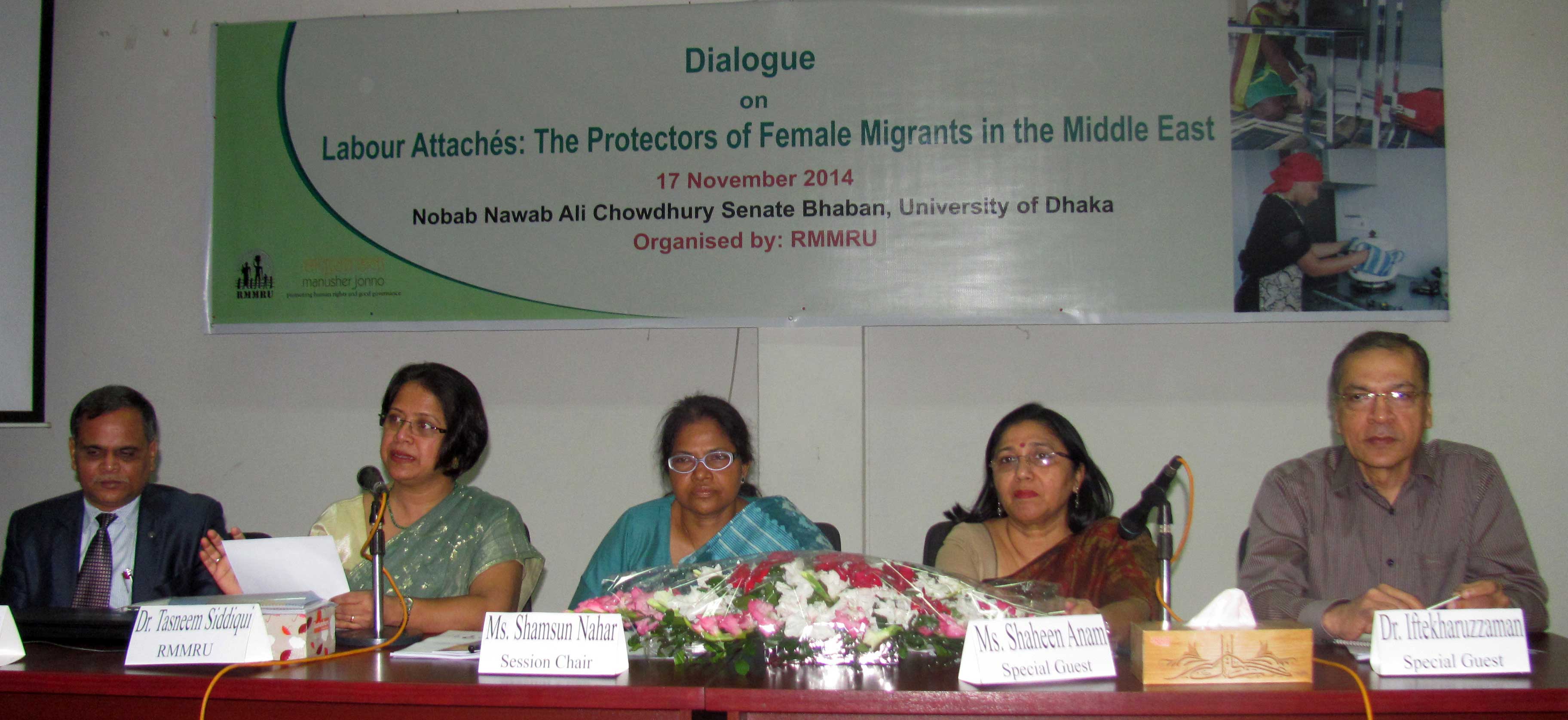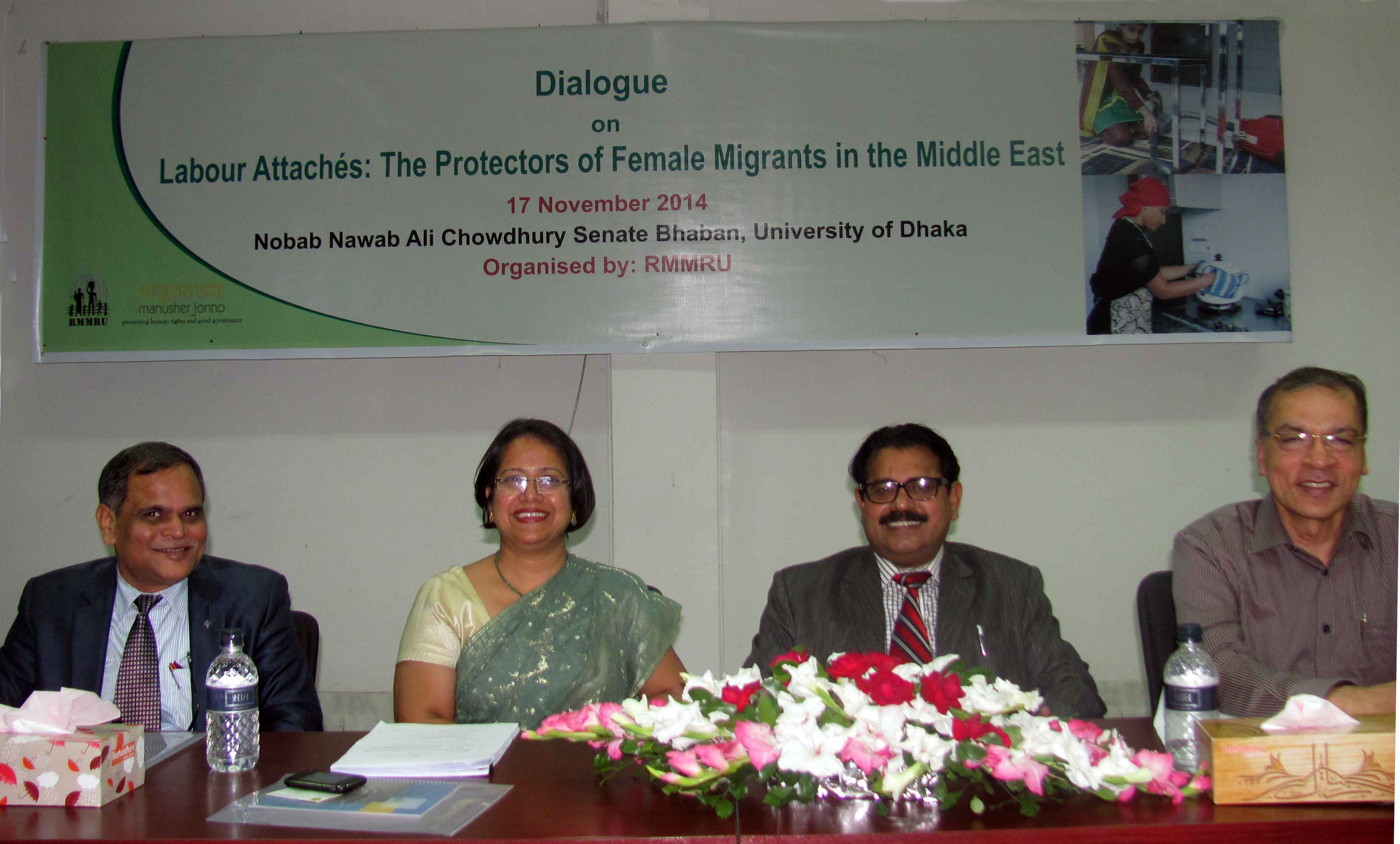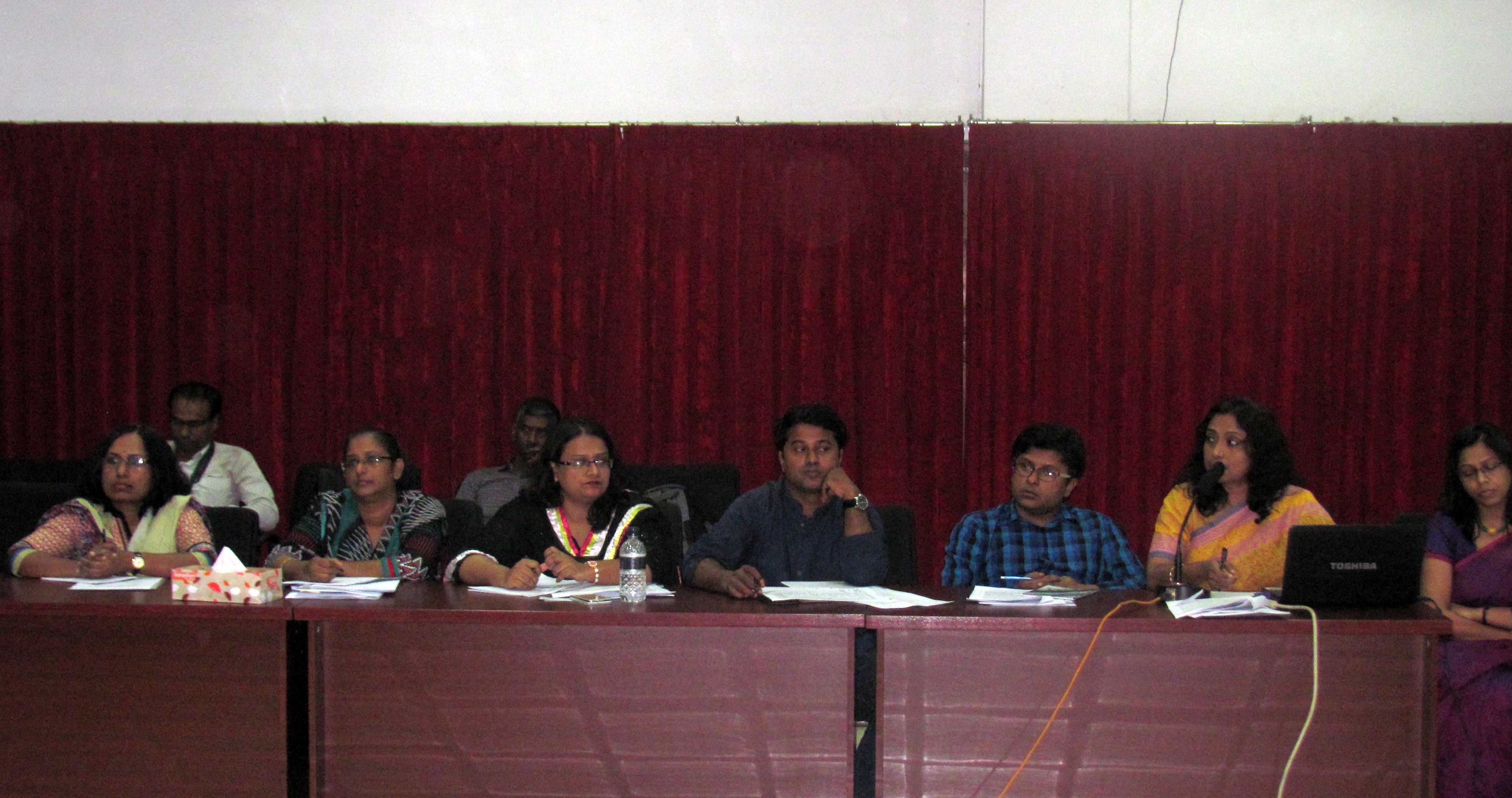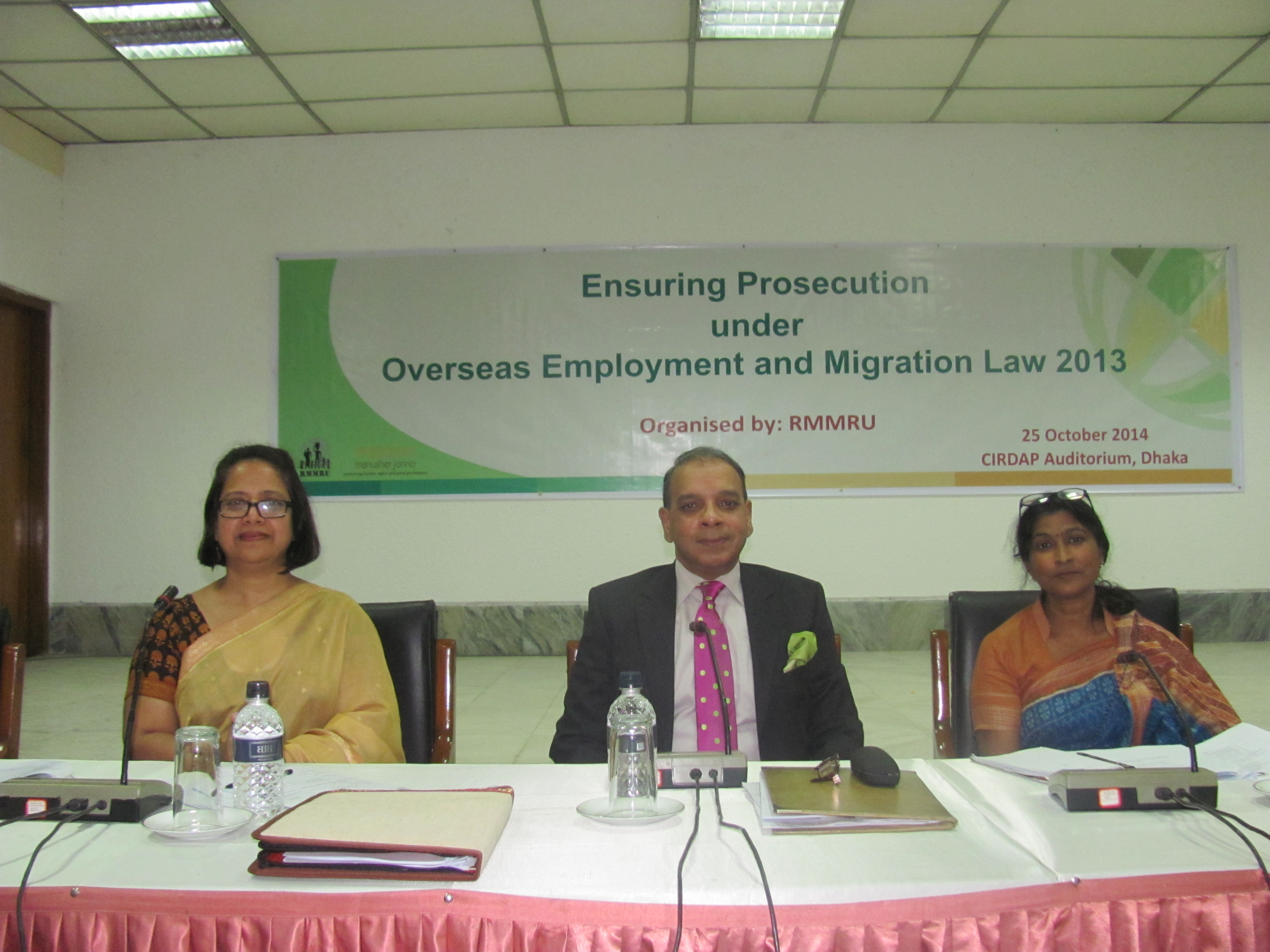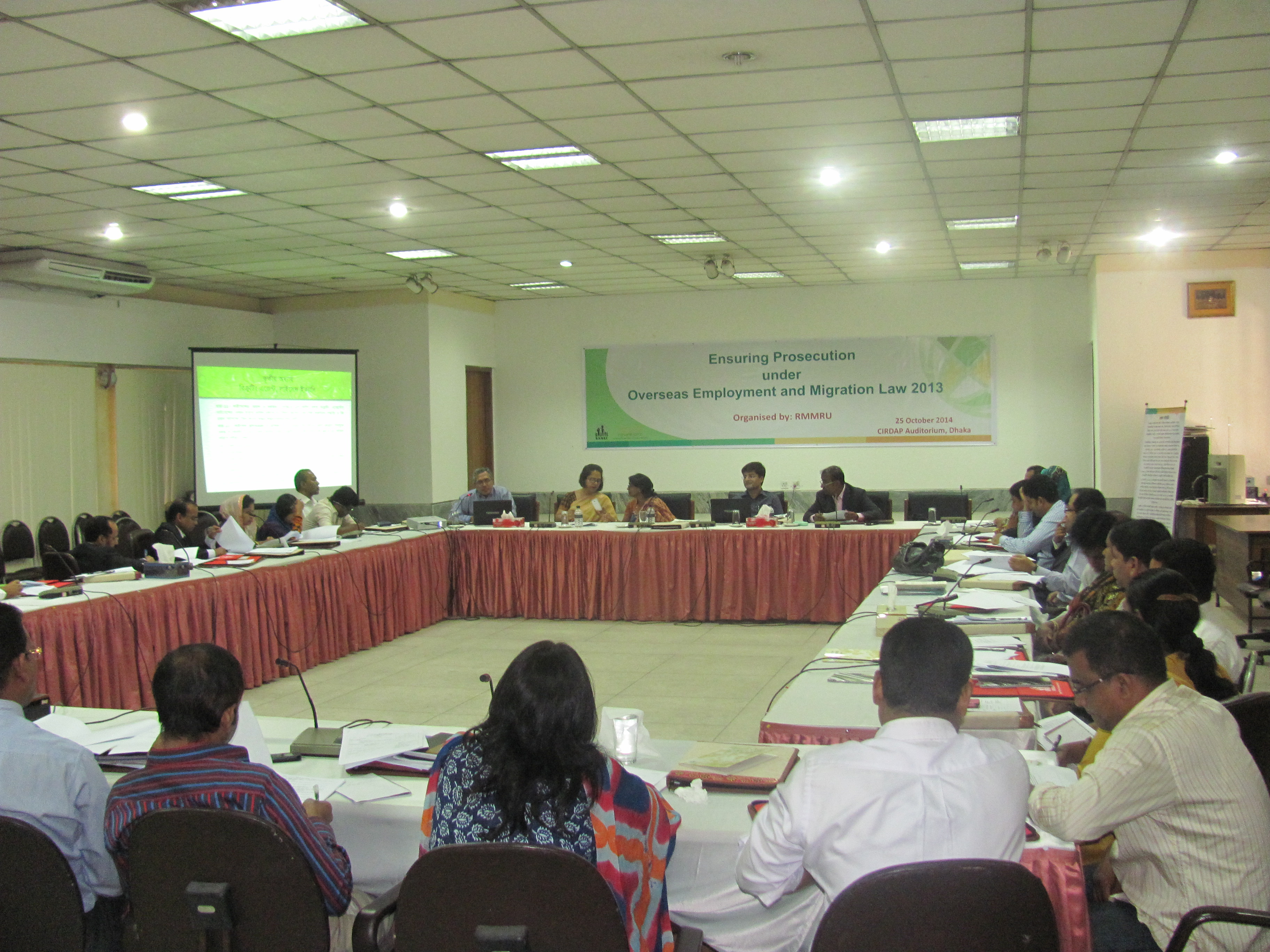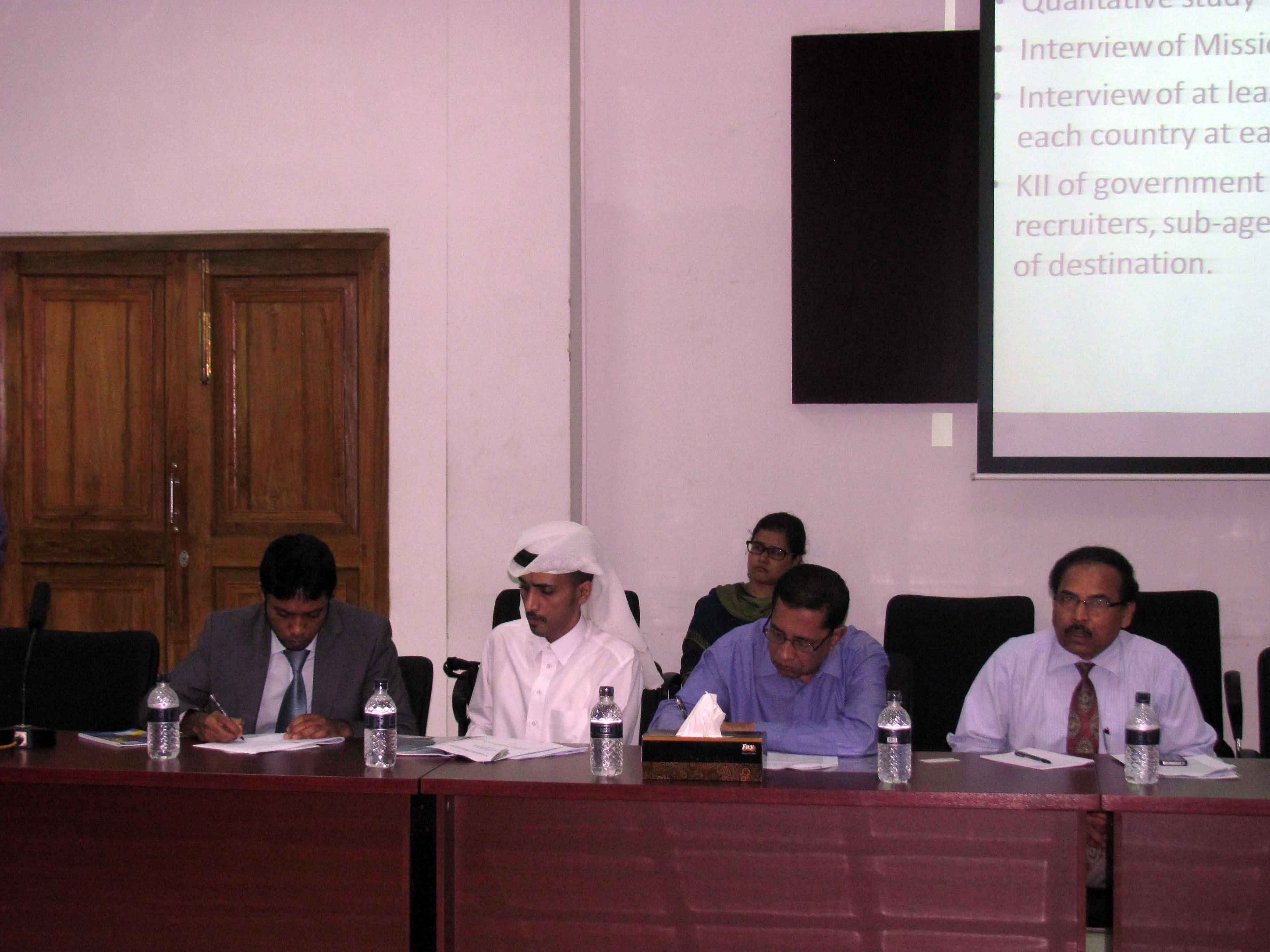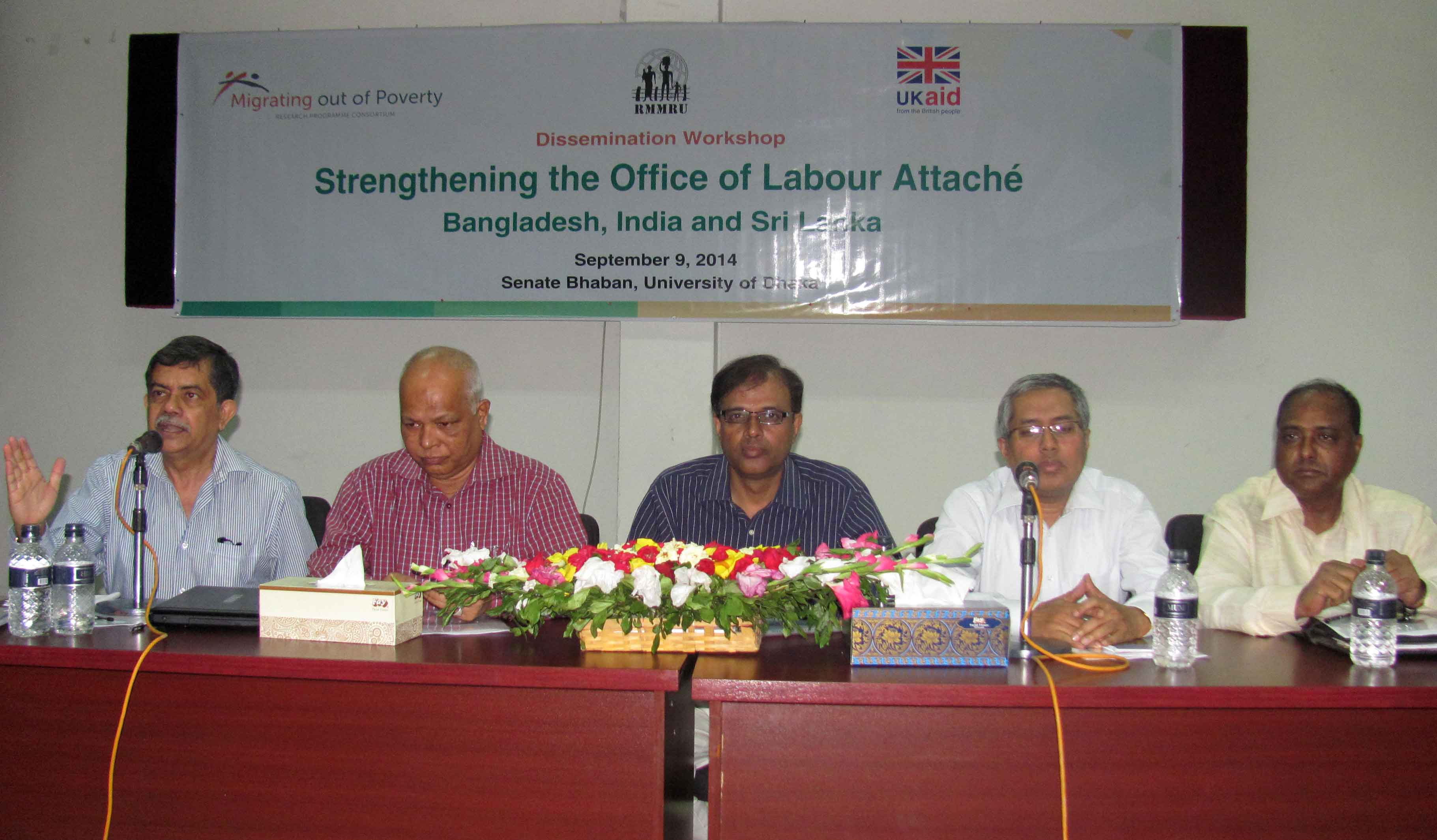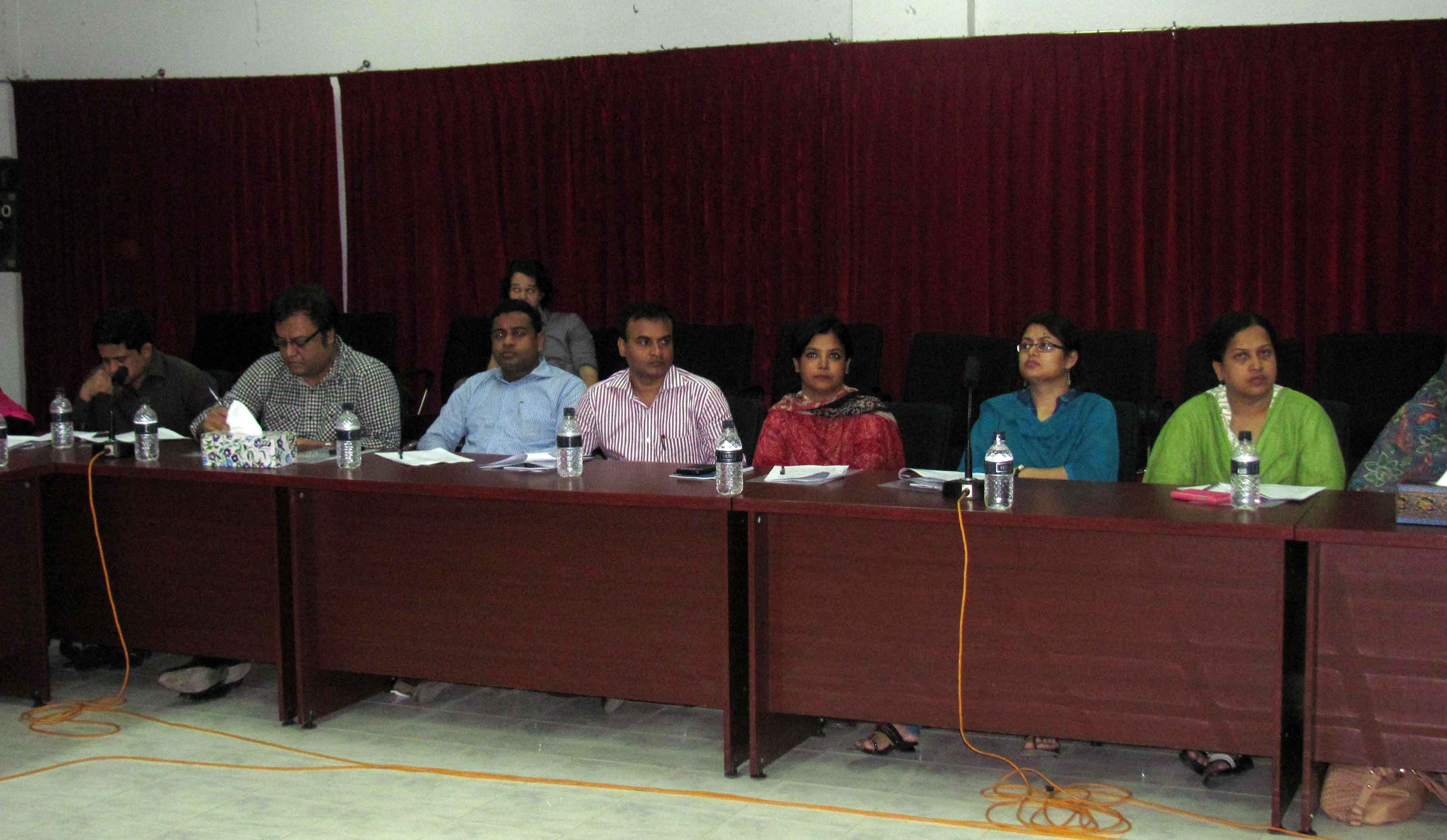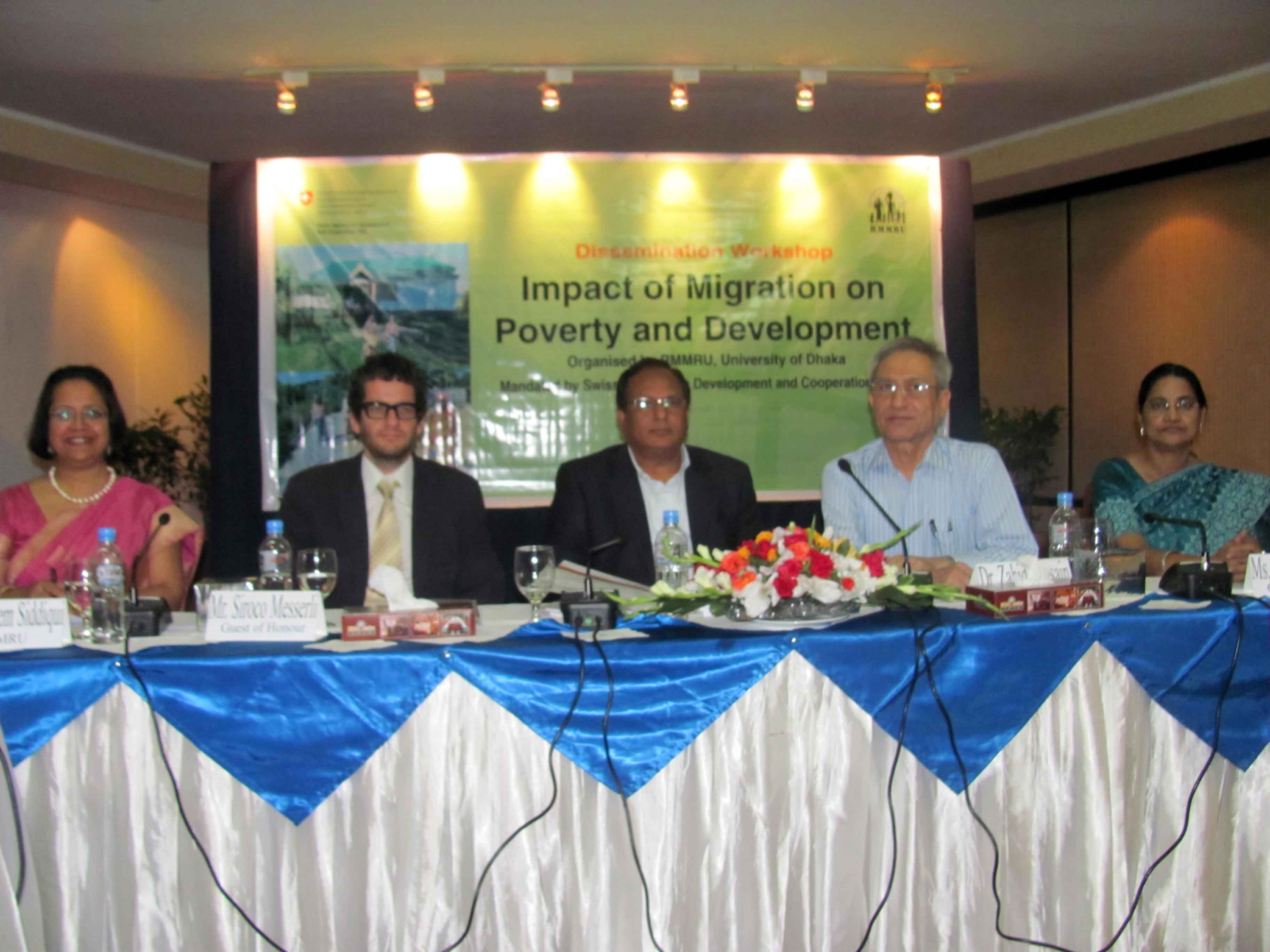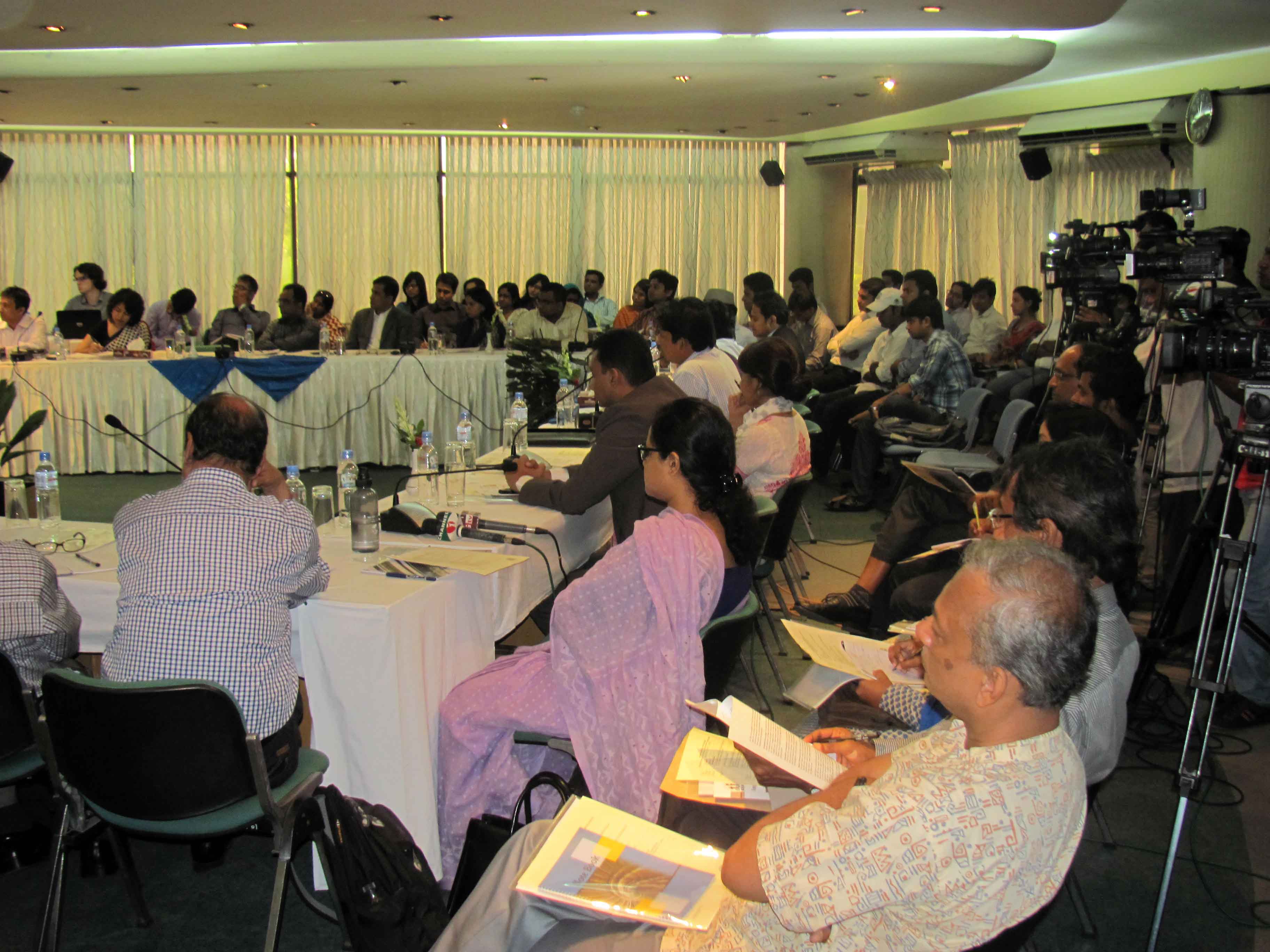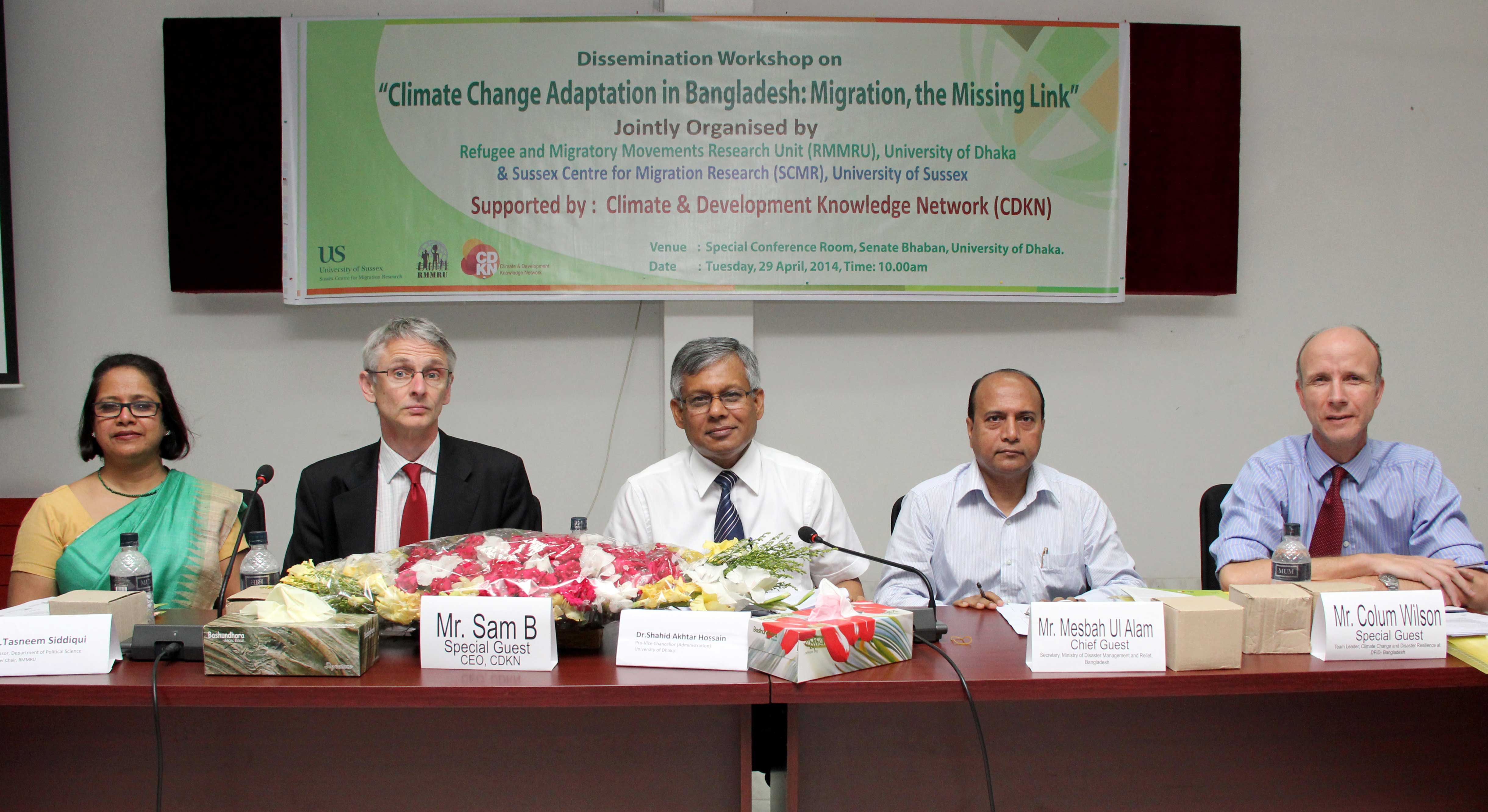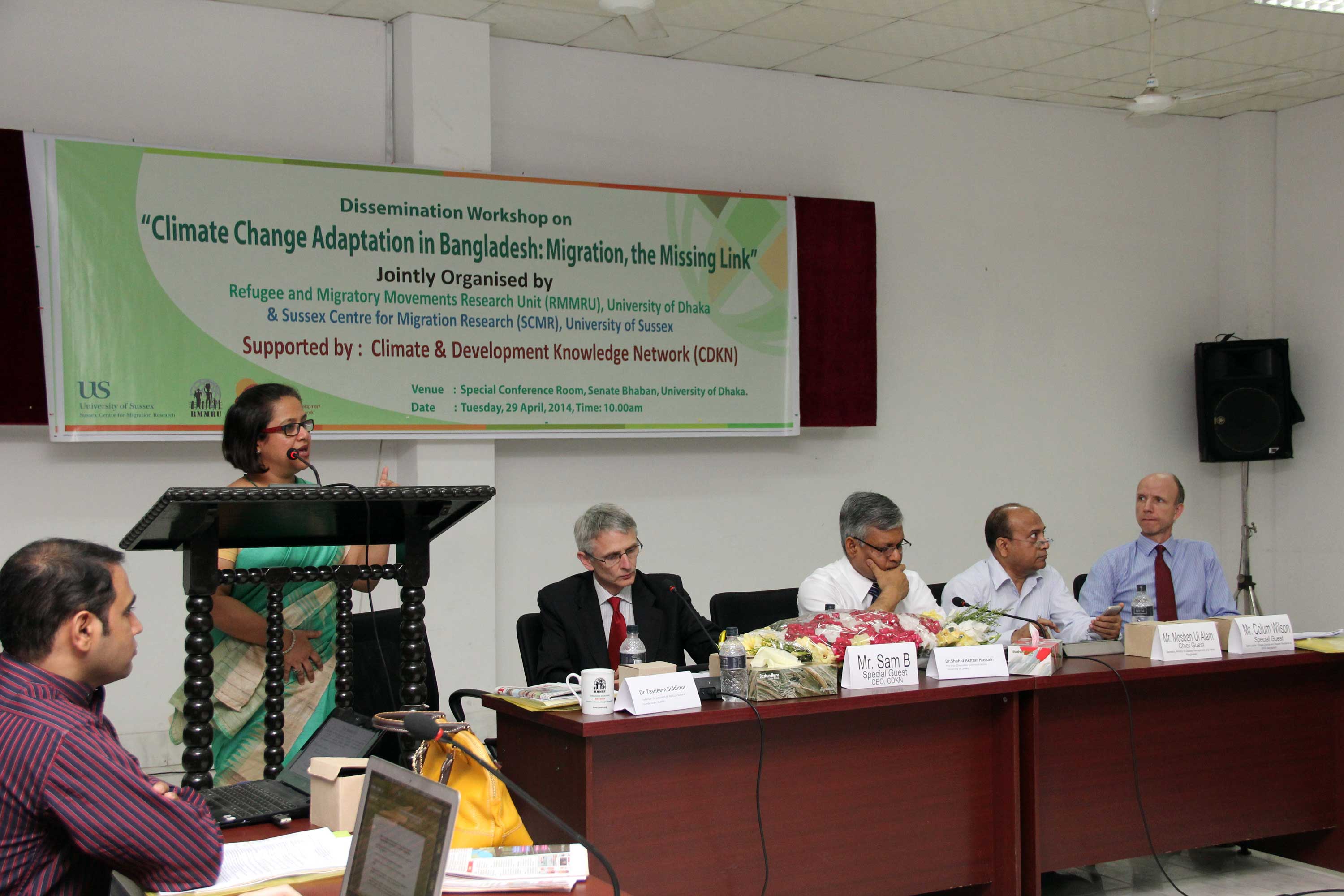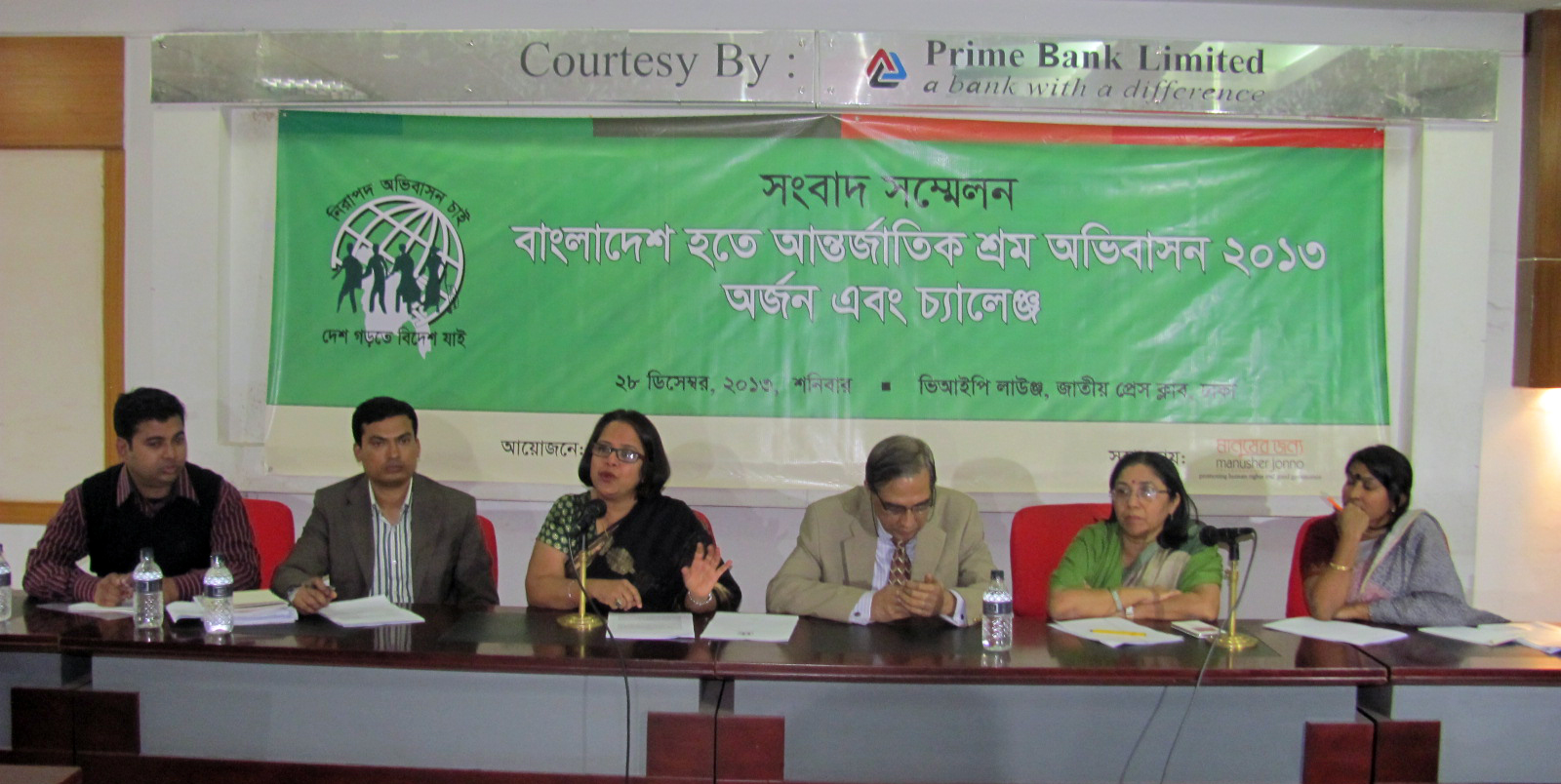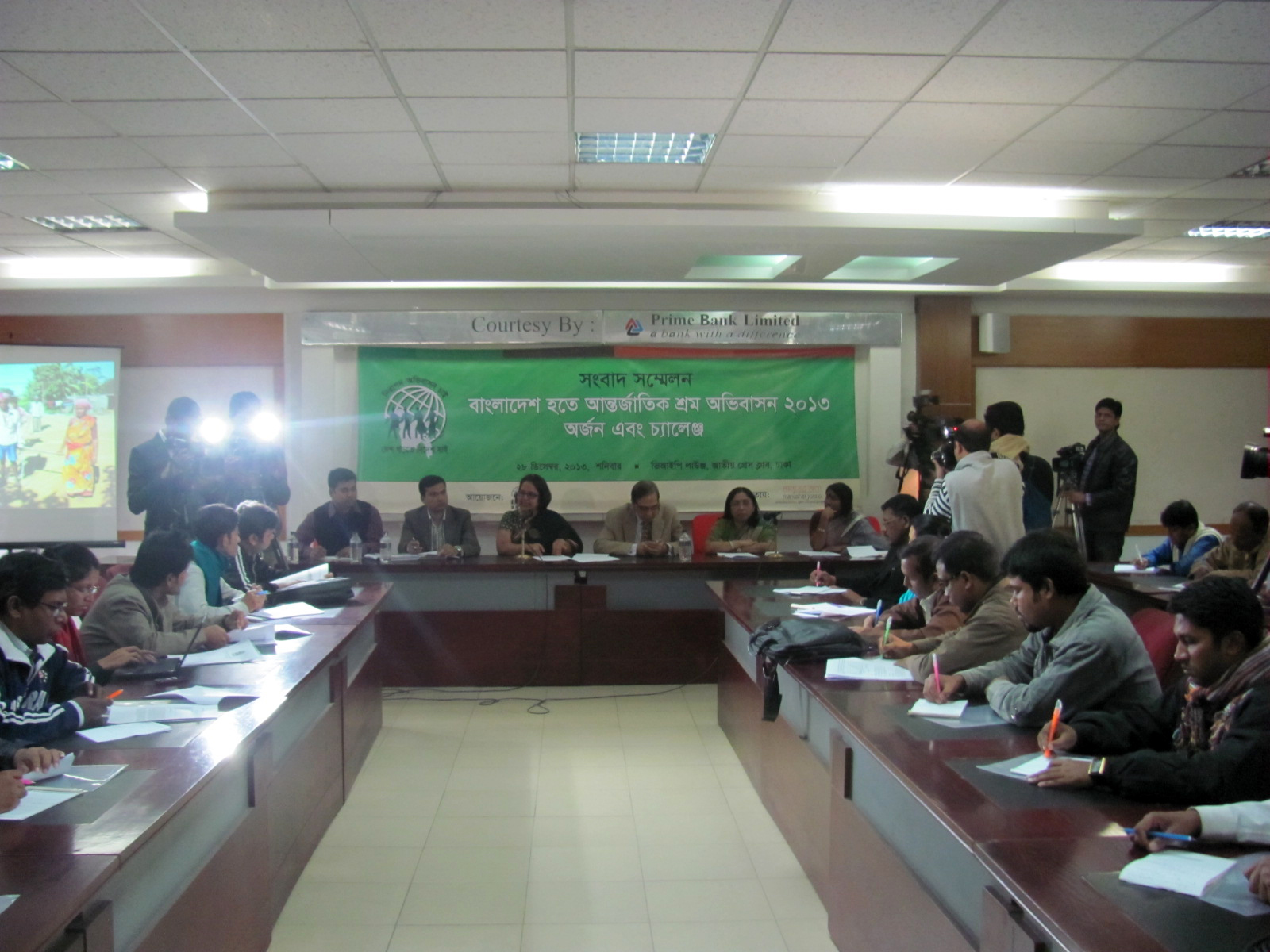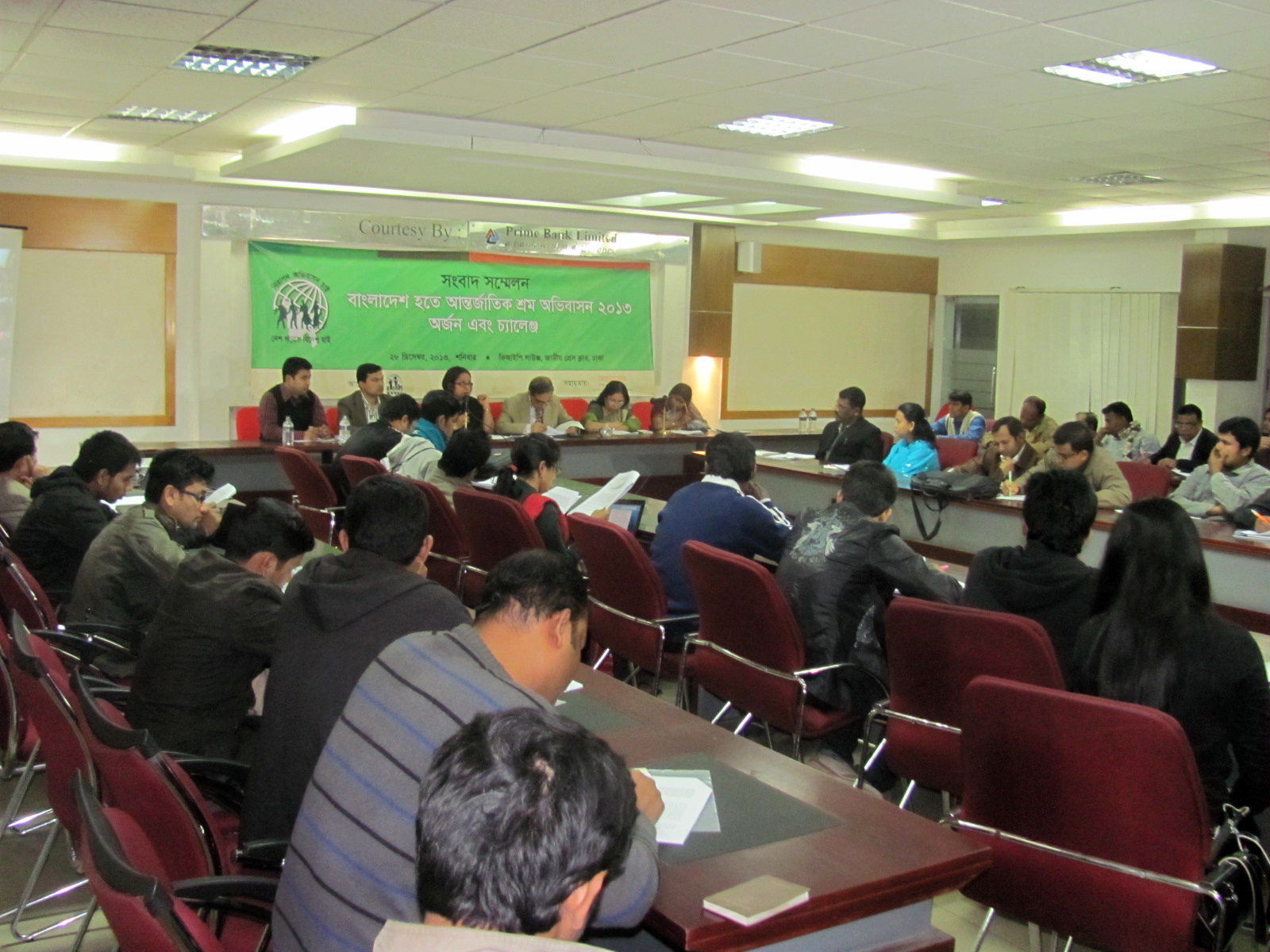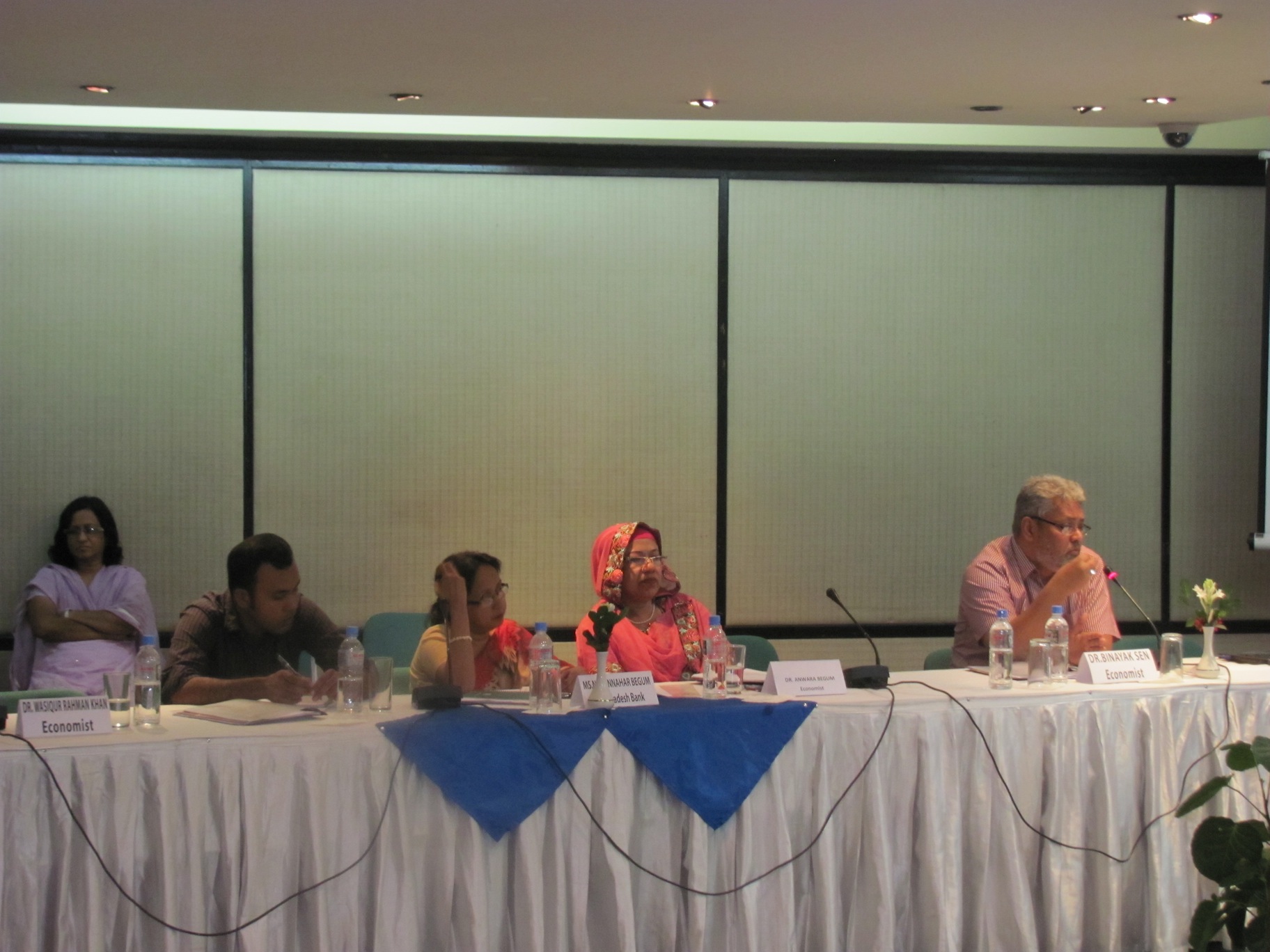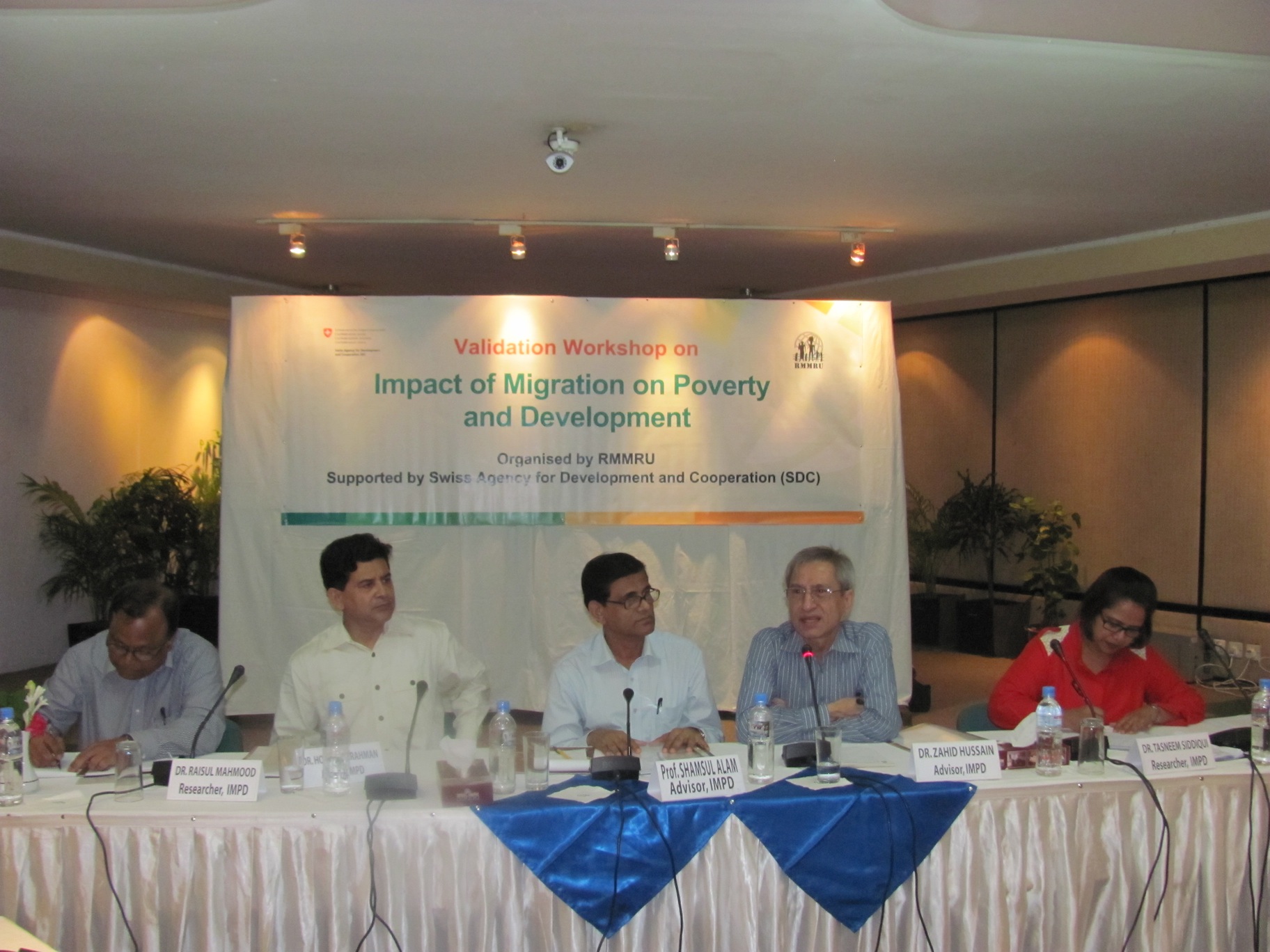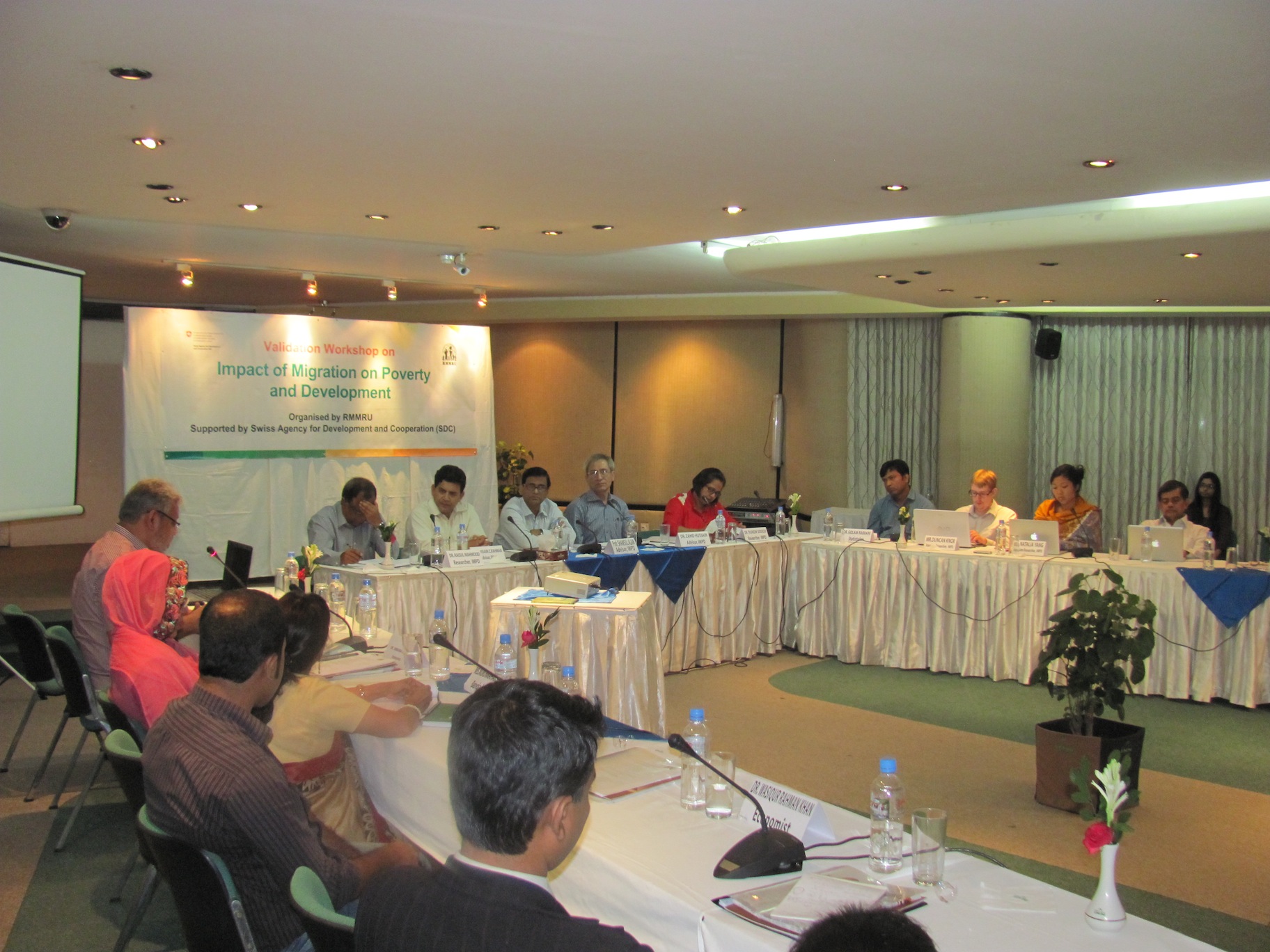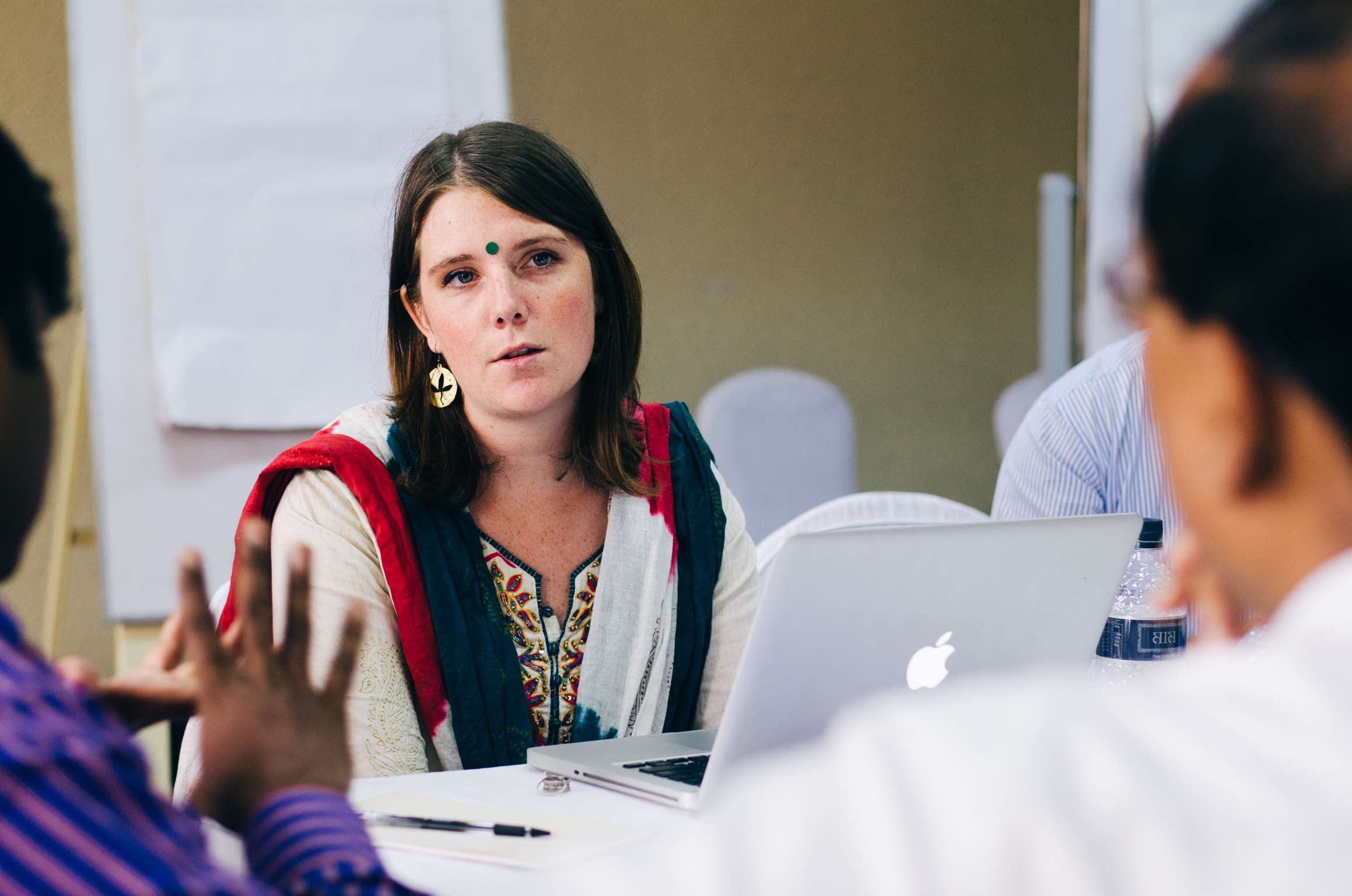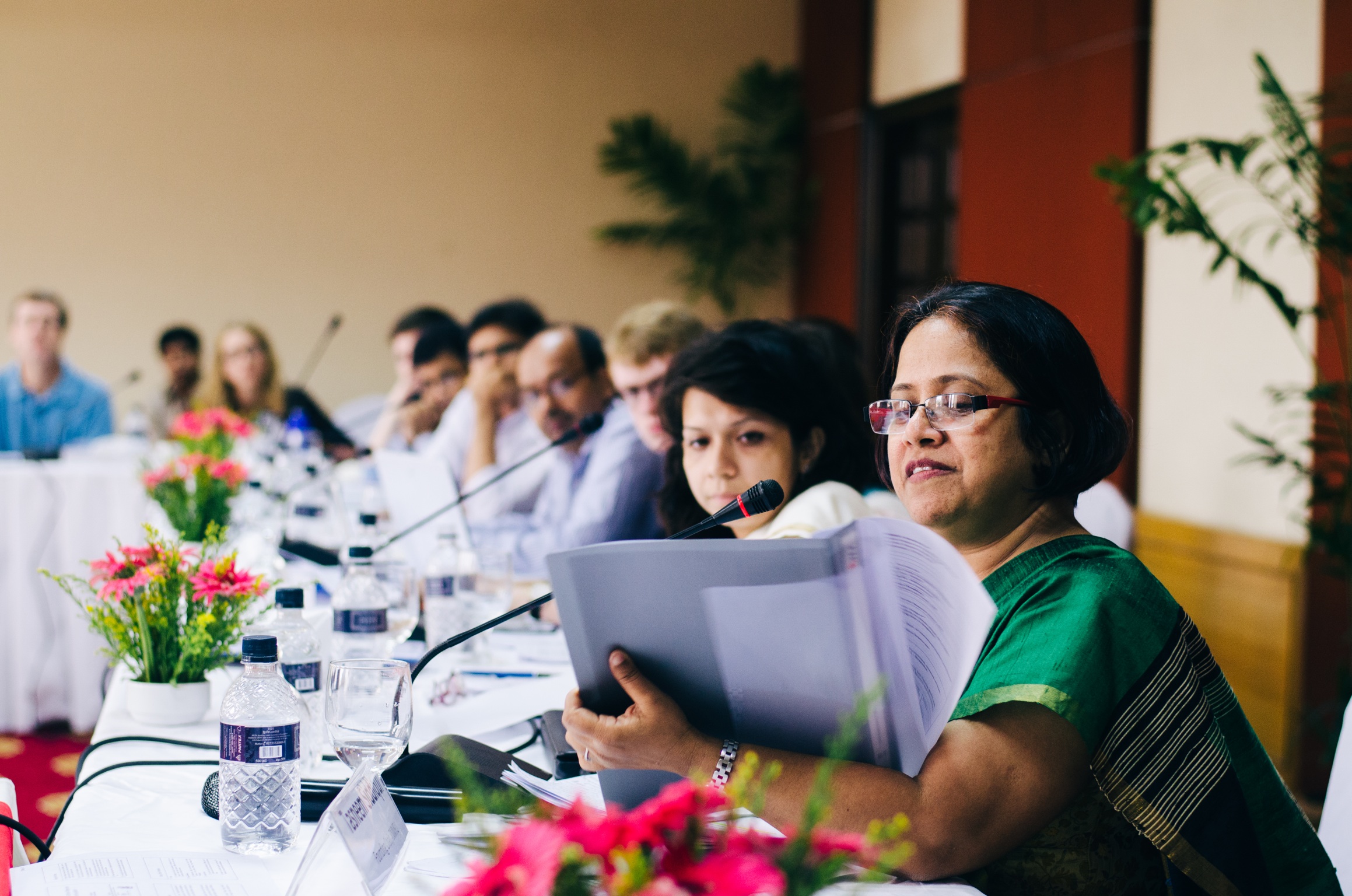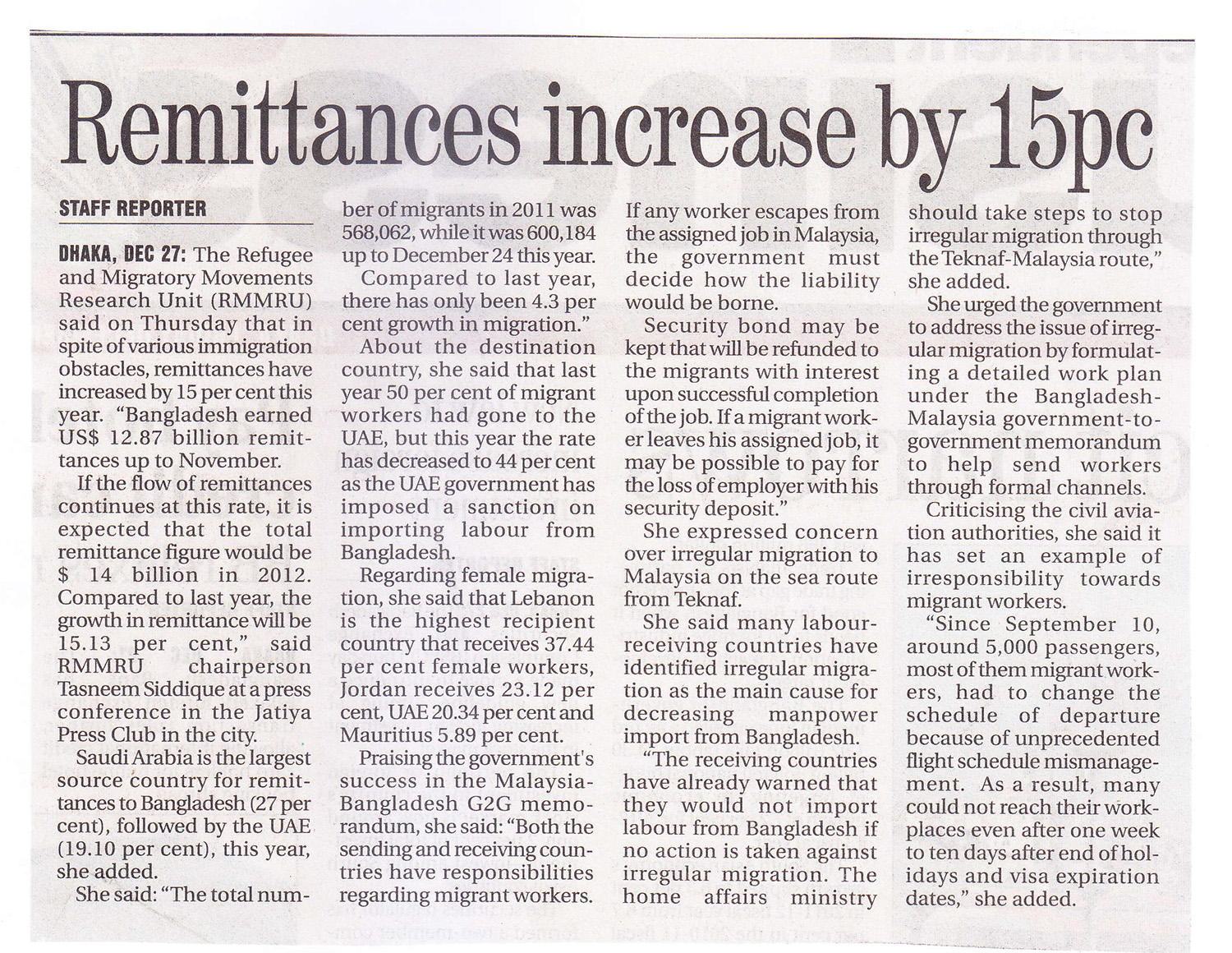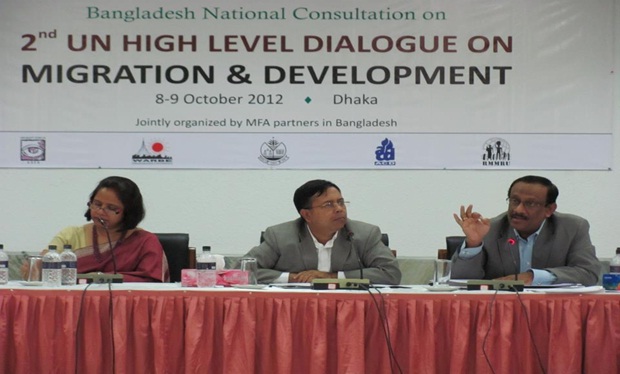Organized by: Refugee and Migratory Movements Research Unit (RMMRU)
Date: 24 January 2017
Venue: Senate Bhaban, University of Dhaka
Supported by: PROKAS Programme, British Council
After the introduction by the Chair, the participants viewed the photos of migrants that were exhibited. After the session resumed the editor of the volume Professor Tasneem Siddiqui, Founding Chair, RMMRU, introduced the contents highlighting negative and positive experiences of 150 migrants as narrated in the book. Their stories reiterate that migration is an extremely complex phenomenon, and that there is no single narrative of migrants. The stories have been collected by RMMRU over a period of 20 years.
The next section of the programme involved reading selected sections of the book. In one narrative a woman working in Kuwait learned how to care for her invalid employer, was treated well and now owns a tailoring shop; another woman who went to the UAE, prospered, and now wants to help “hapless widows”; another woman who went abroad, learned Hindi, married off her sisters and felt proud that she could provide for the family as the eldest daughter; and some other tales of success and failure.
In offering her thoughts Professor Perween Hasan observed that the stories were humane and touching. She was amazed to learn how little were the needs of the migrants and wondered why adequate support could not be provided to them. Professor Fakrul Alam stated that although Indian writers have been publishing on experiences of Indian diaspora for a long time, some winning prestigious awards, there was a palpable absence of stories of Bangladeshi migrants. This book is the first publication in that regard. He said the stories captured in the book have literary value. He recommended that other works like this should mix longer narratives on migrants’ life experiences with the shorter narratives present in the book, including those of Bangladeshi diaspora. Mr. Selim Reza felt that the stories have immense value for policy makers. Mr. Harding mentioned about the need for ‘collective action’ and ‘keeping the momentum’ alive in order to solve the problems of migrants. Justice Refaat Ahmed termed the stories as invaluable documentation. He said he would treat the volume as ‘case law’.
The Chief Guest State Minister Alam congratulated RMMRU and the editor for undertaking such important task. He commented that “it aptly captured the great achievements of our migrants and at the same time the pains and agonies they and their families endure… Some of the statements of the migrants reflect their true perceptions about migration and their analysis in loss and gain by economic as well as social indicators”. He said the book should be the first volume of a series of many. The Chief Guest reiterated that the Government is trying its best to streamline labour migration from Bangladesh by negotiating with host countries to make life better for migrants and looking for new labour markets. The State Minister further mentioned that the Government has recently enacted the ‘Overseas Employment and Migrants Act 2013’, and is also working hard to reduce transaction costs for sending remittances. He informed that recent bilateral negotiations will create opportunity for some 500,000-700,000 Bangladeshi migrants to be employed this year in Malaysia. The Government will be able to cut off the intermediaries (middlemen) by introducing an online visa system. He stated that the migrants should not change jobs without authorization. He also stated that over 100,000 Bangladeshi migrants are currently working illegally in Malaysia who will get temporary 2 year work passes as part of a deal between the two countries. These migrants will be able to return to Malaysia, legally, for more work once they have returned home too. The State Minister further observed that it is foolish to pay BDT 500,000 to a middleman to migrate. He also reassured that the Government is “keeping a close eye on violations of migrants’ rights in Oman and Qatar”, he said.
All the speakers acknowledged the role of migration in reducing poverty. They felt that the book is an invaluable collection to inform readers about the diverse experiences that migrants face. It will also be an important source for the policy makers to gain insights to develop practical policies. Among others, 150 academicians, researchers, government officials, members of civil society and migrants attended the ceremony. It got a huge coverage in electronic and print media. Below please find the media links:
The Daily Financial Express The Daily Prothom-alo The Daily Star The Daily New age The Daily Sun The Daily Kaler Kantho Sheersha khobor Arthosuchak The Daily Manab Jamin Amader orthoneeti The Daily Jugantor The Daily Amader Shomoy Share news The Daily Sokaler Khobor Boishakhi News The Daily Songbad Protidi The Daily Inqilab The Daily Janakantha BBarta24 To Day Sangbad The Daily Independent The Daily Bhorer Dak The Daily Asian Age bdnews24.com
Organized by: Refugee and Migratory Movements Research Unit (RMMRU)
Date: Wednesday, 28 December 2016
Venue: VIP Lounge, National Press Club, Dhaka
Supported by: Manusher Jonno Foundation
In the lead up to the Global Forum on Migration and Development (GFMD) 2016 is being hosted by the Government of Bangladesh in December 2016, Bangladesh Civil Society Coordination Committee for GFMD 2016 (BCSCC) has been organising year-long programmes all over the country before the big event in December. To further take forward the ongoing efforts of the BCSCC, in association with Jagrata Juba Shangha (JJS) the Refugee and Migratory Movements Research Unit (RMMRU) organised a district level consultation on Challenges and Prospects of Labour Migration from Satkhira was held on 30 November 2016 (Wednesday) from 10:00 am to 02:00 pm at Conference Room of Deputy Commissioner (DC) Office, Satkhira in which Mr. Abul Kashem Md. Mohiuddin, Honourable Deputy Commissioner (DC) of Satkhira discussed as the Chief Guest. Arun Kumar Mandal, Additional Deputy Commissioner (Taxation); MD. Abdul Majid, Survey Officer of DEMO; MD. Zahurul Alam, Assistant Director of Youth Development Department; Abdus Sabur Biswas, Executive Director of Agragati Sangstha; Madhav Chandra Dutta of SODESH; Professor Abdul Hamid, Rtrd. The principal of Satkhira Government College discussed as the designated speakers.
Through a comprehensive discussion the following points were stressed as recommendation:
- The concerned department of the government should take appropriate measures to transfer the knowledge to community about the regular system of migration;
- The victimised migrants should be provided with legal aid support in case of any fraudulence and victimisation;
- Government offices should provide ample services to the root level in order to prohibit irregular migration;
- The Embassies of Bangladesh deployed in different countries must be pro-active and capacitated in solving problems of the Migrants in the destinations;
Organized By: RMMRU and SKS Foundation
Venue: SKS Inn, Gaibandha
Date: 22 November 2016
Ms. Mahbub Ara Begum Gini, MP said, “13% of the national budget of Bangladesh comes from the remittance earned by migrants. But still, they are experiencing difficulties and problems. The government has been providing skill training in different trades for departing migrants which are yet to be well recognized in the global labour market. We will work to improve the governance in migration.”
Catherin Cecil of PROKAS said, “We are here to get the better ideas for safer and fairer migration from Gaibandha. As we have heard, migration is a complex issue this consultation can help us to envisage recommendations to be submitted to the concerned authority.”
The returnee migrants and their families from different places of Gaibandha attended the consultation and shared their experiences.
Dr. C R Abrar wrapped up the discussion by saying that the lack of available information for regular migration creates a scope of fraudulences by dalals.
The following recommendations are made in the consultation:
- The aspirant migrants should keep proper evidences in case of giving money to dalals;
- The police and other concerned authority should take appropriate measures to reduce fraudulences in migration;
- Concerned department should expand the Information flow towards community regarding migration;
- Departing and aspirants migrants should receive skill training and take part in the briefing session of BMET.
Javed Ahmed, Additional Secretary told that the law was passed in 2013, but an adequate number of prosecutions for violations of the provisions of the said law is not taking place. “We need an awareness campaign to inform the affected parties. While there is a lot of fraudulence, victims are often worried about pursuing legal action because they fear it will keep them from going abroad” he said.
Dr. Shahdeen Malik said ‘It has taken 25 years to finalise the draft of the Code of Criminal Procedure. Therefore, once prosecution begins under the 2013 migration law we will be able to find its shortcomings. Then the law should be amended accordingly.’ Deputy Chief of MoEWOE K M Ali Reza added that currently four rules are being framed under the Migration Act 2013. If minor changes are required, that can be done through incorporating them into the rules.
Tasneem Siddiqui said, “Poor financial background, intimidation and threats by vested quarters, and a lack of knowledge about laws and rights are working as barriers in ensuring prosecution under the law.”
Among others, Catherin Cecil, Team Leader of British Council’s PROKAS Programme, Hassan Imam of BRAC, Sumaiya Islam of BOMSA and Shakirul Islam of OKUP spoke on the occasion. It has attended by a number of lawyers representing Dhaka, Madaripur and Tangail Bar Association.
Organised By: RMMRU and DDP
Venue: Conference Room, D C Office, Sirajgonj
Date: 8 November 2016
Mohammad Abdul Mannan, DEMO
Md. Shariful Islam
Through a comprehensive discussion the following recommendations were made:
- The recruiting agencies and the middlemen must share the job contract with the departing migrants before leaveing the country of origin;
- The aspirant migrants should keep proper evidences if they give advance money to the middlemen (dalals) for migration;
- The Bangladesh’s country missions deployed in different countries should take appropriate measures to protect the Bangladeshi nationals working in respective destinations;
- The concerned authority should bring the middlemen those who are involved with fraudulence under prosecutions.
Supported By: Migrant Forum in Asia (MFA)
Organised By: RMMRU
Venue: CIRDAP Auditorium, Dhaka
Date: 2 June 2016
In order to meaningfully contribute to the Global Forum on Migration and Development (GFMD) 2016 recently the Bangladesh Civil Society Coordination Committee for GFMD 2016 (BCSCC) was launched in early 2016. As part of BCSCC’s year, long programme RMMRU in partnership with Manila based Migrant Forum in Asia (MFA) organised a Public Hearing on Economic and Social Costs of Migration on Thursday 2 June 2016 at the CIRDAP Auditorium, Dhaka.At the national level, Ministry of Expatriates’ Welfare and Overseas Employment (MoEWOE) and the recruiting agencies were urged to take appropriate measures to reduce economic and social costs of labour migration. Speakers including migrants rights activists, civil society leaders, journalists, returnee migrants and family members of the migrants raised demands in this public hearing on economic and social costs of migration.
Md. Shahidul Haque, foreign secretary of Bangladesh also the Chair of the upcoming GFMD 2016, expressed his deep concern about migration of Bangladeshi workers to war torn countries of Libya, Iraq and Syria. The foreign secretary underscored the need for concerted efforts of government and civil society to establish transparency and raise awareness about safe migration.
In his opening statement Dr. C R Abrar of Dhaka University informed that a recent KNOMAD study found that low-skilled migrants from Sri Lanka to Kuwait spent amount that was equivalent to only one month’s earning in Kuwait, while their Indian counterparts spent amount equivalent to 2.5 months but the Bangladeshi migrants were paying sums that accounted for as many as 9 months of income. He urged for appropriate policy measures that recognised the role played by sub-agents. Dr.Tasneem Siddiqui as the Chair of the session stated that migrants endured a lot of economic and social costs that are not always acknowledged.
45 migrants and members of their families provided testimonies on the costs they incurred for migrating. From 2013 to till 2016 the highest cost paid by the migrants is in case of Saudi Arabia whichwas Tk. 1.2 million. On an average each paid Tk. 350,000 to go to Middle Eastern countries.
Additional Secretary of the MoEWOE Mr. Jabed Ahmed requested the migrants to directly come to BMET with complains and also to file cases under Migration Act 2013. Deputy Chief of the Expatriates’ ministry Dr. Rahnuma Salam Khan highlighted that financial cost of migration should not only include initial cost that are accrued during departure, it should also take into account the cost of return and other unforeseen costs that migrants bear in the countries of destination.
Among others, Joint Secretary Mr. Kazi Abul Kalam, head of BOESL, representatives of BMET and representing the apex body of recruiting agencies-BAIRA Mr. Shameem Ahmed Chowdhury Noman participated in the discussion.
News Coverage
The Daily Star The Daily Newage The Daily Prothom Alo The Daily Bonik Barta The Migration News bd The Daily Newage Voice of America
Organised By: RMMRU
Venue: CIRDAP Auditorium, Dhaka
Date: 7 May 2016
- Continue the process of discussion among various stakeholders on the implications of the draft citizenship law.
- Raise awareness through giving coverage to the event in the media.
- Provide opportunities to various groups including camp dwelling Urdu speaking community, enclave dwellers, Bangladesh diaspora members and others to share their view on the law.
A total of 76 participants attended the consultation including RMMRU team headed by Dr. C R Abrar, prominent jurists and lawyers, representatives of UNHCR, representatives of human rights organizations, representatives of minority groups, members of the media and university students. The panel of discussants included veteran freedom fighter and health activist Dr. Zafrullah Chowdhury, former Minister of State for Foreign Affairs Mr. Abul Hasnat Chowdhury, Nick Oakesshott of regional office of UNHCR based in Bangkok, rights activist and head of Bangladesh Legal Aid and Services Trust Advocate Sara Hossain, women’s activist Ms. Shireen Haque, migrant rights activist Syed Saiful Haque of WARBE and Advocate Rezaul Karim.
Dr. C R Abrar of RMMRU and Mr. Nick Oakeshott from UNHCR made the keynote presentations. Dr. C R Abrar highlighted the non-participatory approach followed by the government in drafting the law. Based on the proceedings of the earlier round of the Consultation he narrated how various provisions of the law may adversely impact on different groups of citizens and the likelihood of statelessness it may create. Mr. Oakeshott mainly highlighted how bad laws can increase situations of statelessness and how provisions of international laws like CEDAW and Convention on Rights of Child can help to prevent such occurrence.
After a series of discussion on section-by-section of law, the following points were highlighted.
- There is a danger of the law to be passed by the parliament with little or no revision.
- The status of Bangladeshi expatriates and their children is going to be compromised by the application of the provisions of this law.
- This law is likely to impact adversely on those enclave residents who did not register at due time.
- There is a likelihood of rescinding the citizenship status of the camp dwelling Urdu speaking community that was previously reaffirmed by 2008 High Court verdict.
- The law will bar children born of a Rohingya parent and a Bangladeshi parent securing Bangladeshi citizenship.
- Several provisions of the draft law appear to be contravening the Constitution of Bangladesh and are discriminatory in nature.
- Children with no paternal identity, of rape victims and adopted children will face major problems in securing citizenship.
- Vague provisions of the law have created the scope for it to be subjectively interpreted and used against political dissidents.
- There is an urgent need to have further discussion on the law in various public forums to influence the parliamentary standing committees on law and home affairs.
News Coverage
Supported By: Domestic Workers’ Rights Network (DWRN)
Organised By: RMMRU
Venue: CIRDAP Auditorium, Dhaka
Date: 25 April 2016
The Refugee and Migratory Movements Research Unit (RMMRU) organized a dissemination workshop to present its findings of the recent study titled “Public Policy Formulation: A Case Study of Domestic Workers in Bangladesh”.The workshop was held on 25 April, 2016 at the CIRDAP auditorium. It was jointly organised by RMMRU and Domestic Workers’ Rights Network (DWRN). The study was conducted under the auspices of Migrating out of Poverty Research Programme Consortium (RPC), University of Sussex, UK and funded by UK aid from the UK Government. Headed by Dr. ASM Ali Ashraf, the study team comprised of Ms. Fhamida Yasmin, Mr. Noor Mohammad Sarker and Ms. Tanzia Hosain.
On 21 December 2015 the Bangladesh Government approved the Domestic Workers Protection and Welfare Policy (DWPWP) 2015. This study employs the process tracing methodology to explore the evolution of DWPWP 2015. Drawing on elite interviews and document research, it identifies which stakeholders were involved in formulating the policy and what role they played in support or opposition of the policy. It then employs the 3-I framework to explain which institutions, ideas, and interests influenced the stakeholder positions.
The purpose of the dissemination Workshop was:
- To give an idea about the policy process
- To share the findings with the concerned stakeholders
- To inform everyone on the necessity of future steps to upheld the rights of domestic workers based on the new policy
In total 70 participants attended this dissemination workshop. Attendees represented the RMMRU research team, Domestic Workers’ Rights Network (DWRN) members, human rights organization members, independent researchers, domestic workers, member of parliament and media workers. Labour adviser to Bangladesh Employers’ Federation Kazi Saifuddin Ahmed said that rights of the domestic workers should be ensured by legal process which is absent in the country. Bangladesh Trade Union Kendra general secretary Wazedul Islam Khan said that domestic workers should be organised to ensure their rights. Bangladesh National Women Lawyers Association executive director Advocate Salma Ali said that the approved policy on the domestic workers should be utilised by the concerned authorities to help protect their rights. DWRN member Lutfar Nahar Lota expressing concern said that there were so many cases of oppressions, rapes and physical torture of domestic workers but there was no punishment in a single case. Dhaka University professor and RMMRU coordinator CR Abrar termed formulation of domestic workers’ policy was a milestone and said that there is a need to recognize the contribution of the domestic workers who were playing a major role in rearing and caring of children of many families. Bangladesh Institute of Labour Studies assistant executive director Syed Sultan Uddin Ahmed said that through approval of the policy the government has admitted the current context of the domestic workers. Mr. Israfil Alam, MP, Member of parliamentary standing committee on labour and employment ministry, who was chief guest at the workshop said that the government has adopted the policy for domestic workers in 2015 after a long drawn process of five years. In the light of the policy, a law will be presented in coming days.
The workshop suggested the following recommendations:
- Steps should be taken to improve skills of the domestic workers
- Government should incorporate domestic workers’ cases under the speedy court tribunal to stop their harassment.
- There is an urgent need to educate people about dignity of labour.
- In order to ensure their safety and privacy separate space for domestic workers is to be ensured in designing and constructing of buildings.
- There is the need to for raising public awareness about the conditions and rights of domestic workers.
- An action plan for stakeholders (government, NGOs, CSOs, and TUs) need to be developed for proper implementation of the policy
News Coverage
The Daily Newage The Daily Newage The Songbad Shomogro The Banglamail24 The Daily Amader Orthoneeti The Sramikawaz The Daily Dhaka Tribune
Organised By: RMMRU
Venue: Bangladesh Institute of Law and International Affairs (BILIA) auditorium
Date: 27 March 2016
The Refugee and Migratory Movements Research Unit (RMMRU) organisedits first “Consultation on Draft Citizenship Bill 2016”.Recently the Cabinet has approved the Draft Citizenship Law 2016 and the matter is under the consideration of the Parliament. In view of a concern that the draft law contains provisions that are of grave consequences for different groups of the citizens and may also lead to a situation of statelessness RMMRU organised a Consultation of Lawyers at the Bangladesh Institute of Law and International Affairs (BILIA) auditorium on 27 March 2016.
The purpose of the consultation as follows:
- Conduct a scrutiny of various provisions of the draft bill.
- Secure input fromlawyers and eminent jurists.
- To identify areas of the bill that requires revision.
A total 80 participants attended the consultation including RMMRU team headed by Dr. C R Abrar, members of BILIA, prominent jurists and lawyers, representatives from UNHCR, representatives from minorities, media and university students. The panels of law experts consisting of Dr. Shahdeen Malik, Mr. Z I Khan Panna, Prof. Asif Nazrul, and Advocate. Asaduzzaman shared their insights.
After a thorough discussions the following points were highlighted:
- The bill needs to be more inclusionary.
- There is a need for transparency in framing the law.
- The bill has major ramifications for various groups of citizens particularly those having dual nationality and those who are born outside Bangladesh.
- The terms like ‘anti-Bangladeshi activity’, ‘allegiance to state other than Bangladesh’ are too vague.
- Concerns were also expressed about the proposed law would impact on the camp dwelling Urdu speaking people, on children born of mixed Rohingya and Bangladeshi parentage and those who have not been registered during enclave swapping.
News Coverage
The Daily Newage
Supported By: Bangladesh Institute of Labour Studies (BILS)
Organized By: RMMRU
Venue: CIRDAP Auditorium, Dhaka
Date: 3 March 2016
The Refugee and Migratory Movements Research Unit (RMMRU) shared the findings of the research “Recruitment of Domestic Construction Sector Workers in Bangladesh” under the Research Programme Consortium on Migrating out of Poverty based at the University of Sussex, UK and supported by the DFID, UK. The study aimed to understand the dynamics ofinternal migration of construction workers. The research team members were CR Abrar, Mirza Taslima Sultana, Kazi Nurmohammad Hossainul Huq, Priya Desingkar and Md. Selim Reza. The field work was conducted at Dhaka and Chapainawabganj during May-July 2015.The dissemination workshop took place at CIRDAP Auditorium, Dhaka on Thursday, 3 March 2016. It was organised by RMMRU in partnership with Bangladesh Institute of Labour Studies (BILS).
The principal objectives of the study were:
- Understanding the dynamics of recruitment process of construction workers in Bangladesh,
- Finding out why the employers prefer to engage intermediaries in recruitment of workers and
- Finding out why the migrant workers utilize the services of intermediaries to access employment.
The workshop was attended by a number of construction workers and contractors sharing their life experiences. A total number of 80 participants those from the trade unions, builders, human rights experts, government officials and young researchers attended the workshop.
Presiding over the workshop, noted human rights activist and academic Dr. Hameeda Hossain said that huge numbers of internal migrant workers were now getting employed in the construction and shipbuilding sectors in Bangladesh.Public health activist and freedom fighter Zafrullah Chowdhury said that the government has no interest to ensure workplace safety and job security to the construction workers. Advocate Jafar Uddin Sharif said that as per law of the land construction sector is one of the formal sectors in Bangladesh. BILS assistant executive director Syed Sultan Uddin Ahmed said that construction sector is one of the risky avenues for employment and it should be ensured that workers get appointment letters before joining the workplace.
Momtazul Karim Khan, Executive director at Mir Akhter Hossain Limited, a construction company, said that concerned government authorities should emphasize on providing skills training to the construction workers.
The following points were highlighted in the open discussion:
- Construction workers should have access to healthcare facilities suitable for them
- Government should ensure the workers get adequate and fair compensation in accidents or deaths
- Before appointment, the workers should be registered with labour inspection department
- The workers are denied appointment letters due to unclear recruitment process in this sector
- Construction workers are easily swayed by middlemen to agree to take on the low-paying job so as to ensure cash flow for their families.This is why employers find attractive the existing recruitment system of working with middlemen.
- The existence of the intermediaries in labour recruitment however is not legally acknowledged. This enables the intermediaries to work outside the purview of the state capacity to monitor.
- Construction workers are neither paid the official minimum wage, nor overtime, and never get any weekends.
- The sector and its workers are one of the least monitored in Bangladesh.
News Coverage
The Daily Newage The Daily Financial Express The Sramikawaz The Daily Bonikbarta The Daily Amader Shomoy The Daily Dhaka Tribune The Migration News BD The Daily Bonik Barta
Supported By: BUET
Organized By: RMMRU
Venue: Nawab Ali Chowdhury Senate Bhaban, University of Dhaka
Date: 24 February 2016
Organised By: RMMRU
Supported By: UKAid
Date: 31 January 2016
Supported By: Manusher Jonno Foundation
Organized By: RMMRU
Date: 27 December 2015
Venue: VIP Lounge, National Press Club, Dhaka
In the Press Conference, The Refugee and Migratory Movements Research Unit (RMMRU) revealed its Annual Migration Trends Report titled ‘Labour Migration from Bangladesh 2015: Achievements and Challenges' on 27 December 2015. Authors: Dr. Tasneem Siddiqui, Ansaruddin Anas, Md. Abul Basar and Tabitha Black-Lock. Dr. Tasneem Siddiqui, chair of the organization, presented the report before the journalists attended. In the report RMMRU highlights the increasing flow of labour migration, remittances, female migration and expressed its concern over irregular migration through maritime rout in the Bay of Bengal. The report also examined the performances of the service providing agencies in connection to migration governance.
Print Media Coverage
The Daily Newage The Daily Star The Daily Prothom Alo The Daily Financial Express The Daily Naya Diganta The Daily JayJaydin The Daily kalerkantho The Daily New Nation The Daily Observer The Daily Arthosuchak The Daily Manob Jomin The Daily Bonik Barta The Daily Sangram The Daily Sangbad
Online Media Coverage
Banglanews24 Migration News bd Prothom24.com Thereport24.com bdview24.com RTNN sbd24.com
Electronic Eedia
Bangla Vision, Desh Tv, Etv, Gtv, Maasranga Tv, Ntv, Somoy Tv
Date: 18 December 2015
Venue: Bangabandhu International Conference Center (BICC)
Supported By: BUET
Organized By: RMMRU
Date: 8 December 2015
The objectives of the pre-test were:
i. To assess the effectiveness of the questionnaire in collecting information on migration and adaptation.
ii. To explore different issues related to sending survey questionnaire e.g., length of the interview, flow of logic, wording of the questionnaire, logistics issues etc.
iii. To produce a report on the questionnaire to assist northern team to modify the final questionnaire for sending household survey.
A total of twelve households were interviewed during the pre-test survey. Among the households, 9 were migrant households and 3 were non-migrant households. The survey was conducted applying the instruction provided by the Northern team to assess the questionnaire and identify potential issues. From each household, the team interviewed two persons – one with the household head and another adult of opposite sex (except one household where the household head was migrant and no other adult family members). Altogether, the team interviewed 23 people(12 female and 1 male).
After the survey, a detailed report on the questionnaire was prepared and sent to the Northern team to assist them to produce the final questionnaire. The report contained the issues encountered by field facilitators during the interviews. Among the issues, personality related questions, adaptation related questions and length of the survey were of major concerns. The average time of the survey varied from two and half hours to three hours. The report compiled every single comment made by the field facilitators to help the Northern team to enlighten the actual scenario of the pre-test.
Organized By: RMMRU
Supported By: Manusher Jonno Foundation
Venue: BGMEA Complex, Karwan Bazar, Dhaka
Date: 10 October, 2015.
Launching of Online Information Portal (www.returneemigrant.info) of Returnee Migrant Workers of Bangladesh has been organized on 10th of October 2015 at BGMEA Complex, Karwan Bazar, Dhaka. With a key presentation on the said portal Dr. Tasneem Siddiqui, Professor in Political Science and Chair, RMMRU of University of Dhaka facilitated the programme while Mr. Khandkar Md. Iftekhar Haider, Secretary to the Ministry of Expatriates’ Welfare and Overseas Employment (MoEWOE) formally launched the portal as the Chief Guest and Mr. Faruque Hassan, Senior Vice President of BGMEA graced the occasion as the Guest of Honor. Rabeya Basri, the Senior Assistant Secretary of MoEWOE, Mr. Akil Akter Chowdhury, Managing Director of Shuchana Development Ltd. Mr. Salim Chowdhury, Managing Director of G4S discussed among others including officials from BKMEA, security companies, developer companies, NGOs and returnee migrants.
The information portal is developed with the financial support of Manusher Jonno Foundation (MJF) under Asserting Migrants’ Rights (AMR) project of RMMRU. Based on a research on returnee migrant workers, RMMRU gathered the information of skilled and semi-skilled returnee migrants’ information from its project areas and placed them online.
Organized By: Comprehensive Disaster Management Programme (CDMP II) and RMMRU
Supported By: United Nation Development Programme (UNDP)
Venue: Disaster Management and Relief Bhaban, Mohakhali, Dhaka.
Date: 20 August 2015
RMMRU has recently drafted a National Strategy on the Management of Disaster and Climate-induced Internal Displacement (NSMDCIID). A RMMRU-study team consisting of Dr. Tasneem Siddiqui, Mohammad Towheedul Islam and Zohra Akhter has prepared the Draft National Strategy under the auspices of the Comprehensive Disaster Management Programme (CDMP II)/UNDP. The study team chalked out detailed strategic responses to deal with displacement in three distinctive phases – (i) pre-displacement, (ii) displacement and (iii) post-displacement. This Strategy, however, does not cover the entire spectrum of migration rather solely focuses on internal displacement caused by climatic hazards. The Draft Strategy was presented to Mr. Md. Shah Kamal, Secretary, Ministry of Disaster Management and Relief (MoDMR)in the National Validation Workshop organized by CDMP-II on 20 August 2015 at the Disaster Management and Relief Bhaban, Mohakhali Dhaka.The participants at the workshop appreciated the comprehensiveness of the Strategy and the right-based approach that the document followed in order to protect the rights of the most venerable social groups including women. RMMRU will soon finialise the Strategy to enable CDMP-II to launch its campaign for the adoption of the Strategy by the Government of Bangladesh.
Organized By: RMMRU
Supported By: Manusher Jonno Foundation (MJF)
Venue: BRAC Center, 75, Mohakhali, Dhaka
Date: 27 June, 2015.
Organized By: RMMRU and BILS
Supported By: RPC on Migrating out of Poverty, University of Sussex
Venue: National Press Club, Dhaka
Date: 07 May, 2015.
Organised By: RMMRU and DWRN
Supported By: RPC on Migrating out of Poverty, University of Sussex
Venue: National Press Club, Dhaka
Date: 19 April 2015
Supported By: MJF
Organized By: RMMRU
Date: 28 December 2014
Venue: National Press Club
• 411,000 Bangladeshi workers migrated to work abroad in 2014;
• female labour migration now accounts for an all time high of 18% of Bangladesh's total number of international migrants;
• overseas employment of Bangladeshi workers was 1% higher than in 2013 but there were 32% less jobs overseas than there were in 2012;
• remittance inflows - estimated at 14.93 billion US$ - were 5% above their 2013 levels;
• the new Overseas Employment and Migrants Act contains inconsistencies and loopholes.
Day Celebration: International Migrants Day 2014
18 December 2013
BICC
Organized by: RMMRU, University of Dhaka
Supported By: Manusher Jonno Foundation
Venue: Special Conference Room, Senate Bhaban, University of Dhaka.
Date: Monday, 17 November, 2014
Time: 10:00 am – 2:00 pm
As an issue of high national importance the dialogue was covered by different media. Below the links for different newspapers are given:
RMMRU has conducted two training-workshops titled ‘Ensuring Prosecution under Overseas Employment and Migration Law 2013’ with practicing lawyers from different districts BAR Association, legal aid providing organizations, representatives of NGOs and District Empowerment and Manpower Office (DEMO). Two training-workshops have been organized at CIRDAP Auditorium in Dhaka and BURO Bangladesh in Chittagong on 25th of October 2014 and 5th September 2015 respectively. At the first workshop 38 male and female attended from Dhaka, Barisal, Tangail, Comilla, B. Baria, Narayanganj, Madaripur comprising the aforesaid sectors took part in the workshop while Justice Dr. Syed Refaat Ahmed graced the programme as the chief guest. And at the 2nd workshop 24 male and female attended from Cox’s Bazar, Rangamti, Feni, Noakhali, Laxmipur, Chittagong, Madaripur of the said sectors while Mr. Munshi Md. Mosiar Rahman, Honorable Chief Judicial Magistrate of Chittagong spoke as the chief guest. Dr. Tasneem Siddiqui, Professor in Political Science and Founding Chair, RMMRU of University of Dhaka moderated the both training-workshops along with some law and migration expert including Dr. Jakir Hossain, Professor in Law of Chittagong University and Kazi Abul Kalam, Deputy Secretary to the Ministry of Expatriates’ Welfare and Overseas Employment.Workshops discussed the different aspects of the Overseas Employment and Migration Law 2013 and facilitated some working sessions to demonstrate the process of execution under Migration law for the protection of migrant workers in different cases.The names and contact number of lawyers those who have participated in the workshop are given below with their consent in case of any legal support is required:
| Name of Bar Association/ Legal Aid Providing Organization | Name and contact of Lawyers |
| Chittagong Bar Association | Mr. Mohammad Junaid Lawyer Mobile: 01814985912 Email: Junaislaw.cu49@gmail.com
|
Mr. Md. Delwar Hossain Advocate Mobile: 01819173226 Email: m.delwar2021@gmail.com
| |
| Noakhali Judge’s Court | Mr. Avijit Shil Advocate Mobile: 01718930201 Email: avijitshil@gmail.com
|
Mr. Md. Morshed Alam Advocate Mobile: 01819920468 Email: nipuadvocate@gmail.com
| |
Mr. Rabiul Hasan Palash Advocate Mobile: 01934272234
| |
| Laxmipur Bar Association | Mr. Milon Mondal Advocate Mobile: 01713620212 Email: milon399@gmail.com
|
Mr. Md. Mahabubul Karim Advocate Mobile: 01718063617 Email: upakulkantah@gmail.com
| |
Mr. Probir Mitra Deb Nath Advocate Mobile: 01818700545
| |
| Feni Bar Association | Mr. Md. Farid Uddin Khan Advocate and General Secretary Mobile: 01711121842 Email: rajufeni@gmail.com
|
Mr. Md. Kamrul Islam Advocate Email: kamrulislam25@yahoo.com
| |
Mr. Jahangir Alam Nantu Advocate Mobile: 01711447359 Email: shdf.bd@gmail.com
| |
| Cox’s Bazar Bar Association | Mr. Mynul Islam Advocate Mobile: 01816070756 Email: lipu.cu.law@gmail.com
|
| Rangamati Bar Association | Mr. Hla Thowai Prue Marma Advocate and General Secretary Mobile: 01819621591z Email: kong@gmail.com
|
Madaripur Legal Aid Association
| Mr. Md. Mosiur Rahman Monitoring Coordinator Mobile: 01716830799 Email: Mosiurparvez@gmail.com
|
Bangladesh Legal Aid Services Trust (BLAST)
| Mr. Rezaul Karim Chowdhury Advocate and coordinator Mobile: 0181720875 Email: adu_rza@yahoo.com
|
Mr. Nijam Uddin Researcher Mobile: 01722989302 Email: nijamlaw@gmail.com | |
Dhaka Bar Association | Mr. Md. Shahid Gazi Advocate Mobile: 01712622509 |
Ms. Nasrin Begum Advocate Mobile: 01935293959 | |
Ms. Monira Begum Moni Advocate and Executive Committee member Mobile: 01712876377 Email: advocatemonira@hotmail.com | |
Barisal Bar Association | Mr. Mirza Md. Riaz Hossen Advocate Mobile: 01716276899 |
Mr. Zahidul Islam Panna Advocate Mobile: 01717368366 | |
Mr. Zahid Hossain Liton Advocate Mobile: 01716010206 | |
Tangail Bar Association | Mr. Anisur Rahman Anis Advocate Mobile: 01716208603 |
Mr. Abdul Khalek Advocate Executive Committee member Mobile: 01712342304 | |
Comilla Bar Association | Mr. A T M Shawkot Hossain Advocate Mobile: 01717186826 |
Mr. Md. Amir Hossain Khan Advocate Mobile: 01710816854
| |
B. Baria District Bar Association | Mr. Md. Shafiqur Rahman Bablu Advocate Mobile: 01712029003 |
Mr. K M Shafiqur Rahman Advocate Mobile: 01199160409 | |
Ms. Yeasmin Begum Advocate Mobile: 01715688680 | |
Narayanganj District Bar Association | Mr. Md. Sohel Miah Advocate Mobile: 01712175176 |
Mr. Ashraful Alam Siraji Advocate Mobile: 01720267238 | |
Mr. Mohammad Ali Advocate Mobile: 01911302824 | |
National Legal Aid Services Organization | Mr. Md. Nur-A-Alam Deputy Director (NLASO) Mobile: 01711731466 Email: tryforjustice@gmail.com |
Mr. Md. Sadakin Habib Bappy Senior Assistant Judge Mobile: 01717865875 Email: sadakinlaw@gmail.com | |
Bangladesh Institute of Labour Studies | Ms. Sultana Mahaboba Advocate Mobile: 01552305670 |
Mr. Nazrul Islam Advocacy officer Email: bils@citech.net | |
Madaripur Legal Aid Association | Mr. Mosiur Rahman Parvez Senior Assistant Coordinator Email: 01716830799 |
Bangladesh Legal Aid Services Trust (BLAST) | Ms. Mehbuba Jui Advocate, Bangladesh Supreme Court Mobile: 01798405181 Email: mehbuba.jui@gmail.com
|
Ain o Salish Kendra (ASK) | Mr. Ataullah Nurul Kabir Lawyer Mobile: 01722968837 |
Mr. Md. Mahabub Alam Investigation Officer Advocate, Dhaka Bar Association Mobile: 01927559677 | |
Bangladesh National Women Lawyer Association | Ms. Fahmida Akhter Case Manager Email: fahmida.akther@gmail.com |
Ms. Ferdous Nigar Programme Officer (Legal) Email: fnigar2006@yahoo.com |
Organized by: RMMRU, University of Dhaka
Venue: Senate Bhaban, University of Dhaka
Date: 09 September, 2014
The purpose of the study was to recommend measures for strengthening the offices of labour attaches located in the countries of destination for better protection of migrant workers.
In total 65 participants attended this dissemination workshop. Attendees consisted of the RMMRU Research team, Deputy Secretary and Senior Assistant Secretaries of the Ministry of Expatriates Welfare and Employment, Ministry of Labour and Employment, Bureau of Manpower Employment and Training (BMET), Bangladesh Institute of Labour Studies, Bangladesh Institute of Development Studies, Expatriates’ Welfare Bank, Wage Earners Welfare Board, Action Aid, International Organization of Migration, human rights activists, civil society representatives, academicians and researcher on labour migration field and media personalities from leading print and electronic media in Bangladesh.
There is a general reluctance of the Gulf States to participate in such programmes. In that context the attendance of two representatives of the Qatar Embassy in Bangladesh was the high point of the event. RMMRU considers this to be a landmark in engagement with at least one of the countries of destination.
The other important feature of the event was the participation of the eight newly recruited Labour Attachés who are waiting for their overseas posting. Mr. Hazrat Ali, Additional Secretary of the Ministry of Expatriates Welfare and Employment, who was the Chief Guest, stated that the officers needed to bring about change in their mindset if they are to provide services to migrants who are contributing to the economy. Addressing the newly recruited LAs the Chief Guest said, “I am sure this 2 and a half-hour long dissemination workshop was of no less importance for you to learn about your role than the month-long pre-deployment training that you had undergone”.
The event got high importance on the national dailies and here are few links-
Dhaka Tribune
NEW AGE
The Financial Express
The Daily Star
The RMMRU Dissemination Workshop on “The Impact of Migration on Poverty and Development” was held on the 31st August, 2014, at the BRAC Centre INN in Dhaka. The Dissemination workshop was organized by the Refugee and Migratory Movements Research Unit (RMMRU), of the University of Dhaka and supported by the Swiss Agency for Development and Cooperation (SDC).The focus of the research project was the collection of household survey data, which covered 5000 international and internal, male and female, migrant and non-migrant households. The purpose of the survey was to allow RMMRU to gather rigorous quantitative evidence with a view to understanding international short term contract migration that takes place in Bangladesh.
The major findings of “The Impact of Migration on Poverty and Development” project are:
- International migration plays a significant role in reducing poverty. Both male and female migrants contributed to the reduction f household level poverty, but the scale of impact differs.
- In comparison to internal and non-migrants, international migrants contributed more to local level development through investment, consumption and community development work.
- International migration created employment for local non-migrants.
- The benefits of international migration were distributed among non-international migrant producing areas through creation of employment for seasonal migrants in international migrant sending areas.
About hundred guests attended the Dissemination Workshop. Dr. Khondaker Showkat Hossain (Secretary Expatriates’ Welfare and Overseas Employment of GoB) and Dr. Hossain Zillur Rahman (Former Advisor Caretaker Government of GoB) graced the occasion as Chief Guests. They both appreciated the findings and gave valuable comments. Dr. Shamsul Alam (Member, Planning Commission), Dr. Mahabub Hossain (Executive Director, BRAC), Dr. Zahid Hussain (Lead Economics, World Bank), Ms. Nazneen Sultana (Deputy Governer, Bangladesh Bank), Mr. Riaz Hamidullah (Director General, Economic Affairs, Ministry of Foreign Affairs) and Mr. Siroco Messerli (Deputy Head of Coopertaion, SDC) kindly consented to be the Guests of Honour. Professor Mustafizur Rahman (Executive Director, CPD), Dr. Binayak Sen (Research Director, BIDS), Mr. Dilder Hossain (Project Director, BBS) and Dr. Dipankar Roy (Project Director, BBS) participated in the workshop as panel discussants.
Researchers at a workshop on climate change related migration in Bangladesh projected that 16 to 26 million people would migrate internally from areas of origin due to floods, storm surges, riverbank erosion and sea level rise between 2011 and 2050. The projection was based on historical analysis of upazila level census data of 2001 and 2011. They highlighted that households which integrated local level adaptation with livelihood migration of a few member of the family could ensure better income and adapt better to climatic stresses. On the other hand, a section of affected people who attempted to adapt through local level livelihoods trapped themselves into occasional and chronic poverty. Dr. Tasneem Siddiqui in her keynote paper recommended that government, development partners and CSOs should avoid treating migration as failure of adaptation. She called for reframing of government policies such as NAPA, BCCSAP, DRR, Coastal Management etc. to accommodate livelihood migration as one of the adaptation tools.
The research was conducted by RMMRU of the University of Dhaka and SCMR of the University of Sussex and was supported by the Climate and Development Knowledge Network (CDKN). The half day dissemination workshop was held at the University’s Senate Bhaban on 29 April, 2014.
Mr. Mesbah Ul Alam, Secretary, Ministry of Disaster Management and Relief, Government of Bangladesh in his address as Chief Guest appreciated the findings and committed to incorporate the findings in the upcoming DRR policy of Bangladesh. Mr. Colum Wilson, Team Leader, Climate Change and Disaster Resilience at DFID-Bangladesh and Mr. Sam B, CEO of the CDKN graced the occasion as Special Guests. Dr. Shahid Akhtar Hossain, Pro-VC, University of Dhaka chaired the inaugural session.
Mr. M. A. Hannan, Additional Secretary, MoEF, Dr. Aparup Chowdhury, Additional Secretary of MOEF, Dr. A.S.M Maksud Kamal, Ms. Ottilie Mooshofer, Principal Advisor and Climate Change Coordinator of GIZ, Professor A. Q. M. Mahbub of Unviersity of Dhaka, Dr. Asaduzzaman, Economist, Ms. Veena Khaleque of Practical Action – Bangladesh and Mr. Sanjib Kumar Saha of CDMP participated as panel discussants.
SEMINAR ON ‘THEORISING STATE CRIME: IT’s APPLICABILITY IN BANGLADESH’
Organized By: The Department of Political Science and the Young Researchers’ Forum of the University of Dhaka
18 February 2014
Speakers underscored that the future of democracy relies on the capacity of people to control crimes committed by the State. The observation was made at a seminar on ‘Theorising State Crime: It’s Applicability in Bangladesh’, organized by the Department of Political Science and the Young Researchers’ Forum of the University of Dhaka. Rashaam Raiyan Chowdhury, a postgraduate student of the University of Melbourne, in her presentation stated that the emerging field of state crime in Criminology helps us to label extra-judicial acts, corruption, and crimes committed in collusion of state and corporate interests as crime. Deviant behavour of the state resulting in social injury and harm to people also constitutes state crime. Labeling of illegal acts of the state as crime in the long run, help build public opinion against the acts that harm people and thus have a deterring effect on the perpetrators. It will also help sustain democracy in its true spirit, she noted.
Drawing examples from different parts of the world, Chowdhury showed while the action of Saddam regime against the Kurdish people constituted state crime at the national level, the US committed state crimes by flagrantly violating UN Charter and international human rights and humanitarian laws through waging illegal war against Iraq and torture of detainees in Guantanamo Bay and Abu Ghraib prison in Iraq at the international level.
In his address Prof. Ziaur Rahman, chair of the Department of Criminology of Dhaka University, underscored the need for theory based empirical research on state crimes in various country contexts. Faculty members and students of various departments offered various examples of deviant behaviour of the state within the state crime framework. The seminar was held on Tuesday, 18 February at the Department of Political Science of Dhaka University.
Labour Migration of Bangladesh 2013: Achievements and Challenges, Press Conference
Supported By: MJFOrganized By: RMMRU28 December 2013Dhaka Prass Club
RMMRU TREND REPORT 2013 Bangla Download Click TO Download
News Coverage:
Country sees negative growth in remittance inflows: report
29 December 2013
NEW AGE
Manpower export drops by over 2 lakh, remittance by 3pc
29 December 2013
The Daily Star
Remittance and manpower export slide: RMMRU
29 December 2013
DHAKA TRIBUNE
Validation Workshop
Impact of Migration on Poverty and Development
Supported By: Swiss Agency for Development and Cooperation (SDC)
Organized By: RMMRU
22 October 2013
BRAC Centre Inn
RMMRU has launched its much anticipated survey to generate panel data on The Impact of Migration on Poverty and Development. The survey will cover both internal and international migration, from approximately 5000 male and female migrant and non-migrant households across sixteen districts, over a time span of ten years. The Swiss Agency for Development and Cooperation (SDC), Bangladesh is supporting us in conducting the first round of the survey.
On October 22, RMMRU organized a validation workshop to receive guidance and advice from the esteemed advisory group members, research experts and NGO representatives in establishing the research methodology. Main researchers for the project are Dr. Tasneem Siddiqui, Founding Chair of RMMRU, Dr. Raisul Mahmood, Senior Researcher at RMMRU and Professor Andy McKay of University of Sussex.
The research is guided by a high profile advisory group. Advisors are Dr. Hossain Zillur Rahman, Executive Chairman of PPRC and Former Advisor of the Caretaker government, Professor Shamsul Alam, Member of Planning Commission, Dr. Zafar Ahmed Khan, Secretary at the Ministry of Expatriate’s Welfare and Overseas Employment, and Dr. Zahid Hussain, Lead Economist of World Bank.
Important guests include Dr. Binayak Sen, Research Director of BIDS, Dr. Anwara Begum, Economist at BIDS, and Ms. Nurunnahar Begum, DGM, RD, of Bangladesh Bank.
News Coverage:
Skills dev of workers stressed to receive increased remittances
October 23, 2013
New Age BD
Stakeholder Consultant Meeting
Impact of Migration on Poverty: Construction Workers in Bangladesh
Migrating Out of Poverty- Research Programme Consortium
October 22, 2013
BRAC Centre Inn
RMMRU organized a stakeholder consultant meeting on October 22, 2013 to highlight the findings of regional migration research study Impact of Migration on Poverty: Construction Workers in Bangladesh. The regional study is part of a larger global migration project with RPC Migrating Out of Poverty in the University of Sussex.
Main researchers of the study are Dr. CR Abrar and Md. Selim Reza. The study was carried out between November and December 2012, through in-depth interviews in nine districts including Badda, Mirpur, Mohammadpur, and Nikunja.
The research findings identified that construction labourers face poor working conditions and receive little information about their labour rights. Chief guest, parliamentary standing committee on labour ministry chairman, Md Israfil Alam, said workplace inspection should be strengthened.
Media Coverage:
80 per cent construction workers are at risk: study
October 24, 2013
New Age BD
3 Day Orientation Training Workshop
Migrating Out of Poverty
26 August to 28 August 2013
University of Dhaka
RMMRU organized a 3 day orientation training workshop for the Migrating Out of Poverty global survey. For the past few weeks, RMMRU interviewed university students around Dhaka to intern as research assistants for our regional survey on the impact of migration on households. The workshop merges migration knowledge with interactive role-playing, in order to prepare interns for real life situations they may find themselves in as research interviewers in rural districts of Bangladesh.
Migrating Out of Poverty is a program co-ordinated by Research Program Consortium (RPC) at the University of Sussex. Research is collected across six regions across Asia, Africa, and Europe, and RMMRU is a regional partner responsible for the Bangladesh region. Migrating Out of Poverty seeks to identify the integral links between internal and regional migration and poverty levels. To learn more about this global project, please click here.
Workshop on ‘New Knowledge on Climate Change and Migration in Bangladesh’
Where: Ruposhi Bangla Hotel
When: May 29th, 2013
The Refugee and Migratory Movements Research Unit (RMMRU), of the University of Dhaka, and the Sussex Centre for Migration Research (SCMR), of the University of Sussex, organized a workshop on “New Knowledge on Climate Change and Migration in Bangladesh” on Wednesday May 29th 2013 at Ruposhi Bangla Hotel in Dhaka, to share information regarding their recently completed qualitative segment of Climate Change and Migration in Bangladesh study. Among the key findings was a projection of 9.6 million long-term out migrants from regions affected by climatic hazards between 2011 and 2050. In her keynote paper, Dr. Tasneem Siddiqui, of RMMRU, revealed that displacement and short-term internal migration are the most sensitive migratory flows to climate change. Quantitative findings of the research shows that 75% of households surveyed face different types of environmental stresses in their dwellings in different periods of life, on average they relocated 3.19 times during their lifetime.
RMMRU’s study recommended that along with local level adaptation programs, both internal and international labour migration should be seen as one of the adaptation strategies to cope with climate change. Currently the government of Bangladesh lacks concrete policies dealing with internal migration; thus, comprehensive policy needs to be developed to protect the rights of internal migrants.
After the findings were presented, several small group sessions were conducted and solutions to dealing with climate change in Bangladesh were discussed. RMMRU is currently developing a report outlining the solutions and findings synthesized and presented at the workshop. Below are some pictures from the event.
Media Coverage:
Workshop on Kafala System in the GCC Countries
- Event Date & Place: 26–27 February 2013 at Hotel Purbani International, Dhaka
- Short description of the Conference:RMMRU, with the support of Swiss Agency for Development and Cooperation (SDC), organised a workshop on the Kafala System in GCC Countries. The workshop was organized for government functionaries and civil society organizations to develop a better understanding of the kafala system and to help them incorporate key messages about the system in their pre-decision, pre-departure, and other training programmes. Lawyers and experts from Middle East conducted the workshop as resource persons. About forty participants representing government, civil society organisations, and the media took part in the workshop.
For more information check out the Workshop Report!
Pattern and Trends of Labour Migration 2012: Achievement and Challenge
- Event Date & Place27 December 2012 at VIP Lounge,National Press Club,Dhaka.
- Short description of the Conference:RMMRU Lunched its annual migration trend report 2012 in this press conference the reports says outward flow of migration increase 5% in 2012 remittance increased 16% over previous year growth of female migration above that male migration in this year . Signing now with Malaysia launching of Dhaka Principles on Migration with Dignity are also major achievement of this year. Shrinking labour market in the UAE, lack of access in Saudi Arabia market for quality of training in the TTC, use of wage earner, welfare fund in performing day to day activities of government are some of the major challenges of 2012 as identified by RMMRU.
The press conference was attained by 25 national prints and electronic media covered the issues as important news. 'The Oman Times' also covered the issues and BBC broadcasted RMMRU's report through interview. In the programme, RMMRU also rewarded local journalist to encourage their proactive role for reporting on migration issues.
Dhaka Consultation on the 2nd UN High Level Dialogue on Migration and Development
- Event Date & Place: October 8-9, 2012 CIRDAP Auditorium, Dhaka
- Short description of the Conference:The consultation brought together 40 representatives of migrants organizations, migrants rights advocates, members of the academia and women's organizations to discuss the UNHLD and proposals of CSOs for the UNHLD. The 2nd day consultation was divided into 5 sessions: The first session focused on understanding the 2nd UNHLD, why civil society needs to engage the UNHLD, what Civil Society has done so far to engage the 1st UNHLD in 2006 etc. The second session focused on the issues of undocumented/irregular migrants and the rights of undocumented migrants workers. It also discussed international laws that provide protection for undocumented/irregular migrants. The third session focused on the issues of stranded migrants from Bangladesh. The discussion provided an overview of the concept of stranded migrants and focused on case studies from Bangladesh. It also looked into the responses of the Bangladesh government and civil society organizations on the issue of stranded migrants from Bangladesh. The fourth session focused on Bangladeshi women migrants in Jordan, Lebanon and UAE serving in garments manufacturing and domestic workers. The fifth session focused on proposals and recommendations of civil society organizations in relation to the relevant topics discussed in relation to the UNHLD
Main Objectives:
- To bring together key migration and development organizations, networks, grassroots and community based organizations, migrant’s rights advocates, trade unions, representatives of the media and academia along with relevant government ministries to coordinate and jointly strategize efforts relating to the 2nd UN High Level Dialogue on Migration and Development in 2013.
- To update and help stakeholders understand the status and process of the 2nd UNHLD in 2013.
- To broaden consensus, strengthen position and advocacy agendas on migration and development.
- To come up with a civil society position paper on migration and development, highlighting the specific issues faced by migrant workers from Bangladesh.
International Migrants Day
- Event Date & Place 18 December 2012 at Bangabandhu International Conference Center (BICC),Dhaka.
- Short description of the Day: RMMRU jointly celebrated International Migrants Day (IMD) at national level with Ministry of Expatriate Welfare and Overseas Employment. We participated in a rally and different seminars. RMMRU was also awarded for our synthesis and distribution of relevant migration information and materials by the ministry. At the grassroots, RMMRU mobilized PNGOs and MRPCs to discuss migrants issues, distribute information, and celebrate successful migration.
